






Utilizing natural elements to balance water.
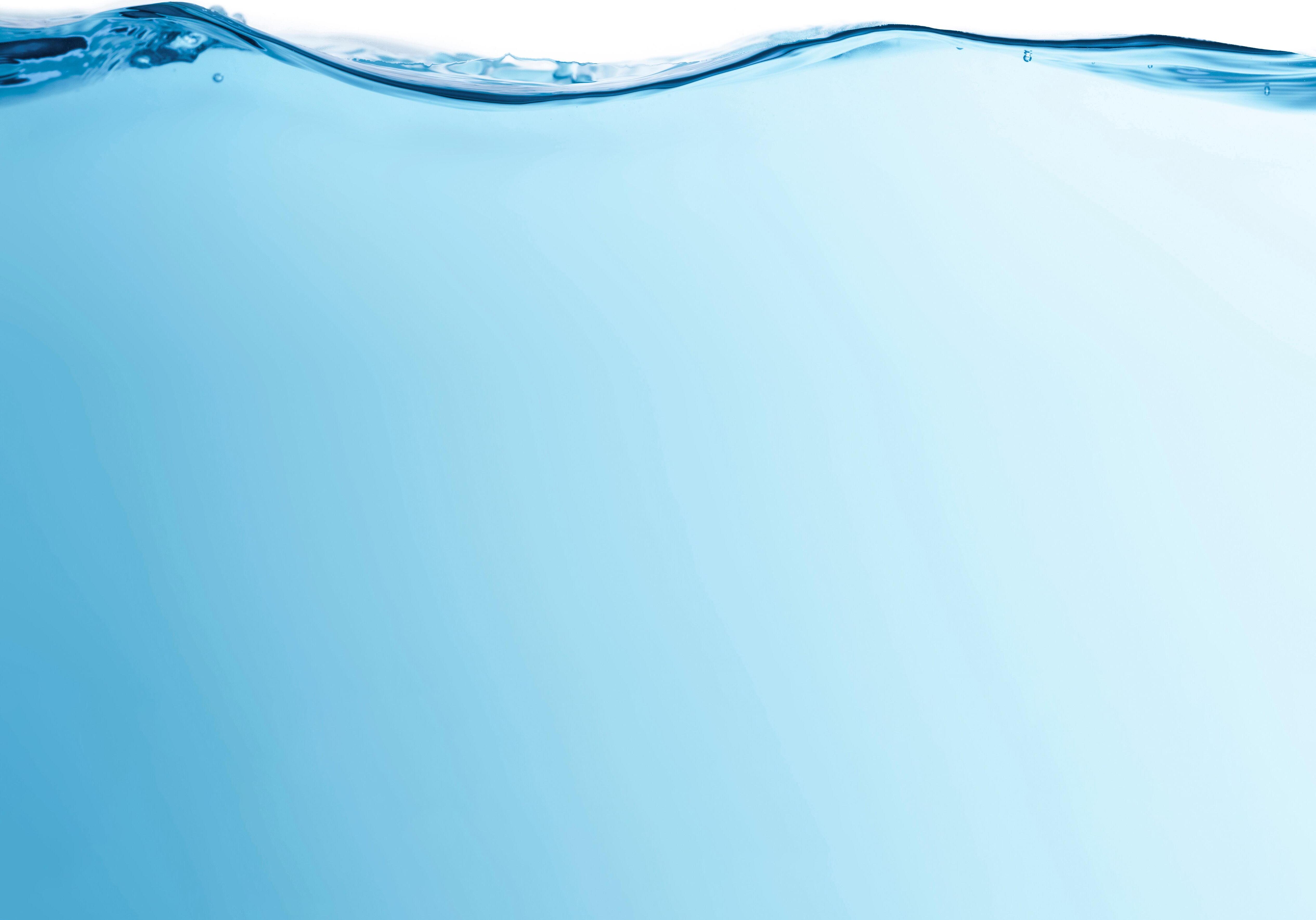
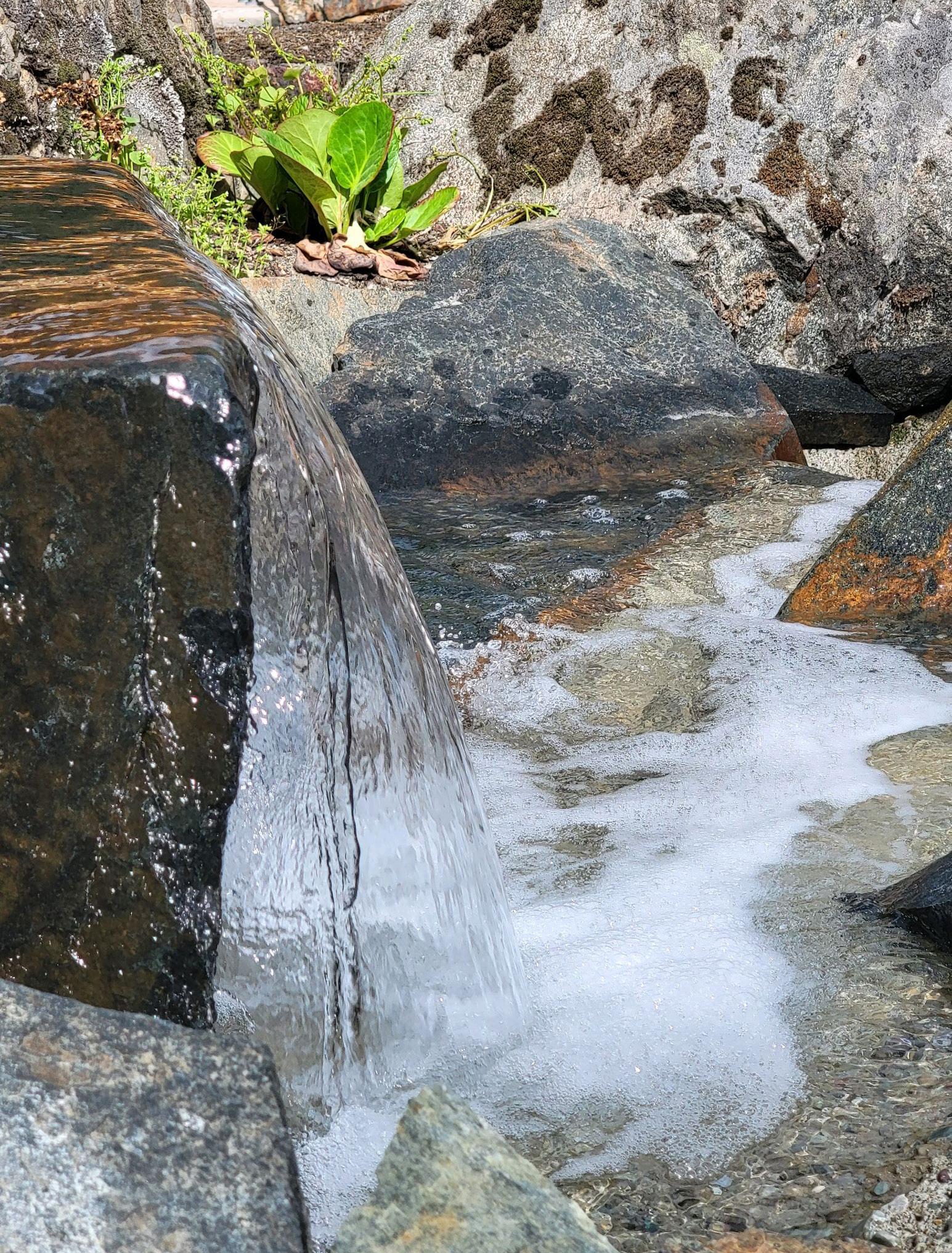
As concerns about water contamination rise, ensuring the quality and health of our swimming pool water is more important than ever. Whether from industrial runoff, household products, or the chemicals used to maintain pools, water contamination poses a significant health risk. Many contaminants are not easily detectable, and conventional testing often misses the complex mix of pollutants, leaving people exposed to harmful toxins in the water they use daily.
Swimming pools are an especially critical area of concern. Traditionally, pool maintenance has relied on heavy chemical treatments such as chlorine, stabilizer, and muriatic acid. These chemicals, while effective at disinfecting water and balancing pH levels, also contribute to broader environmental and health problems. Chlorine, for instance, forms byproducts that can irritate the skin and eyes and may pose long-term health risks if consistently inhaled or absorbed by swimmers. Wastewater treatment facilities already face immense pressure to filter out chemicals, and pools contribute additional burdens, releasing contaminants into the environment through runoff or drainage.
The problem of chemical overuse goes beyond just swimming pools. Contaminants in water from pesticides, fertilizers, pharmaceuticals, and other pollutants continue to build up in the environment, exacerbating the strain on our water systems. This accumulation of toxins not only threatens human health but also contributes to ecological damage, making it harder to maintain clean water sources.
Exceptional Water Systems (EWS) offers a forward-thinking solution to the problem of harmful swimming pool chemicals through its cutting-edge Ultra-Fine Bubble Technology. Rather than relying on the traditional approach of heavy chemicals, EWS uses natural elements such as ultra-fine ozone, oxygen, and carbon dioxide to treat pools. This approach is revolutionary, not just for pool water but for wastewater treatment as well.
Ozone, a key component of the EWS system, can be 20 to 3,000 times more powerful than chlorine at disinfecting and oxidizing

By Michael Geyer
contaminants. Its ability to eliminate harmful microorganisms is unmatched, making it a far superior alternative for pool maintenance. Moreover, the ultra-fine ozone in EWS's system helps break down contaminants in a way that enhances, rather than burdens, wastewater treatment processes. By reducing the reliance on chlorine, EWS helps prevent harmful chemical runoff from entering wastewater systems and helps promote a cleaner, more sustainable environment.
Ultra-fine oxygen diffusion in pool water, another feature of EWS's technology, not only aids in sanitation but also improves the swimming experience. Ultra-fine oxygen-rich water feels softer and silkier, enhancing comfort for swimmers while boosting the health of the pool environment. Higher oxygen levels help neutralize bacteria and contaminants, fostering an ecosystem where the need for synthetic chemicals is drastically reduced.
EWS also replaces muriatic acid, commonly used to lower pH levels in pools, with ultra-fine carbon dioxide, a much safer and environmentally friendly alternative. This switch further reduces the amount of harmful chemicals released into wastewater systems, addressing both human health and environmental concerns in one stroke.
In conclusion, the health and quality of swimming pool water is a vital issue, not just for those who use pools but for the broader ecosystem. EWS's innovative solutions are not only better for pool maintenance but also contribute to the overall sustainability of our water supply. By reducing the amount of chemicals used in water treatment and embracing natural solutions like ozone, oxygen, and carbon dioxide, EWS is leading the way in providing safer, healthier water for everyone.
Exceptional Water Systems is dedicated to providing Healthy Water for Humanity! For more information, please feel free to check us out at www.exwsystems.com or call us at (480) 694-4709.
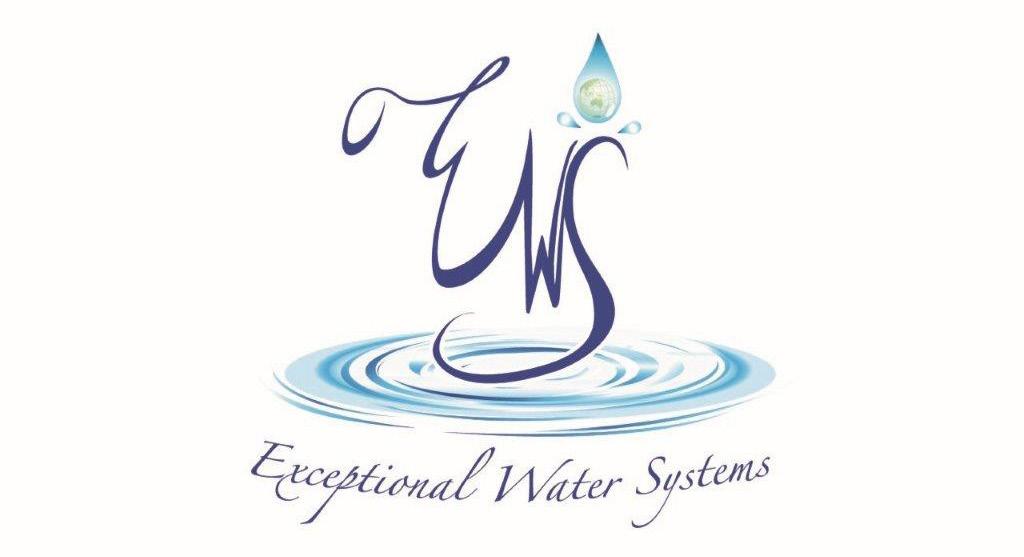


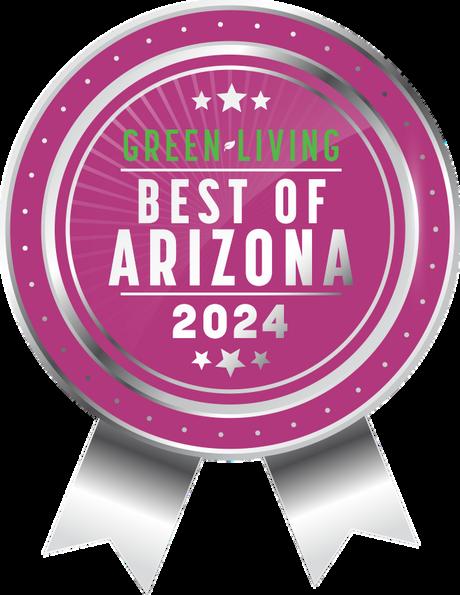



Local Food
and eco-conscious products
Music
Music
Music
October 14th
5PM - 9PM
Pera Club
Pera Club
Pera Club
October 14th Buy Tickets
October 14th Buy Tickets
1 E. Continental Dr, Tempe, AZ 85288 5PM - 9PM
1 E. Continental Dr, Tempe, AZ 85288 5PM - 9PM
1 E. Continental Dr, Tempe, AZ 85288



https://greenlivingmag.com/events/ best-of-arizona-2024-event/
https://greenlivingmag.com/events/ best-of-arizona-2024-event/ Local Food
https://greenlivingmag.com/events/ best-of-arizona-2024-event/
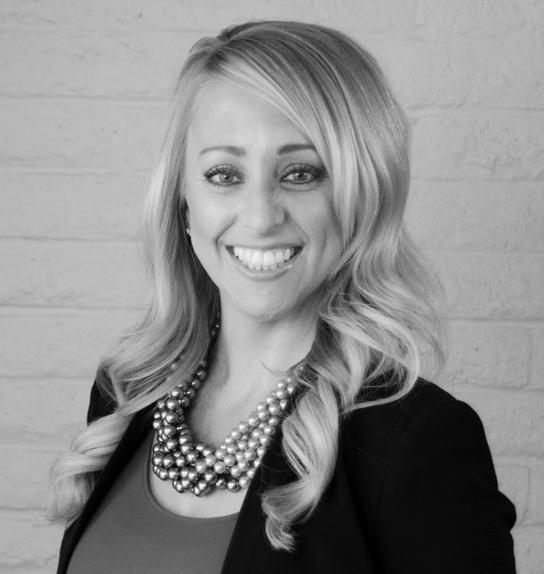
Dear Readers,
It’s officially October and a milestone for some of our most favorite things — slightly cooler weather, fall fashion, pumpkin spice everything (if you’re into that sort of thing) and the buzz of the holidays just around the corner. At GL, it’s officially time for us to announce the results of our third annual “Best Of Arizona” competition.
This year, the number of categories grew yet again, and so did your support. You turned out in droves to both nominate and vote for your favorite people and companies that are working hard to do right by the planet and its people. We can’t say thank you enough for being the driving force behind Best Of Arizona and are excited to share the results with you! Our team would like to congratulate the hundreds of people and companies nominated, and of course, those top 30 that have been named as the best of the best!
On October 14, you’ll have the opportunity to help us celebrate these individuals and companies at our 2024 Best of Arizona awards celebration at The Pera Club in Tempe. Get up close and personal with the winners to learn all about their efforts in sustainability, health, and well-being, while indulging in a lovely array of delicious sips and delightful bites. Get your tickets now at www.greenlivingmag.com/BoA2024.
Hope to see you there!
Thanks for reading,
Shelby Tuttle Managing Editor

Got a burning question or comment? Reach out at editor@greenlivingmag.com.
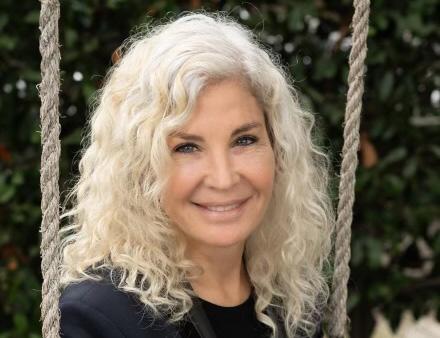
Angela Fairhurst is a non-fiction television producer and travel journalist whose work has been featured in Matador Network, Southern California Life Magazine, Gio Journal, and on her own site, Jaunt TV — which includes a bevy of exciting videos. She has a knack for writing about luxury hotels and luxury hotel bathrooms but is well-versed in living green, from the jungles of Costa Rica to wine tasting in the Land Down Under. Follow her on Instagram @jaunttv.

Misty Milioto is a New Orleans-based freelance writer and editor with more than 20 years of experience working with publications across the country. Most of her work has been with Modern Luxury’s suite of 85-plus regional magazines, and she has also written for publications including Sunset Magazine and Colorado Homes & Lifestyles. She has regular columns in New Orleans Magazine, New Orleans Homes, and New Orleans Bride. Misty also oversees a luxury lifestyle blog at girlwilltravel. com. She loves everything from exotic destinations and luxury resorts to food and wine — and everything in between.
PUBLISHER
MANAGING EDITOR
ONLINE EDITOR
ART DIRECTION & DESIGN
GRAPHIC DESIGNER
COPY EDITOR
COPY EDITOR
STAFF PHOTOGRAPHER
CONTRIBUTORS
Jennifer Burkhart
John Burkhart
Pam Delany
Anna Dorl
ADVERTISING SALES
Dorie Morales
Shelby Tuttle
Shelby Tuttle
Sly Panda Design
Melat Alebachew
Erin Wilson
Colleen Kern
Brett Prince
Angela Fairhurst
Colleen Kern
Misty Milioto
Beth Weitzman
Sascha Dainat - sascha.d@greenlivingmag.com
Pam Delany - pam.d@greenlivingmag.com
George Heussner - george.h@greenlivingmag.com
Whitney Urrea - whitney.u@greenlivingmag.com
EVENTS
Danielle Coletto - events@greenlivingmag.com
INTERNS
Yula Armstrong Reagan Shoemake
Paige Sundelius
CONTACT US AT:
Subscriptions: hello@greenlivingmag.com
Advertising: sales@greenlivingmag.com
Editorial: editor@greenlivingmag.com
480.840.1589 • www.greenlivingmag.com 13845 N Scottsdale Rd, Ste. 201, Scottsdale, AZ 85254


Please recycle this magazine

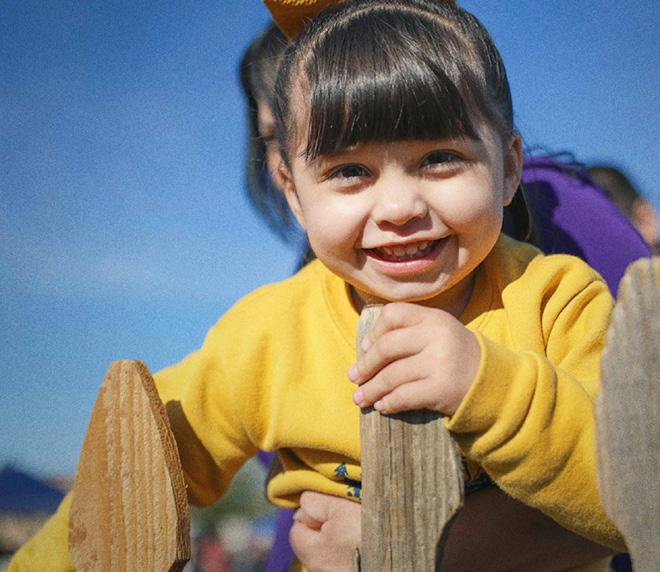
Chicanos Por La Causa (CPLC), a nonprofit serving multiple states, has received a $10,000 grant from the U.S. Bank Foundation to support its Housing Counseling program in Maricopa County. The funding will enhance CPLC’s efforts in homebuyer education and housing assistance.
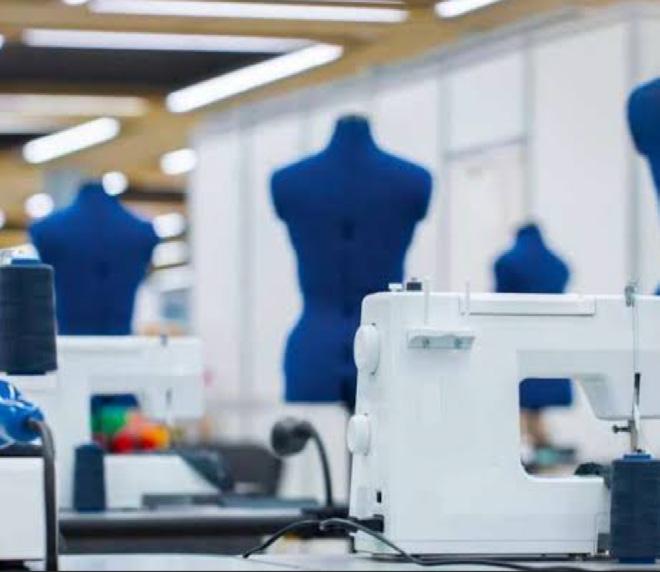
In the last 25 years, American retailers have shifted clothing manufacturing to the global south for cost benefits, worsening environmental damage. FABRIC promotes sustainable, local manufacturing through zero-waste practices and an industrial sewing certification program to revitalize U.S. production and create a skilled workforce.

Our team was pleased to celebrate Arizona’s rich culinary history at Flavors of Arizona: A Journey Through Native Culinary Heritage. From the vibrant indigenous ingredients to the exquisite teas and desserts, every moment was a sensory delight.
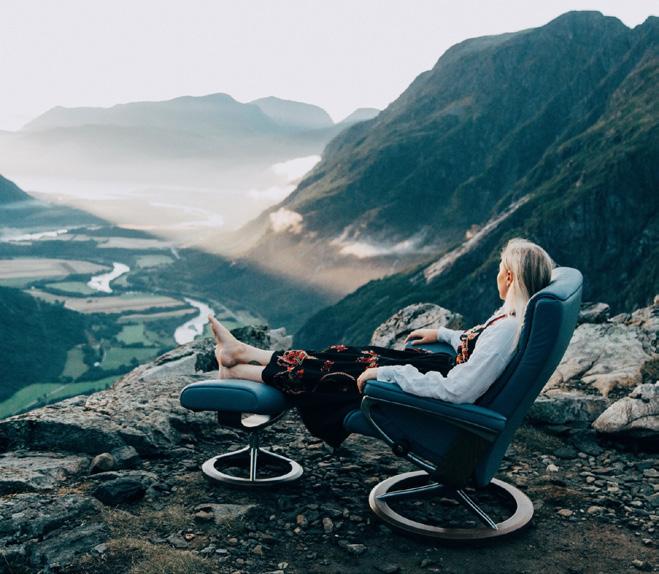
Our buying choices impact the planet significantly and supporting sustainable brands is essential for a greener future. Local retailer Copenhagen offers eco-conscious options like Luonto, which emphasizes recycling, durable design, sustainable production, and materials such as R-PES and bamboo.
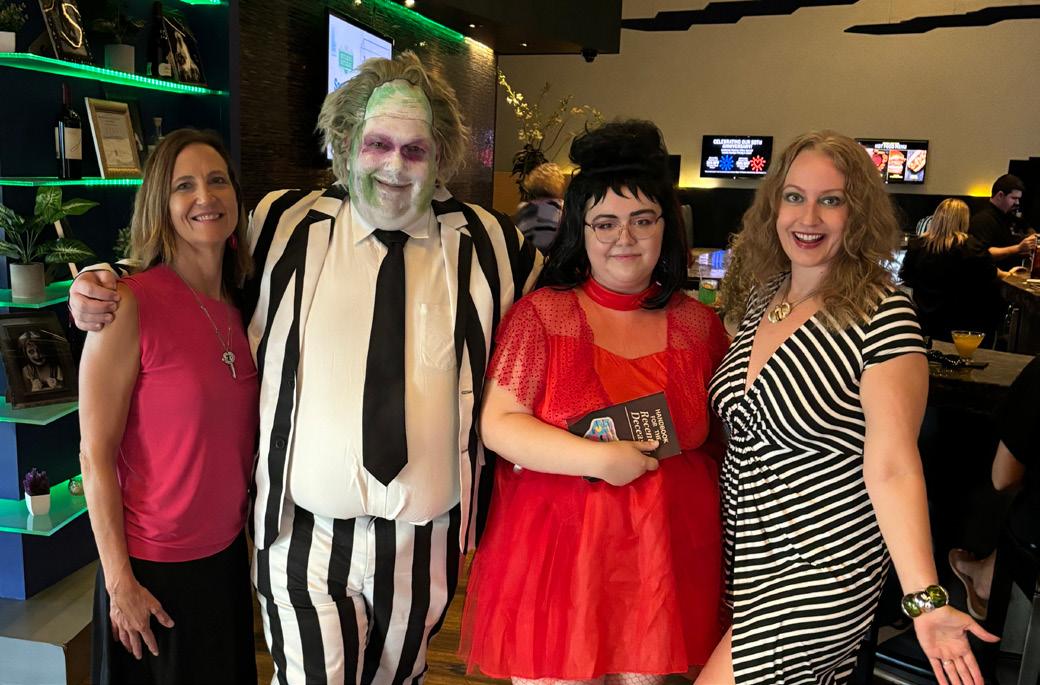
We had a wickedly good time at the Beetlejuice Beetlejuice premiere at Landmark Theatres! From the signature cocktails crafted by Bar Rescue's Mia Mastroianni to the themed photobooth and live DJ, it was a spectacular evening.
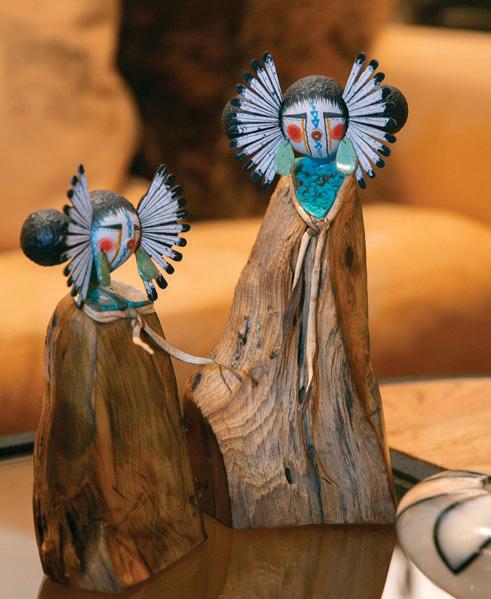


WORLDWIDE SHIPPING MADE IN THE USA
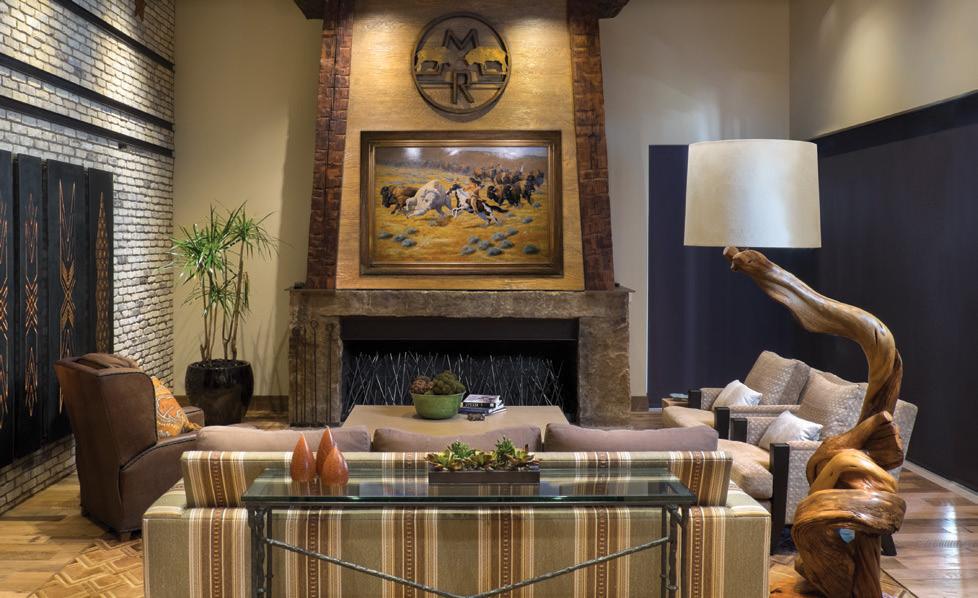
SPECIALIZING IN CUSTOM ORDERS
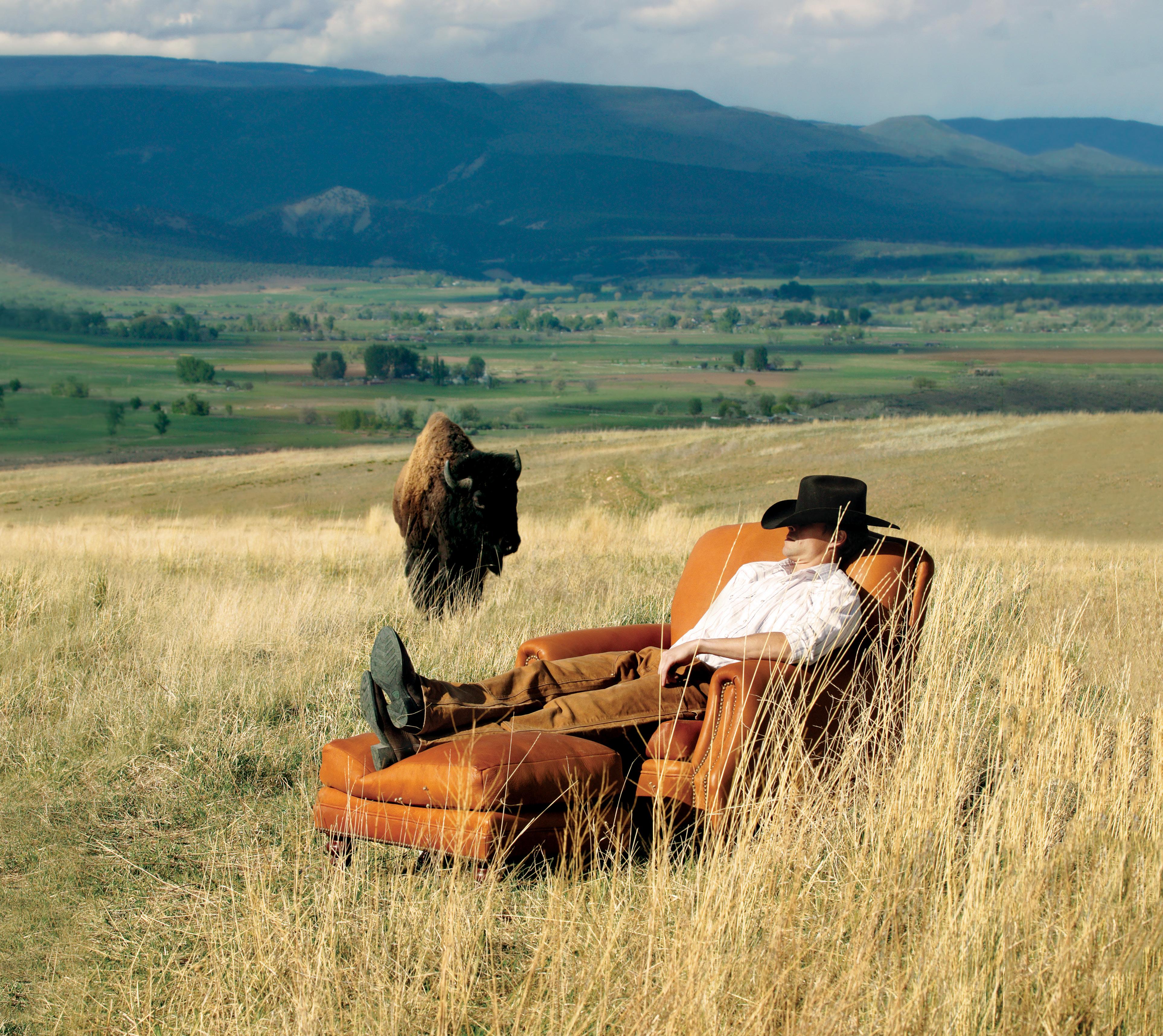
Did you know that most mass-produced furniture contains harmful chemicals that can slowly make their way into your home exposing your family and pets to low-level long-term exposure?
Our luxurious, heirloom quality buffalo leather furniture is handmade in America by skilled craftsmen using renewable materials and responsible tanning methods. Each piece is fully customizable, built to last, extremely durable, and made with clean, wholesome goodness. Just pure, simple furniture.

Cox Enterprises and gener8tor launched the Cox Cleantech Accelerator to support early-stage cleantech startups. The 12-week program offers $100,000 investments, coaching, and mentorship to five startups per cohort, twice a year. Led by Miguel Granier, the initiative aims to drive climate solutions and foster cleantech innovation in Georgia.

Energix Renewables and Google have signed a long-term agreement for Energix to supply 1.5GW of solar energy and Renewable Energy Credits (RECs) through 2030. This deal will strengthen Energix’s role in the U.S. renewable market, support Google’s carbon-free energy goals, and include favorable pricing and tax equity provisions.
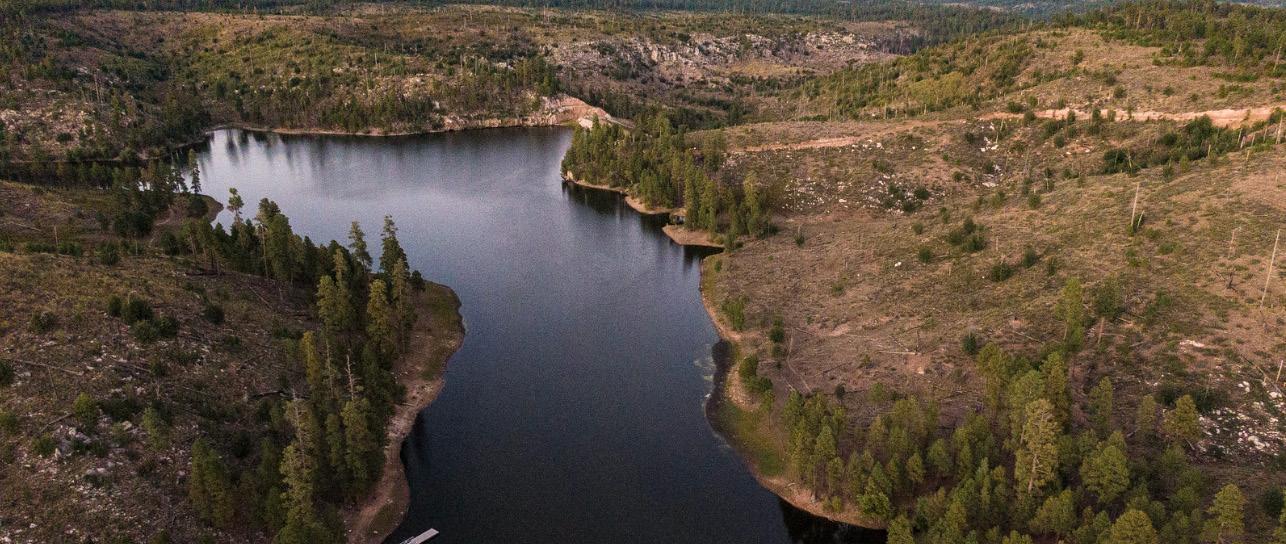
The USDA just announced it will invest $400 million into at least 18 irrigation districts and $40 million for federally recognized Tribal communities to enhance water conservation amid severe Western drought. This funding supports farmers and communities adapting to ongoing aridity and addresses critical Tribal water needs, marking a significant step toward a resilient water future.
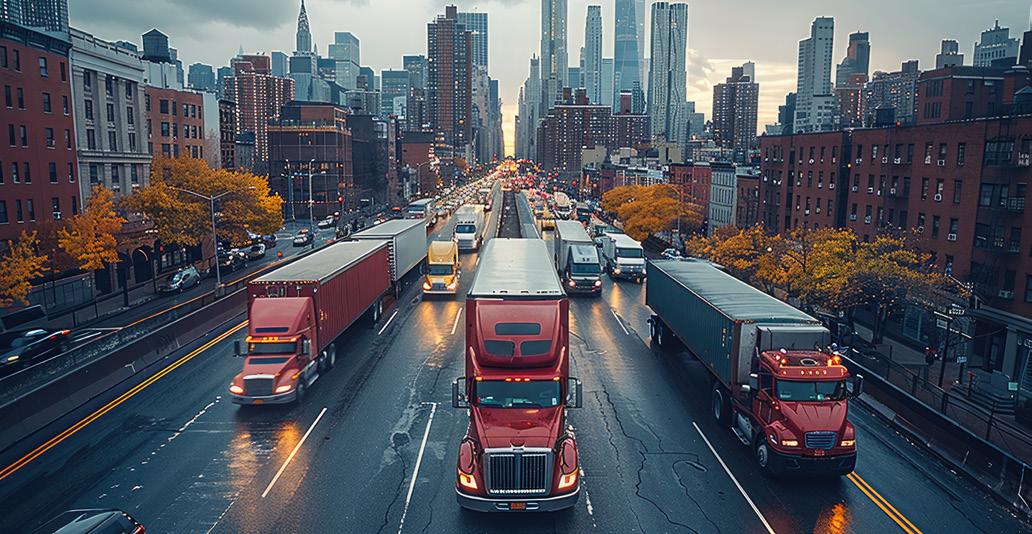
The New York Department of Environmental Conservation recently released air quality data from its Community Air Monitoring Initiative, revealing high pollution levels in disadvantaged communities due to truck traffic. This data underscores the urgent need for pollution control measures such as the Clean Deliveries Act, congestion pricing, and truck electrification.

The U.S. Court of Appeals for the D.C. Circuit upheld the strengthened Mercury and Air Toxics Standards, rejecting fossil fuel companies' and states' requests to block them. This decision maintains protections against mercury and other pollutants from coal-fired power plants that are crucial for public health and safety.

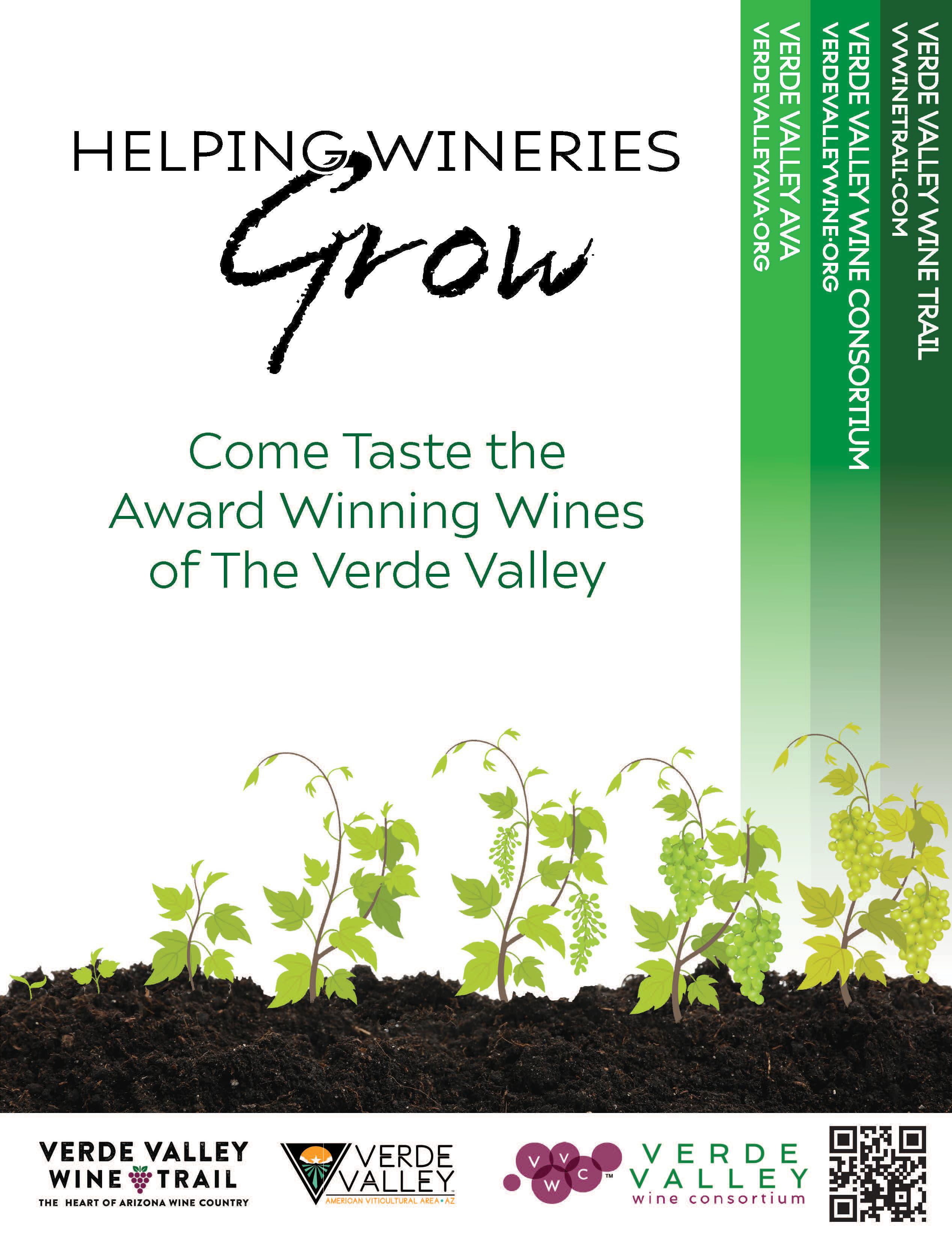

BY ANNA DORL
Maintaining eco-friendly home and personal care routines doesn’t have to be a difficult – or exorbitantly expensive – task. Zero waste alternatives, plastic-free packaging, and mindful ingredients can often be found cheaper and more easily. Familiar brands that put fuel and fire behind these ideas continue to power consumers toward a better future. These concepts, put into action, can help both consumers and companies make tangible differences. These changes might continually create a positive butterfly effect. We all live in the same world, so contributing to its upkeep should matter to everyone. Here are five products to help us do that.
Toothpaste tablets are thankfully not just a crunchy hipster trend anymore. Although European-made, Unpaste is home to “the first fluoride tablet in the United States.” Toothpaste tablets offer a unique and eco-friendly approach to oral health. These tabs are vegan, FDA registered, zero waste, and effective through the power of cellulose. Unpaste Toothpaste Tablets are available with or without fluoride, in mint or cinnamon flavors. Buying less toothpaste in tubes can affect the impacts of plastic pollution and harmful chemicals – on both you and your environment. https://store.unpaste.us
For many people and products, just knowing that an ecofriendlier alternative exists might be enough to create some unlikely customers. Kind Laundry is one of those companies with its meaning in its name. Its mission to provide better cleaning solutions includes its Laundry Detergent Sheets: zero waste, starch-free, and truly clean. Many “normal” laundry products contain chemicals we don’t need or want coming into contact with our bodies. Kind Laundry’s Laundry Detergent Sheets can either be fragrance-free or smell like Ocean Breeze. With size options of 32 or 60 loads, these sustainable, “liquidless” sheets can be used in highefficiency washers and are great for travel, as they can be taken through TSA. www.kindlaundry.com
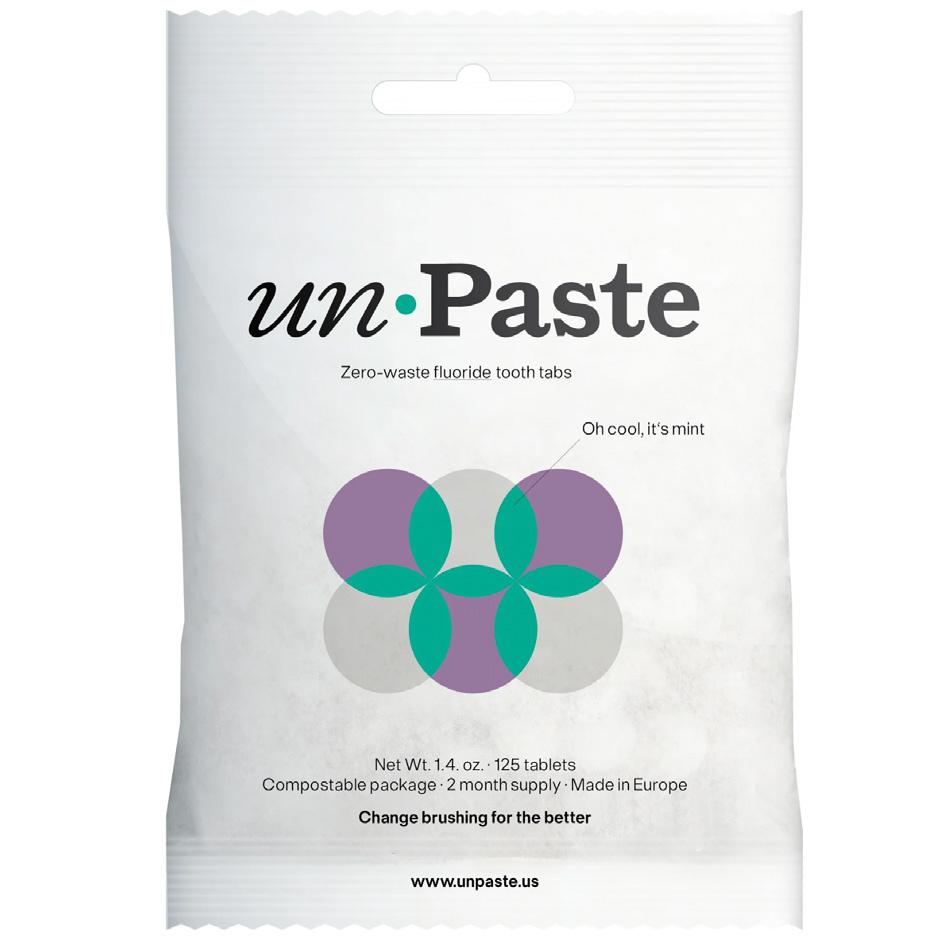

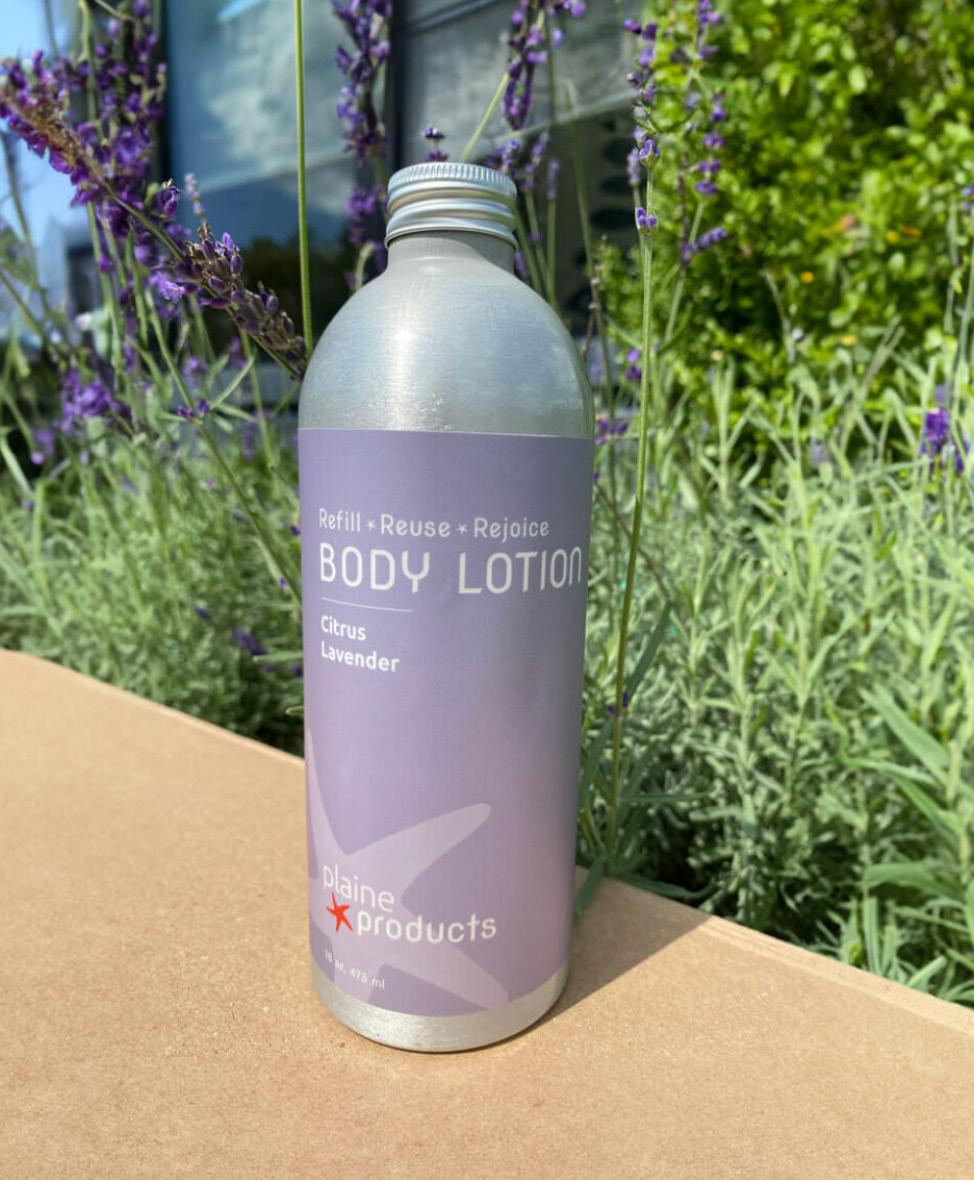
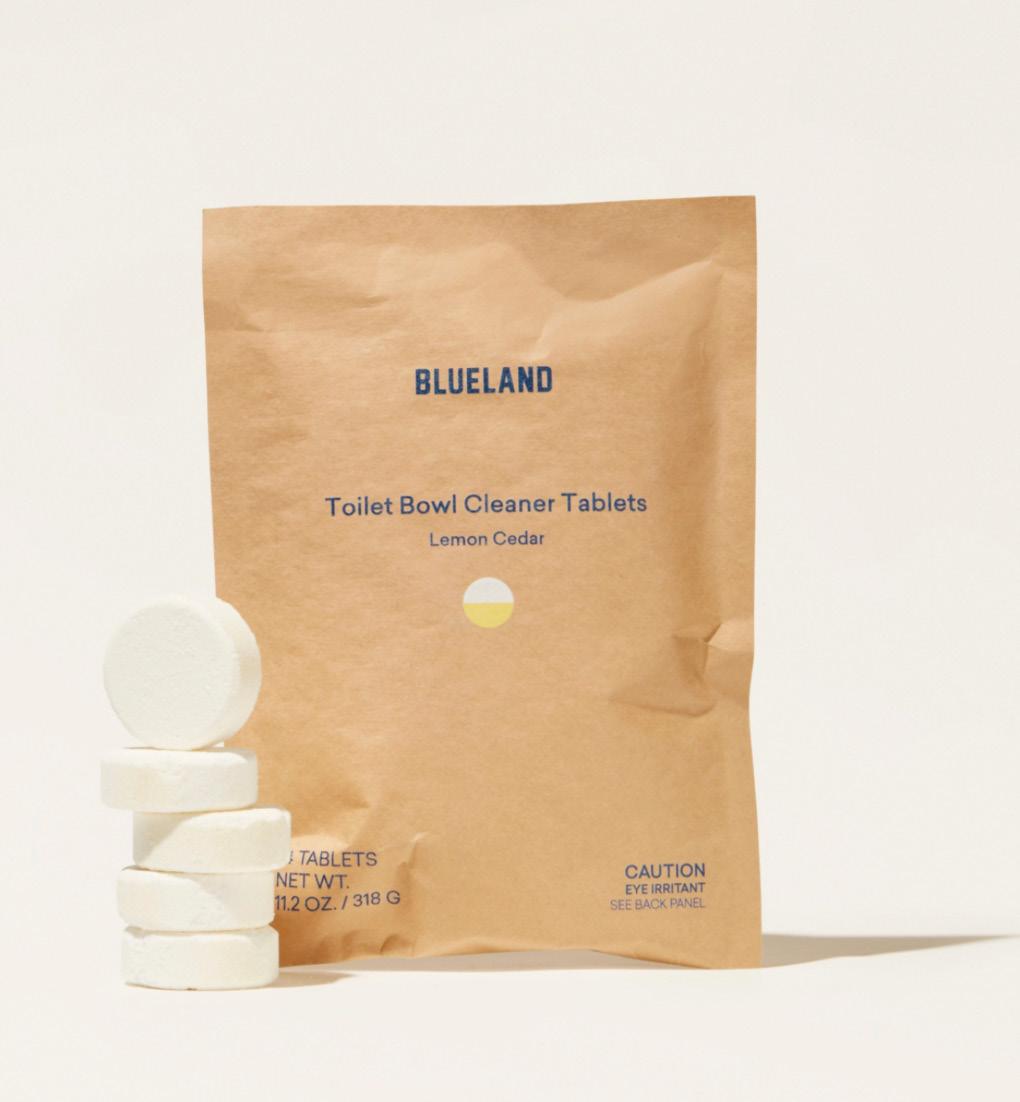

Not all body lotions are made with the planet in mind. Plaine Products, on the other hand, creates an aloe-based and biodegradable moisturizing formula. Made with no palm oil, this zero-waste product comes in an “infinitely recyclable” aluminum bottle with a reusable pump. You can order this product in 1 gallon, 16 ounce, and 2.5 ounce sizes. Place your order just once or enjoy the ease of a subscription. This lotion comes unscented or in two luxurious fragrance choices: Rosemary Mint Vanilla and Citrus Lavender. Cruelty free, vegan, and hypoallergenic: it’s suitable for so many users. www.plaineproducts.com
Blueland’s cleaning products tend to be highly regarded, thanks to their simple and powerful composition. While you obviously want to get the interior of your porcelain throne as shiny as possible, you can do it without hurting the Earth. That’s where Blueland’s Toilet Bowl Cleaner Tablets come in — and they’re zero waste and plastic-free! Drop a tablet into your toilet bowl, brush the inside until it's squeaky clean, and flush to reveal your super fresh throne. No need for bleach, ammonia, or other similar harsh ingredients. With a Lemon Cedar scent, these tablets can naturally address what can easily be the grimiest part of cleaning a bathroom. www.blueland.com
The Rejuvenating Facial Fusion Moisturizer by Vieve’s Leaves is said to increase the skin’s hydration by 70% within eight hours. Containing 250MG CBD, its dynamic formula includes an E-CANN Proprietary Blend, fruit stem cells, organic aloe, and other intentional ingredients (several of which are organic). The moisturizer can encourage collagen production, soothe inflammation, and smooth out the surface of the skin to reduce wrinkles. It’s vegan and cruelty free, plus free from fragrance, silicone, parabens, and phthalates. You can apply this product to freshly cleansed skin with or without a gua sha, which can elevate your skin care routine even further. www.vievesleaves.com
Launched by a passionate mother-daughter trio, a new online marketplace with Phoenix brick-and-mortar roots is stirring
BY SHELBY TUTTLE

KKitchen Switchen began its journey as the beloved North Phoenix kitchen reseller Kitchen Switchin’. When the owner decided to move on, Amy Powers and her daughters, Brittney and Emma Valentine, saw an opportunity to honor its legacy. They transformed the physical store into a bustling online hub, catering to culinary aficionados and digital creators who want not only to buy and sell kitchenware ethically, but also connect members of a vibrant conscious community in which they can share recipes, cookbooks, meal plans, homemaking classes, and more.
By doing so, the Powers family hopes to revolutionize cooking by breaking down social and economic boundaries and educating buyers on sustainability.
“In today's technological age, there are numerous ways to obtain food, but many of these options divert people from their kitchens and the joy of creating nutritious, memorable meals,” said Amy Powers, CEO of Kitchen Switchen. “Our mission is to inspire a return to home cooking by providing the right tools. Instead of settling for cookware containing non-degradable chemicals that harm the environment and health, users can explore our extensive collection of high-quality, eco-friendly kitchenware.”
Annually, more than 100 million pots and pans are discarded globally, many composed of materials that accumulate in landfills that contaminate soil and
water sources, with visible impact around the world. As such, Kitchen Switchen’s goal is to give gently used kitchenware a second life while prioritizing products that use sustainable, recycled, and non-toxic materials.
Kitchen Switchen boasts a diverse marketplace featuring both pre-owned and brand-new kitchenware. From iconic Le Creuset to Our Place, buyers will find a variety of quality items to suit their needs and budget.
The site’s innovative "Kitchen Kids" section even allows parents to buy and sell kid-friendly kitchenware like lunch boxes and thermoses, while kids classes (coming soon) will aim to ignite children's passion for cooking.
For more information, visit www.KitchenSwitchen.com.
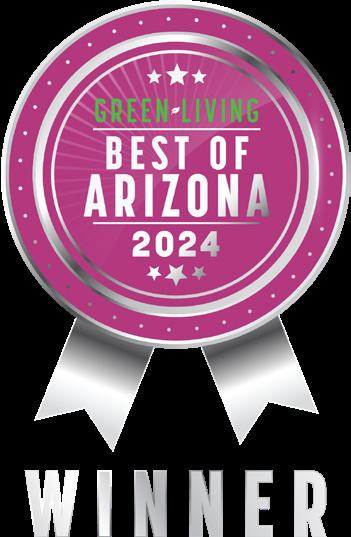
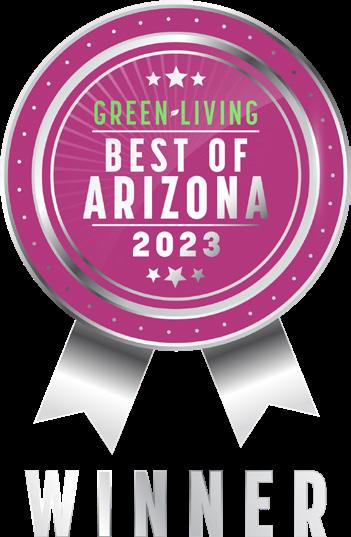
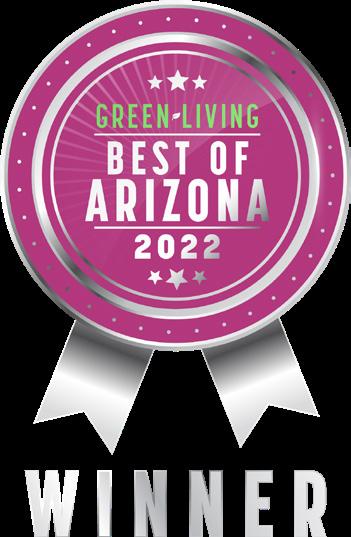
Dear Green Living Reader,
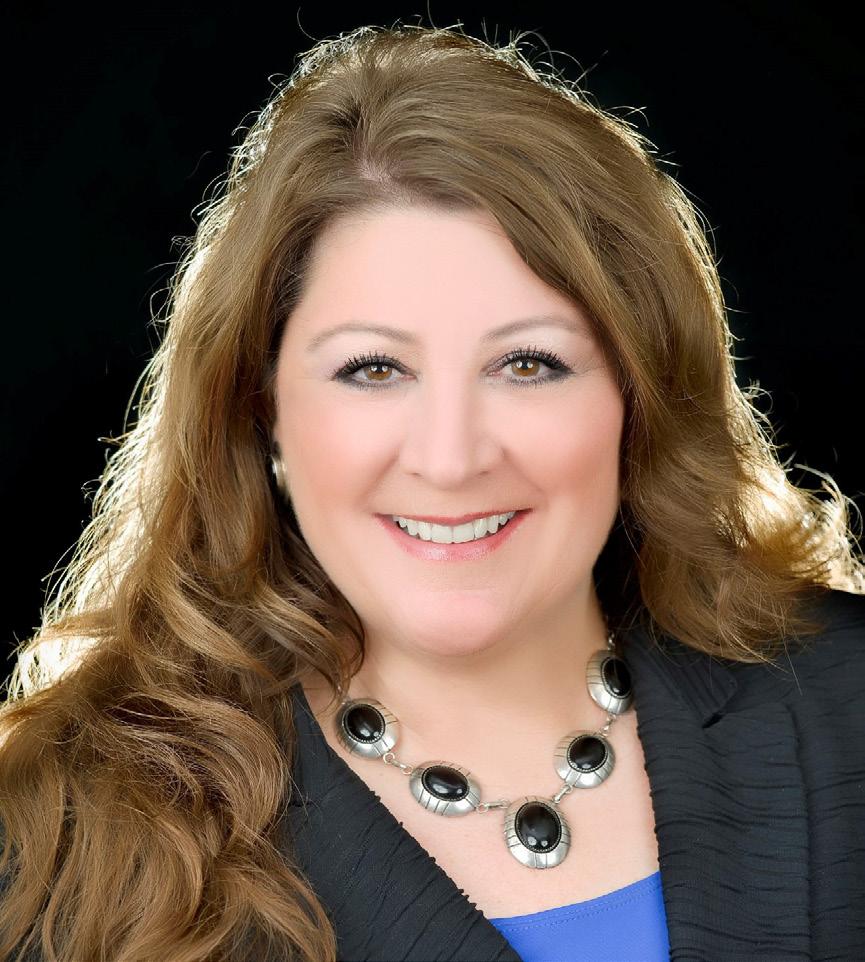
I am filled with gratitude for the love and support from my clients, friends, family, fellow sustainability activists and this wonderful eco-conscious community. To be nominated and selected three years in a row for Green Living’s “Best Green Realtor” award is a huge honor. I am inspired by every nominee!
I celebrate each of you who care enough to choose to make earth-conscious business and lifestyle choices — you are having a positive impact on our ecosystem that sustains us. Green Living magazine is a wonderful source for learning about earth friendly products and about the people, organizations and businesses that are taking the initiative to live and work in ways that are healthier for people and our precious planet.
I am also thankful for all of you who engage in environmentally friendly policy development. It is important to strongly support leaders and candidates who actively advocate for eco-restorative policies as top priorities, and who clearly connect the dots that our ECOnomy must have a healthy ECO to function well.
It feels good to incorporate a higher purpose of preserving and restoring our planet into my life and work, and I so appreciate you all who do the same. Integrating business and sustainability is an essential part of our path forward to sustained livability on this earth — so let’s keep moving in that direction.
Thank you, “Greenie” community! You are lighting the way for a brighter future!



BY ANGELA FAIRHURST

IIn Tempe, Arizona, a quiet revolution in sustainable scenting is taking place in commercial, healthcare, and residential environments. Jessica Wiehle, founder of AromaWell, embarked on her journey into the world of aromatherapy through a deeply personal experience. Watching her mother battle cancer has profoundly shaped her understanding of health and wellness.
"My mother was beautiful and loved her perfumes and cosmetics yet lived in a time when synthetics were taking over," Jessica recalls.
Her mother's passing at the age of 48 sparked Jessica's mission to explore natural alternatives, leading her to discover the healing power of essential oils.
"Aromatherapy found me during a sea of emotions and grief, becoming both a healing tool and a catalyst for change," Jessica shares.
This experience, coupled with her own sensitivities to artificial fragrances, fueled her passion for natural health options and her desire to create AromaWell.
"I realized that many people suffer from sensitivities without knowing the cause," she explains. "Finding aromatherapy was a godsend — I could smell good and feel good without being triggered."
This realization led Jessica to remove synthetic products from her life, grow her own food, and
embrace holistic living. Her personal journey became the foundation for AromaWell's mission: to help people "Smell Good and Feel Good, Everyday" through the power of natural scents.
AromaWell’s approach focuses on the therapeutic value of natural scents.
"Our essential oils offer mood enhancement, increased productivity, and reduced anxiety — benefits that synthetics can't provide,” Jessica explains.
The company’s commitment to sustainability is evident in its meticulous sourcing of 100% pure essential oils.
"We only use wild-harvested, organic, and ethically farmed oils," Jessica notes.
This dedication ensures that AromaWell's products are not only effective but also environmentally responsible. Jessica's travels to distilleries around the world have deepened her understanding of the oils'
origins and reinforced her commitment to quality.
AromaWell's Aromatic Branding Experience helps clients create custom blends that align with their brand's mission and vision.
"We guide them through a full sensory experience to determine the perfect scent," Jessica explains. The process is similar for homeowners, focusing on the desired atmosphere and emotional impact.”
AromaWell's impact extends across various business sectors, from healthcare to hospitality, to create custom aromatic environments.
"We're not masking odors with artificial chemicals," she says.
"We're enhancing spaces with 100% pure essential oils and technology, making us truly one-of-a-kind in the commercial scent industry."
In a Phoenix IV clinic, artificial fragrances were replaced with a custom-formulated aromatherapy blend, creating a signature "olfactory logo" that improved patient mood and reduced anxiety.
At a memory care facility in Fountain Hills, AromaWell installed commercial aromatherapy systems, replacing toxic, petroleum-based air fresheners. This transformation created a more welcoming environment for guests and prospects while reducing
anxiety for existing residents and staff.
In the hospitality industry, AromaWell is helping hotels and vacation rentals create distinctive, ecofriendly atmospheres.
"Our natural scents can transform a rental into a memorable, healing retreat," Jessica notes.
The company's approach to workplace wellness is equally innovative, integrating aromatherapy into office environments to create more productive, positive, and healthy spaces for employees.
AromaWell’s diffusers are designed with both aesthetics and functionality in mind, ensuring that their solutions are as beautiful as they are effective. The company’s commitment to sustainability extends to product sourcing and packaging, prioritizing partnerships with sustainable growers, and using eco-friendly materials whenever possible.
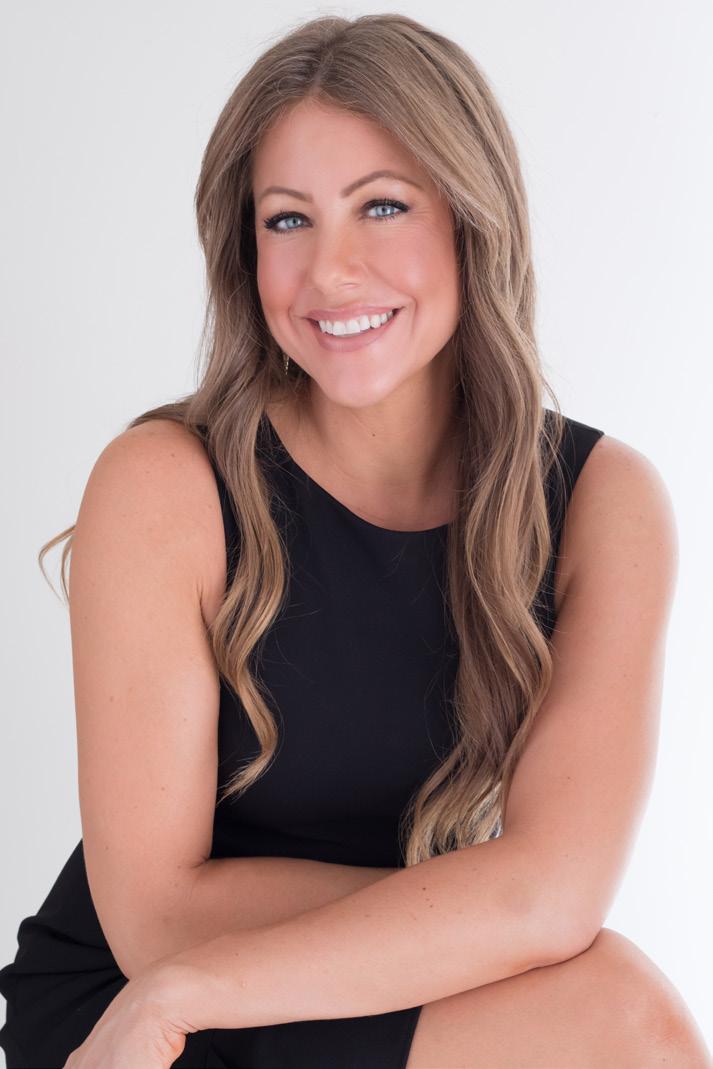
As awareness of the harmful effects of synthetic fragrances grows, AromaWell stands at the forefront of natural commercial aromatherapy, proving that the right scent can transform lives and reconnect us with nature. As the company expands its reach, AromaWell is set to redefine our relationship with scent, one space at a time.

A startling revelation about plastic waste propelled Jamie and Molly Wiecks to reimagine personal care products for a cleaner planet
BY BETH WEITZMAN
Amid the rising tide of plastic waste, Community Goods is making waves. Founded by Jamie and Molly Wiecks, the brand proves that personal care can be both sustainable and effective without compromising quality or environmental integrity.
A 2020 NPR exposé sparked their mission. Reading the article titled, “How Big Oil Misled The Public Into Believing Plastic Would Be Recycled,” “felt like a kick to the stomach," Jamie recalls. "The story showed landfill workers in Oregon burying all plastic waste except milk jugs and soda bottles because recycling the other plastic items wasn’t cost-effective.”
For Jamie, a native Oregonian who grew up sorting his family’s recycling, it was a shock. “That led me to dive deeper and realize the extent of the global plastic crisis, which ultimately led to us founding Community Goods.”
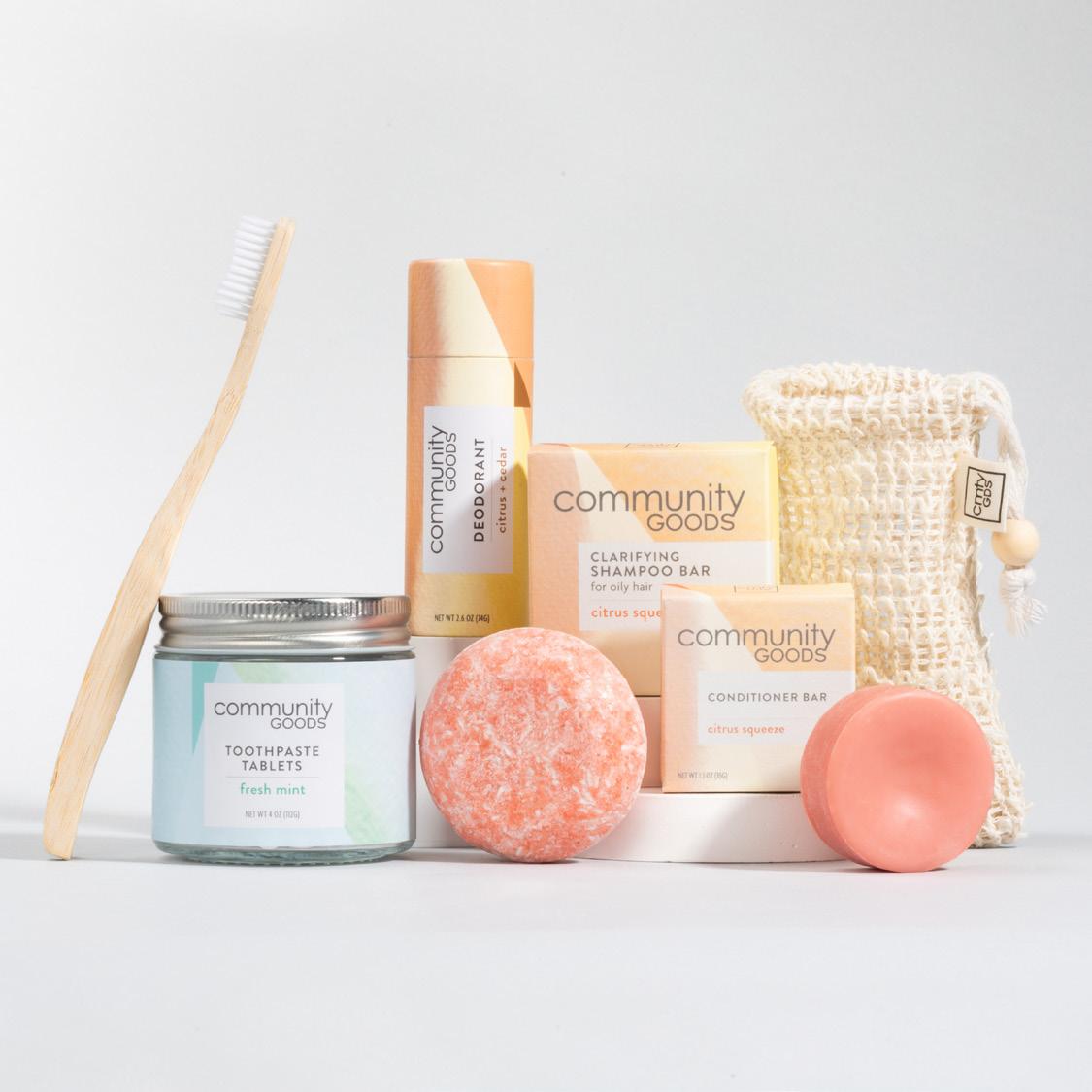
Motivated by their love for Oregon's beaches and concern for their children's future, the couple set out to create exceptional products without plastic.
"Everyone has places that are special to them, that have meaning. And knowing some of those places around the world are being overrun with plastic pollution just breaks my heart," Jamie shares. "Kids deserve clean beaches and clean water where they can swim and play. Community Goods' mission is to make amazing products without the plastic, to help protect these places and give the next generation the same opportunities we had.”
Community Goods' lineup — concentrated shampoo and conditioning bars, toothpaste tablets, deodorants, and bamboo toothbrushes — isn't just plastic-free. It's also vegan, cruelty-free, and crafted with clean, natural ingredients, free from harmful substances like SLS, aluminum, phthalates, parabens, toxins, and palm oil.
"Community Goods is built on the belief that we can do well by doing good," Jamie explains. "That means creating products that are good for both human health and planet health.”
The company partners with 1% for the Planet, is certified cruelty-free and vegan through PETA's Beauty without Bunnies program, has achieved carbon-neutral shipping via EcoCart, and supports ocean conservation efforts through The Surfrider Foundation and Ocean Conservancy.
"We knew from the beginning that just being plasticfree wasn't enough," Jamie states. "If this was going to be our company, it had to stand for more than that.”
Despite the challenges of sourcing plastic-free materials and designing effective products without conventional packaging, Community Goods has persevered. The company has successfully crafted its products and packaging with sustainable, recyclable materials like paper, cardboard, glass, and aluminum. Even the packing tape — made of paper, of course — is entirely plastic-free.
Jamie jokes that the company has overcome these obstacles with,
“Patience, and a healthy (unhealthy?) dose of stubbornness.”
Looking ahead, Community Goods plans to expand.
"We are already seeing more sustainable brands emerge and more serious sustainability efforts from larger brands," Jamie notes. "This will continue as more people recognize the importance of a circular economy and the dangers plastics represent to human health and our planet."
Jamie and Molly remain dedicated to a plasticfree future in personal care and are considering becoming a certified B Corp. once eligible after one full year in operation.
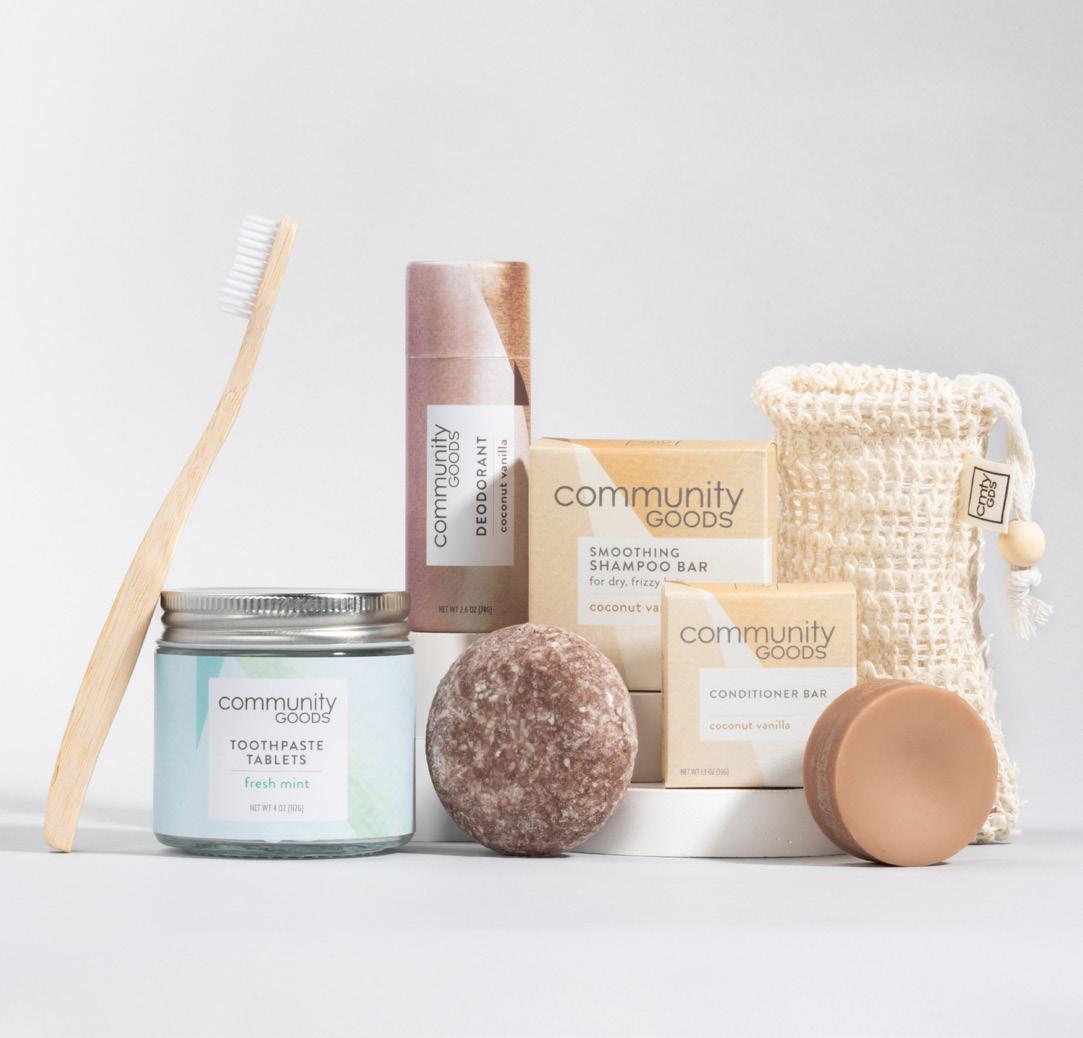
Jamie’s advice is simple: "Don't take my word for it," he advises. “Instead, do your own research from legitimate sources. If you end up feeling like us, that this is a major issue for our planet, then think about those small, simple steps you can take to make a little change towards something better, one step at a time.”
For more information, visit www.communitygoods.co or follow Community Goods on Instagram, TikTok and FaceBook @communitygoods_.



BY COLLEEN KERN
IIn an era where sustainability and health-conscious decisions are becoming paramount, consumers are increasingly scrutinizing the products they bring into their homes. One often overlooked area is home textiles — bed sheets, towels, and upholstery that can significantly impact our health and the environment. Enter OEKO-TEX, a certification system designed to guide consumers in choosing safer, more sustainable textiles.
OEKO-TEX offers multiple certification programs, but two stand out for consumers: STANDARD 100 and MADE IN GREEN.
The OEKO-TEX STANDARD 100 label is a beacon for health-conscious shoppers. Products bearing this certification have been rigorously tested for over
1,000 harmful chemicals, ensuring that your sheets, towels, or even baby clothes don’t contain substances that could harm your well-being. These rigorous tests consider how people use textile products—whether through skin contact or inhalation of fumes.
Imagine STANDARD 100 as your first line of defense against hidden toxins like formaldehyde, pesticides, or heavy metals. Think of it as a safety net for busy families wanting to make better choices.
OEKO-TEX MADE IN GREEN: HOLISTIC SUSTAINABILITY
While STANDARD 100 focuses on health, MADE IN GREEN takes a broader view of sustainability. This certification ensures that textiles are safe for use and produced under environmentally friendly and socially responsible conditions. MADE IN GREEN ensures that the textiles are produced sustainably, meaning factories follow stringent standards for resource efficiency, chemical management, and wastewater treatment.
A unique feature of MADE IN GREEN is its traceability. Each product comes with a unique code or QR code, allowing consumers to trace the supply chain behind their purchase — a powerful tool for transparency and accountability.
Home textiles are in constant contact with our skin, and many harmful chemicals can lurk unnoticed. These substances may contribute to long-term health issues, including respiratory issues, reproductive problems, and even more serious conditions like cancer. Vulnerable populations, including babies, allergy sufferers, and the elderly, are particularly at risk.
OEKO-TEX assures ongoing quality control. They don't just test products once — they conduct control testing by purchasing items directly from store shelves to ensure standards are continuously met.
OEKO-TEX'S COMMITMENT TO SUSTAINABILITY
OEKO-TEX isn’t just about human health. It’s equally committed to protecting the environment through its MADE IN GREEN certification. This label guarantees that the supply chain adheres to ecofriendly production practices, such as:
• Resource Efficiency: Responsible water and energy use.
• Chemical Management: Strict limits on manufacturing chemicals.
• Wastewater Testing: Proper treatment to prevent pollution.
• Waste Handling: Ensuring proper disposal and recycling of waste materials.
These environmental protections are not just one-time checks. To maintain their certifications, companies must undergo regular audits and show continuous improvements in reducing their environmental impact.
Besides being environmentally friendly, OEKO-TEX standards ensure products are made under socially responsible conditions. Factories certified under OEKO-TEX must also meet strict requirements around worker safety, fair wages, and ethical labor practices.
For example, companies with STeP certification (which

contributes to MADE IN GREEN) are excluded from certification if they engage in exploitative labor practices like child labor, have blocked fire exits, or lack proper safety measures. Certified factories must also provide training, ensure equal treatment, and maintain clear communication channels for workers to file complaints without fear of retaliation.
There are many sustainability certifications out there, but OEKO-TEX stands apart for several reasons:
• It was the first to introduce a restricted substance list (in 1992) and continues to lead the industry in setting stringent standards.
• It requires annual testing and recertification, ensuring products stay compliant over time.
• The certification cost is spread throughout the supply chain, making sustainable textiles more accessible to consumers at different price points.
Unlike other certifications that may only address one aspect (such as organic farming or fair labor), OEKOTEX provides a holistic approach that covers health, sustainability, and social responsibility.
A common misconception is that organic textiles are inherently safe. However, harmful substances can be added to the fibers during manufacturing. This is why OEKOTEX places such importance on testing all stages of production.
Their latest innovation, the ORGANIC COTTON certification, combats fraudulent organic claims by ensuring that cotton meets environmental and safety standards throughout the entire supply chain.
But once they become aware, consumers love looking for these labels. OEKO-TEX is actively working to raise awareness through brand ambassadors and social media campaigns. As more brands adopt OEKO-TEX certifications, consumers are starting to take notice. For instance, brands like Avocado Green Mattress are leading the way by proudly displaying their OEKOTEX certification, demonstrating their commitment to consumer safety and sustainability.
So, how can you make sure you’re buying OEKOTEX certified products? Here are a few tips:
1. Verify the Label: Look for the OEKO-TEX number or scan the QR code to confirm the product’s certification.

Unfortunately, many consumers, especially in the U.S., are unaware of OEKO-TEX certifications. Consumers are more likely to recognize and trust these labels in countries like India, China, and much of Europe, where stricter textile safety laws exist. However, in the U.S., people often assume that products sold in stores are automatically safe, not realizing that many textiles may contain harmful chemicals.
2. Prioritize Key Textiles: Start with items that come in direct contact with your skin, such as bedding, towels, and clothes for babies or those with sensitive skin.
3. Think Long-Term: High-quality, durable textiles benefit your health, the environment, and your wallet over time.
OEKO-TEX sets the bar high when it comes to ensuring that textiles are safe for people and the planet. By choosing certified products, you can protect your health, support fair labor practices, and reduce your environmental footprint. Remember, every product you purchase is a vote for a healthier, more sustainable future. The next time you shop for home textiles, look for the OEKO-TEX label — your assurance of a safer, greener choice for your home and the planet.
To explore selecting the right OEKO-TEX certified products, check out the OEKO-TEX Buying Guide for practical advice to make sustainable, safe choices for your home textiles. www.hohenstein.us/en-us/ oeko-tex/buying-guide
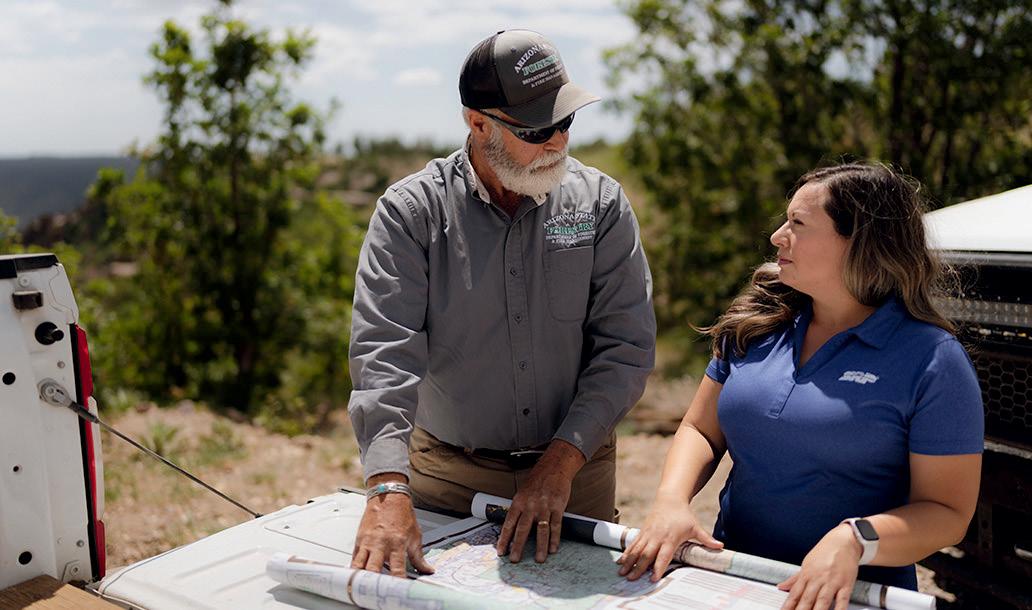

srp.net/healthyforest
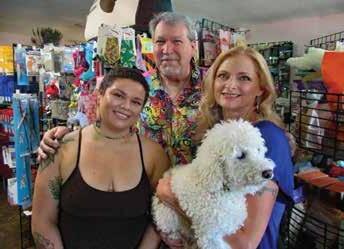

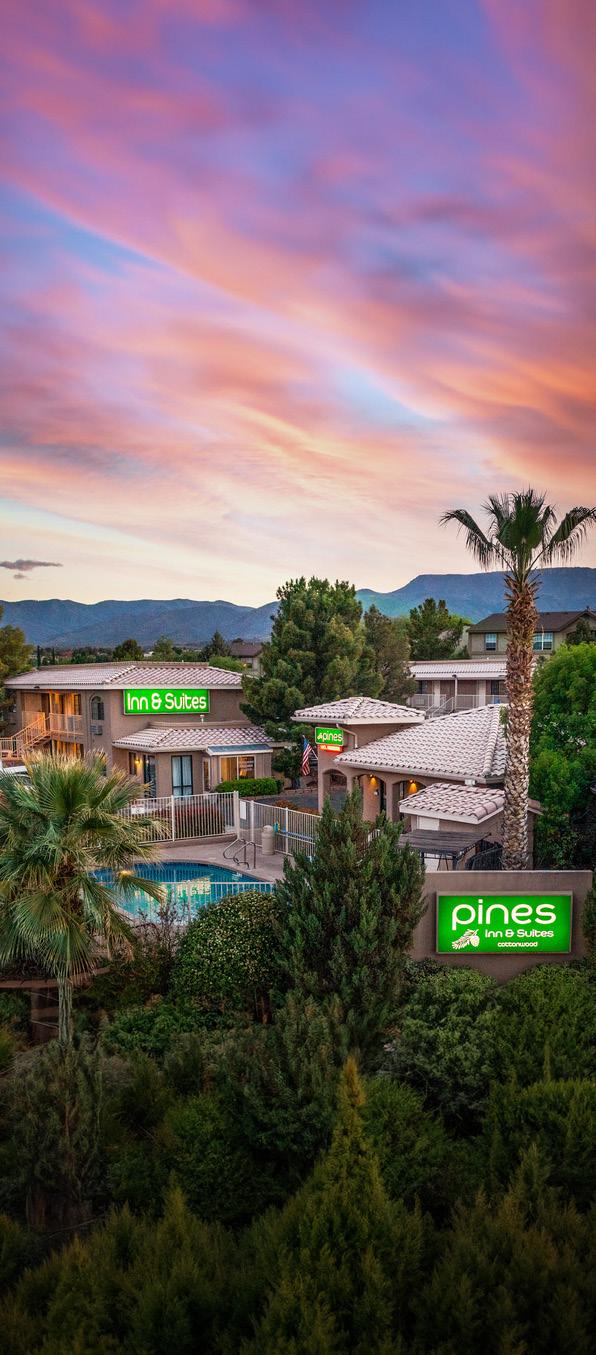


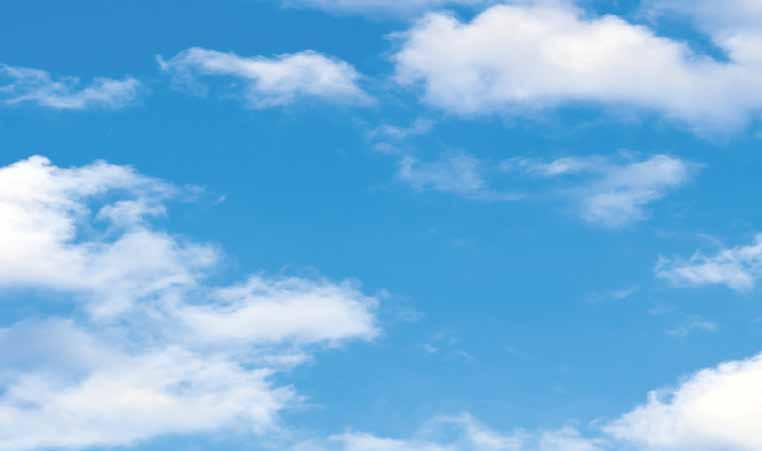

BY MISTY MILIOTO, ANGELA FAIRHURST, AND SHELBY TUTTLE
In a world facing increasing environmental challenges, Arizona's commitment to sustainability is more important than ever. Our 2024 Best of Arizona Awards highlight the innovative companies working to make a tangible difference, as well as individuals who inspire us to be our best selves. By showcasing the achievements of these leaders in their fields, we hope to inspire others to join the movement towards a more sustainable future.

Gilbert’s Agritopia Farms, rooted in a rich history dating back to 1927, is a testament to sustainable agriculture and community development. Initially known for producing alfalfa hay, the farm evolved over decades, shifting its focus to cotton and wheat in the 1950s. But in 1960, Jim and Virginia Johnston took over, diversifying the farm’s produce to include pima cotton, durum wheat, barley, and more. To preserve their land, years later, the family collaborated with local planners to create Agritopia, a unique urban community that integrates farming at its core.
Since 2002, Agritopia Farms has adhered to Certified Organic standards, cultivating a variety of crops across three distinct areas: row crops, a citrus and stone fruit orchard, and a section dedicated to Medjool dates and olives. The farm utilizes sustainable practices such as drip irrigation, soil amendment with organic matter, and the use of beneficial insects.
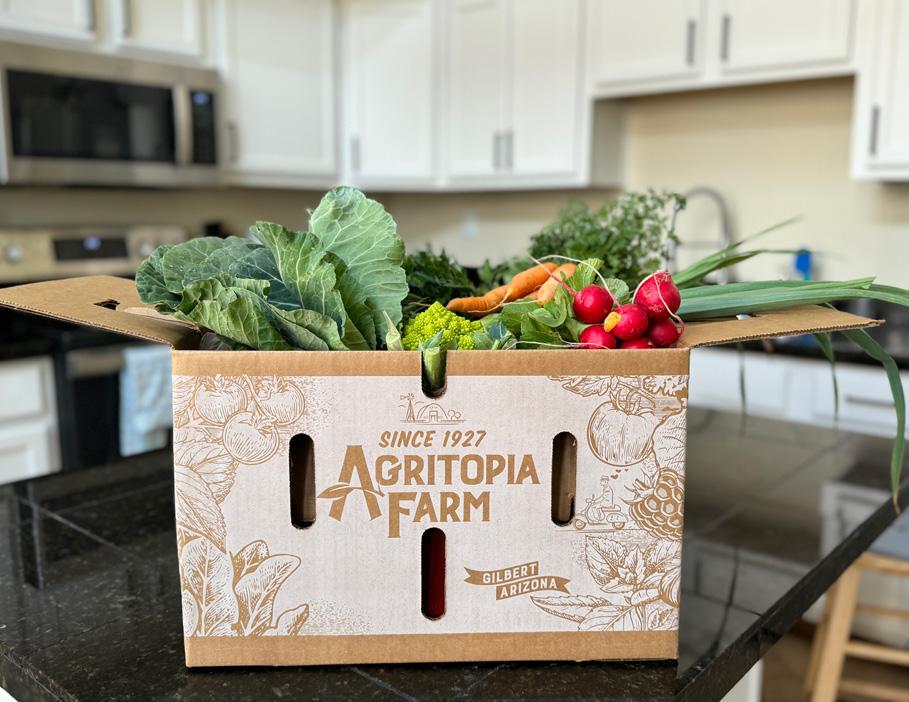
Christy Davis, executive director for the Arizona Urban Agriculture Foundation, says, “A crew that works long hours in the field through all seasons and continues to produce quality crops is worth their weight in gold. We forget sometimes what it takes to grow food but this team knows the hard work that goes into making [Agritopia’s] CSA the best.”
Agritopia’s weekly farm box program ensures community access to fresh produce while promoting recycling to minimize environmental impact. www.agritopiafarm.com/farmbox-membership


Natural Grocers, founded by Margaret and Phillip Isley in 1955, has grown into a family-operated, health-focused grocery chain now run by second and third generations of the Isley family. The company’s success is attributed not only to the founding family but also to their dedicated crew, vendors, partners, and loyal customers.
Known for their commitment to quality, variety, cost points, and peace-of-mind when it comes to animal welfare, Natural Grocers offers a range of popular products. Their 100% organic Apeel-free produce is a consistent favorite, with seasonal standouts like blueberries and peaches. Other customer favorites include Force of Nature Grass-Fed Ancestral Regenerative Ground Beef, Alec’s Organic Ice Cream, and freerange eggs. They also have an extensive variety of supplements and beauty and body care products.
Sustainability is at the core of their business model. The company’s “Bring Your Own Bag” initiative eliminates mountains of single-use plastic waste while supporting local food security programs. Natural Grocers’ tagline emphasizes, “From the smallest detail to the largest, we will, and always have been, your original good4u Grocers.” www.naturalgrocers.com
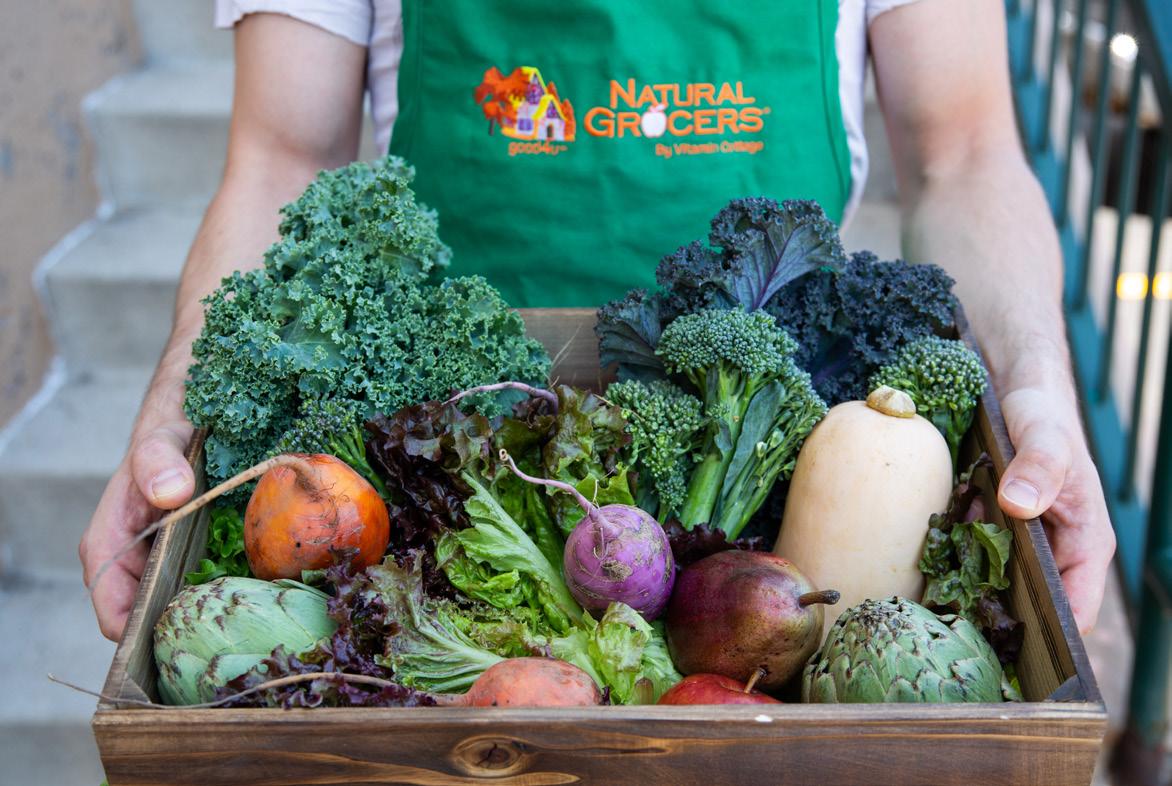
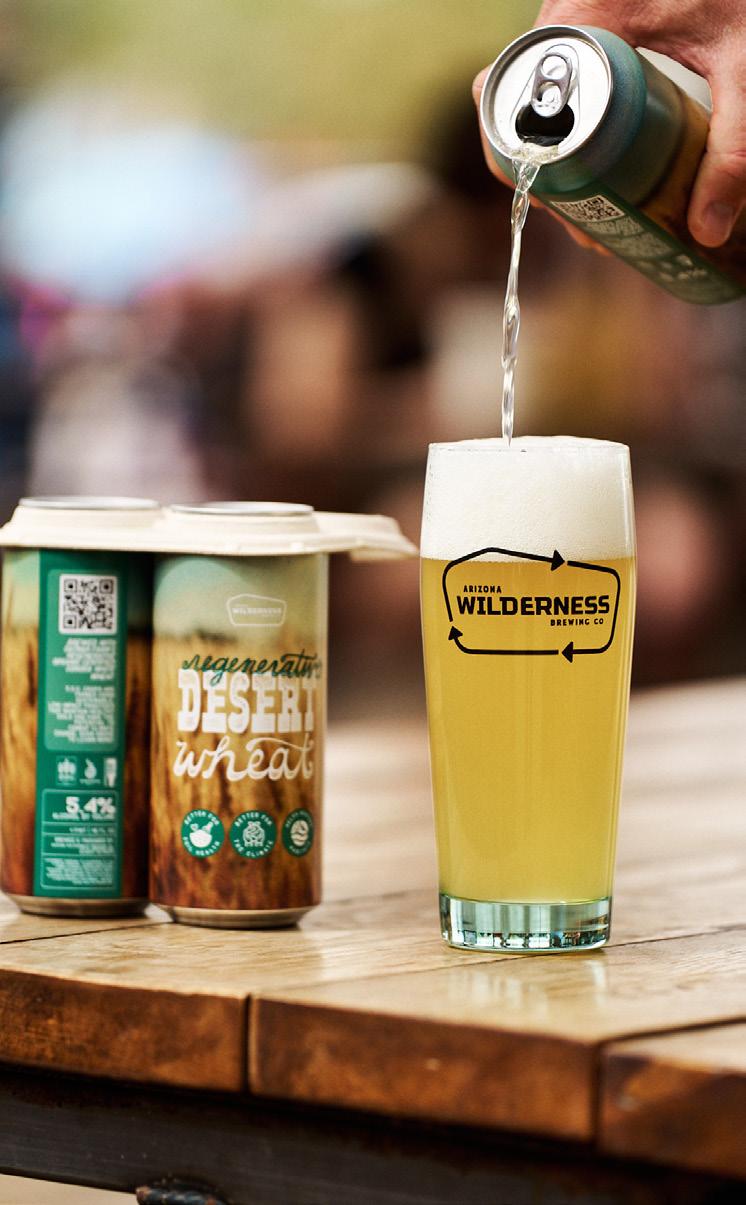
“Arizona Wilderness started from a dream on a backpacking trip while enjoying a craft beer,” says Jon Buford, co-founder and CEO of Arizona Wilderness Brewing Co. In September 2013, that dream became a reality, and Arizona Wilderness quickly became a prominent force within the craft beer industry. Recognized as the "Best New Craft Brewery in the World" by Rate Beer in 2014, the brewery has expanded significantly, now employing over 180 people and remaining committed to its core values of the environment, people, beer, food, customers, and community.
Sustainability is at the heart of all of Arizona Wilderness' operations. The brewery sources its malt barley from Sinagua Malt, a collaboration with the Nature Conservancy, contributing to water conservation efforts in the Verde River. Additionally, the brewery partners with R.City to compost food and utensil waste, thereby reducing landfill waste.
Buford says, “I believe it's the only way to a sustainable future for large cities. We must put more infrastructure into composting and less into landfill waste!”
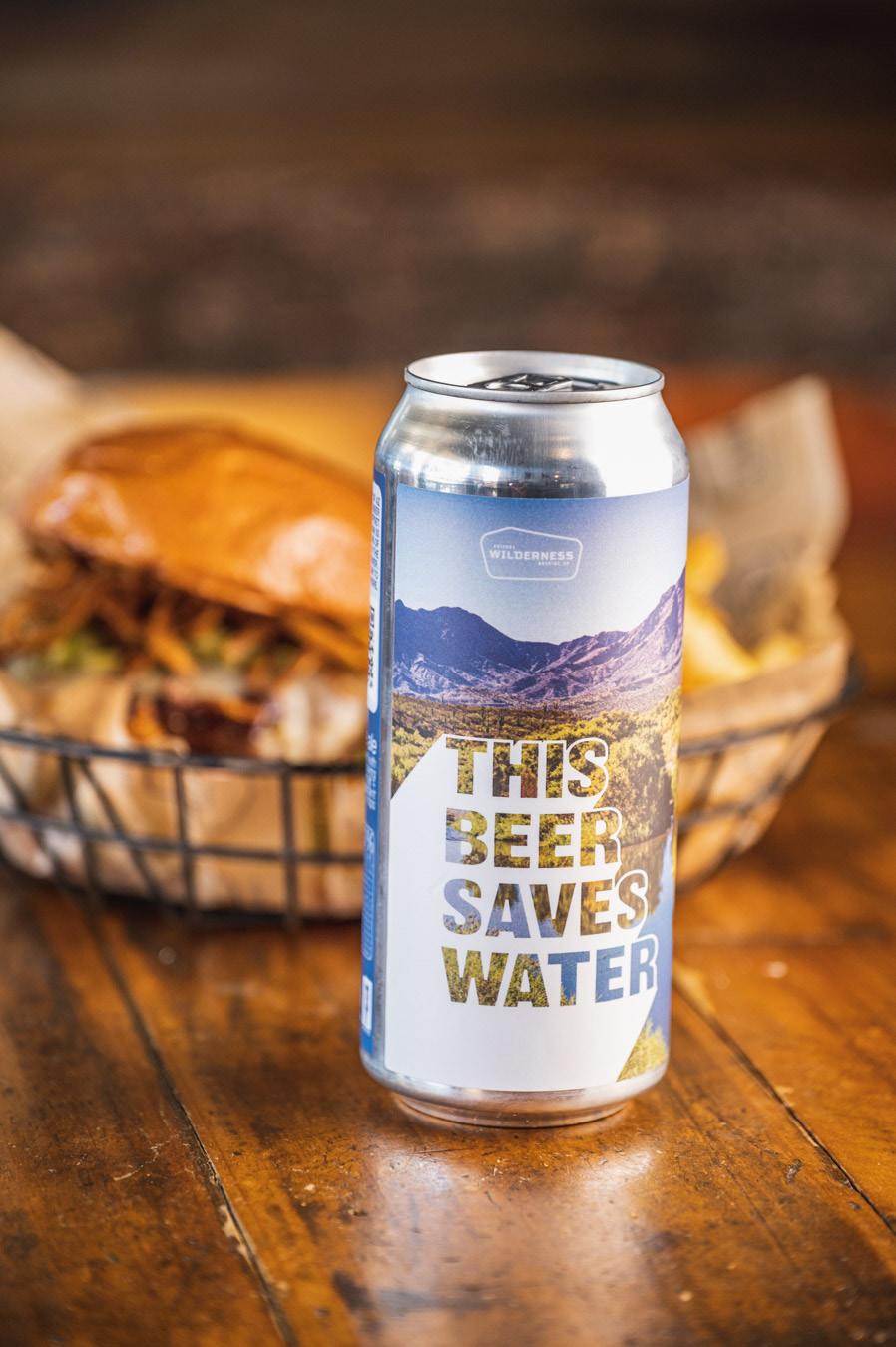
Local sourcing is another key focus. Arizona Wilderness proudly supports local farmers and producers, including AZ Grass Raised Beef, Terra Farm Waygu, Mary's Chicken, Frite Street, Steadfast Farm, Duncan Farms, and Oatman Farms — the first and only regenerative organic farm in the Southwest. This commitment to local ingredients not only supports the local economy but also ensures the freshest and highestquality products.
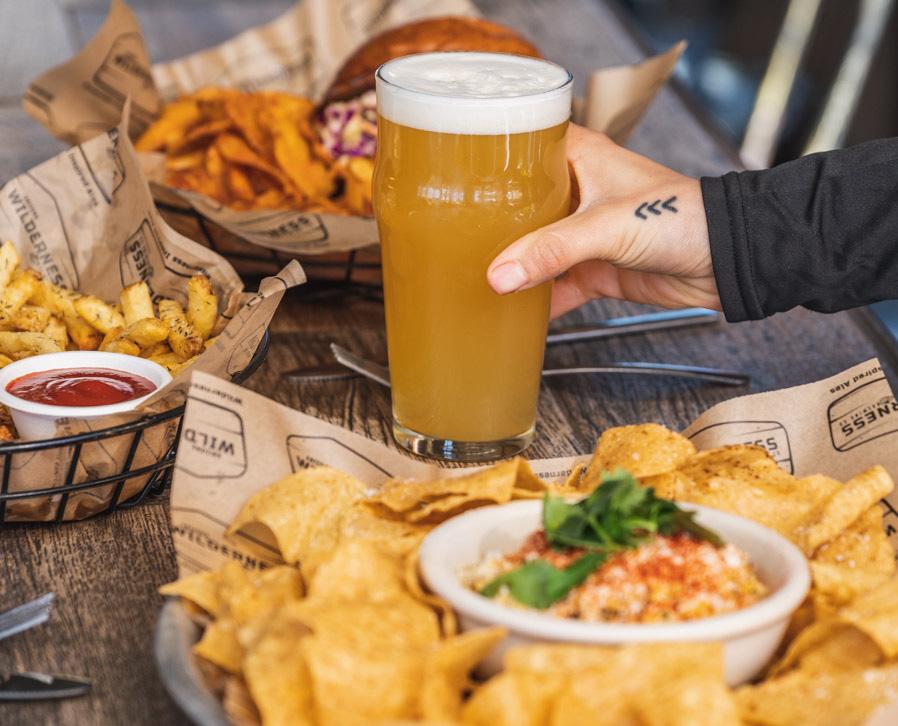
Arizona Wilderness has become more than just a brewery: It's a celebration of Arizona's unique culture, agriculture, and natural resources. Through its dedication to sustainability and local sourcing, the brewery continues to make a positive impact on the community and the environment.
Says Buford, “We like to think that we're building our menu around Arizona.” www.azwbeer.com
Founded in 2014 by Summer Rose and Mike Sanders, Local Juicery has become a beloved destination for health-conscious individuals in Sedona and Flagstaff. Born from humble pop-up shops and a passion for healthy living, Local Juicery emphasizes fresh, locally sourced ingredients in its organic smoothies and cold-pressed juices.
"Our mission is to provide our community with wholesome, nourishing options that support a healthy lifestyle," says founder Summer Rose. This dedication is reflected in their popular offerings, such as the Humble Warrior Smoothie, combining almond milk, banana, cold brew coffee, CBD, and raw cacao for a perfect balance of energy and calm.
"We source 99% of our ingredients organically and work with local producers to reduce our carbon footprint," Summer explains. The juicery uses eco-friendly packaging and ensures that compost is collected by a local farmer.
Local Juicery has expanded, including a new sister Wildcraft Kitchen in Uptown Sedona, welcoming both locals and visitors to experience the transformative power of plant-based foods and vibrant organic juice. www.localjuicery.com
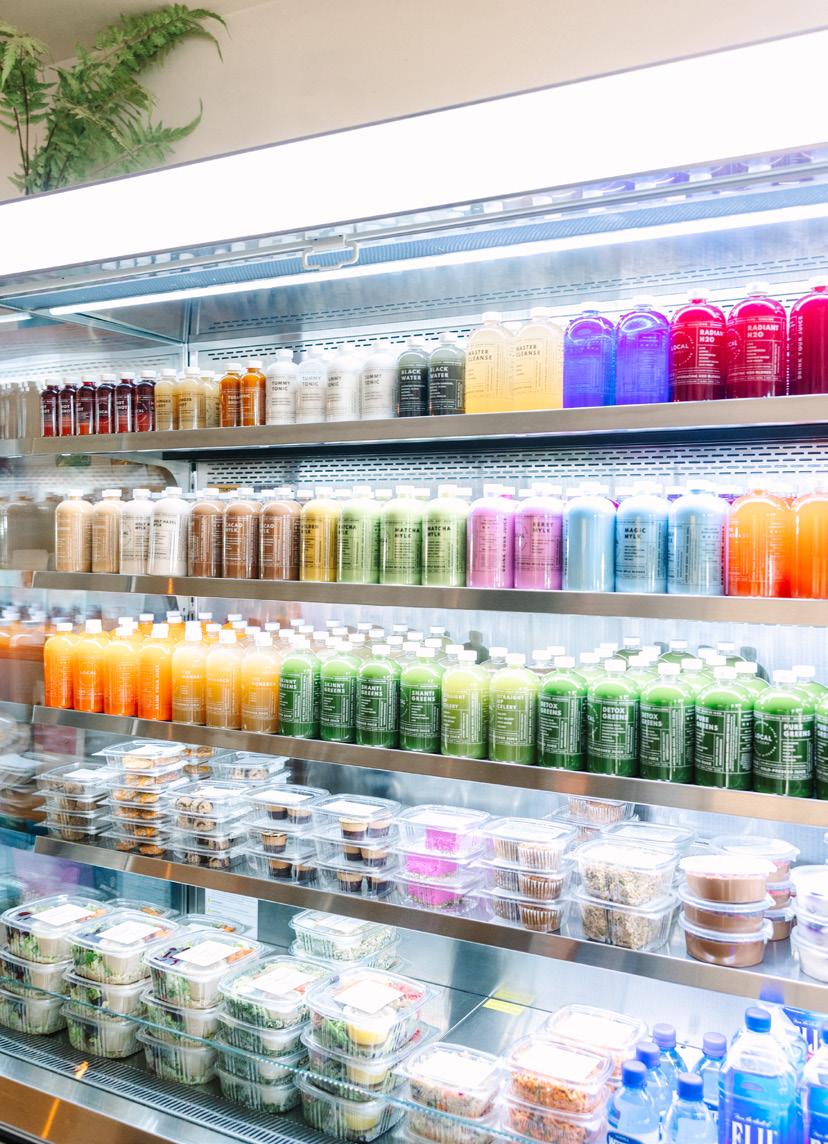
Sedona’s ChocolaTree was founded in 2008 with a passion for creating a nurturing space inspired by love. The café's vision was fueled by co-founder Radhika Jen Marie’s personal health journey and a desire to offer a safe and supportive environment for others.

She says, “I was incredibly inspired by my personal health recovery, embracing food as medicine. I wanted to create a safe and nurturing space that people could trust. So much of what is offered these days might be flavorful or tasty but leads to serious health challenges or worse.”
Known for its delicious chocolate, desserts, and unique beverages, ChocolaTree prides itself on using only organic ingredients and supporting local artisans. The café's onsite garden and friendly staff are also highly praised by customers.
Beyond its food and drink offerings, ChocolaTree is committed to sustainability and social responsibility. The café sources organic ingredients, composts on-site, and works to be as close to zero-waste as possible. ChocolaTree is also actively involved in environmental preservation, partnering with the Mother Earth Restoration Trust to protect the Verde River Headwaters, a vital source of water for Arizona's flora and fauna. www.chocolatree.com
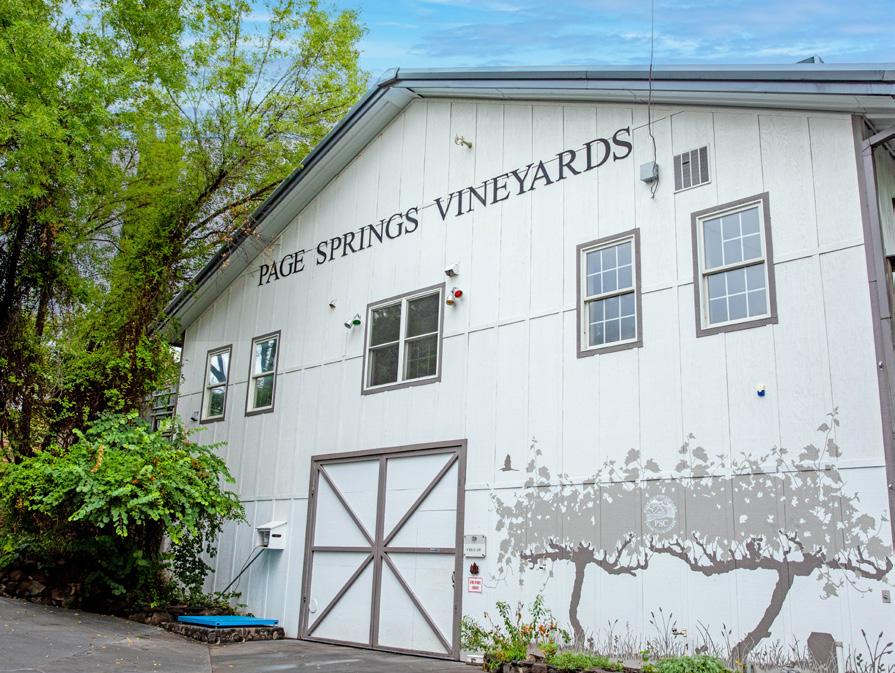
From its inception in 2004, Page Springs Cellars has been deeply committed to environmental stewardship and community well-being. As one of Arizona’s top wine producers, its mission has always been to create exceptional wines while minimizing environmental impact. For founding winemaker Eric Glomski, this commitment is more than just words; it's a guiding principle that informs every aspect of operations at Page Springs.
“I have never understood why people put profit in front of sustainability, or the accumulation of wealth in front of the land that sustains us,” says Glomski. “To me, this is a basic ethic, as basic as the Golden Rule. There is nothing special about what we do…It’s just doing what is right.”
Over the years, Page Springs has invested significant resources into sustainable practices, striving to balance profitability with environmental responsibility. The list of Page Springs’ sustainability initiatives is long, making it a natural winner in its Best of Arizona category. Key initiatives include a 125-kilowatt solar system that generates all of the winery’s electricity on-site; a wastewater treatment system to process wastewater from the winery, tasting room, and bistro to minimize the impact on local water resources; composting programs for food scraps and organic winemaking byproducts; recycling stations throughout the property; sustainable packaging options; and habitat preservation initiatives to maintain portions of the property as a natural habitat to support biodiversity and preserve local ecosystems. www.pagespringscellars.com
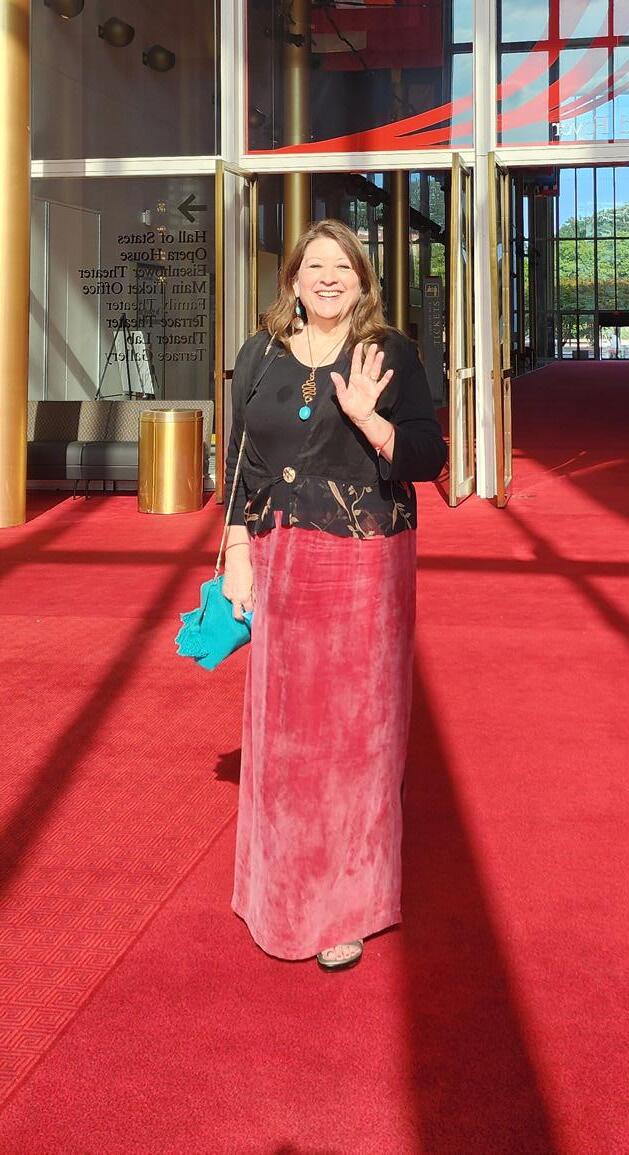
Tammy Bosse is celebrating 23 years of her residential real estate brokerage in the Greater Phoenix area, and is also celebrating her title as a threetime winner in this category. As the driving force behind her business, Tammy offers personalized care and expertise to help clients achieve their real estate goals while promoting environmental responsibility. Her approach incorporates energy audits, efficiency analyses, and improvement opportunities into the property search process.
Tammy’s expertise in green features stems from her National Association of Realtors GREEN designation, PEARL Certification, EcoBroker, and Sustainable Business Advisor Certifications. She has volunteered extensively in environmental initiatives.
“Part of making a high-performance home and saving people money can be adding clean energy, like solar power to the home,” Tammy explains.
She has expanded her services to include solar energy consulting, partnering with Powur Public Benefit Corporation. Tammy’s philosophy reflects her dedication.
“It feels very good to merge my passion to help the planet with my work. I encourage anyone who has a business to explore options to find ways to incorporate eco-conscious practices into their products and services.” www.bossproperties.com
Isabel Dellinger Candelaria, the founding principal of Earth & Images, has been a driving force in sustainable interior design for over 30 years. The firm, based in Phoenix, emphasizes the beauty of storytelling through design, transforming spaces into meaningful environments that reflect clients’ values and lifestyles.
Sustainability is at the heart of their approach. Isabel, alongside Principal Designer Nikka Rochniak, believes in the power of found objects, stating, “Incorporating unique pieces not only adds individuality to a space but also honors the stories they carry.”
This philosophy is evident in their designs, where existing elements are preserved and repurposed to create warmth and charm. Isabel explains, “We take a ‘ginger touch’ when remodeling, opting to keep original features like oak plank floors instead of replacing them with wider, trendier options. This not only reduces waste but enhances the character of the home.”
Earth & Images provides comprehensive design services, with a commitment to creating beautiful, sustainable, purposeful spaces. www.earthandimages.com

Blue Sky Homes, founded by Nick and Adralyn Blue, is leading the way in sustainable home building in the Phoenix area. This “Smart and Green” real estate development company creates eco-friendly residences that prioritize energy efficiency and environmental responsibility without sacrificing style or comfort.
“We believe that building green homes is essential for a sustainable future,” says Nick Blue.
The company’s commitment to innovative design and sustainable practices is evident in every aspect of their work. Blue Sky incorporates advanced technologies and sustainable materials to minimize environmental impact while maximizing comfort and efficiency. The company believes in community through design, incorporating familyfriendly front yard patios and outdoor living spaces.

Each Blue Sky Home features solar panels, energy-efficient appliances, and eco-friendly insulation, ensuring a reduced carbon footprint. On average, Blue Sky’s certified homes perform 50% more efficiently than standard new builds, resulting in significantly lower utility bills for homeowners.
Blue Sky Homes’ approach also extends beyond individual homes to entire communities as they carefully select subdivision and home sites with the goal of giving homeowners the opportunity to walk or bicycle comfortably to nearby amenities, promoting a higher quality of life and stronger community connections. www.blueskybuilt.com
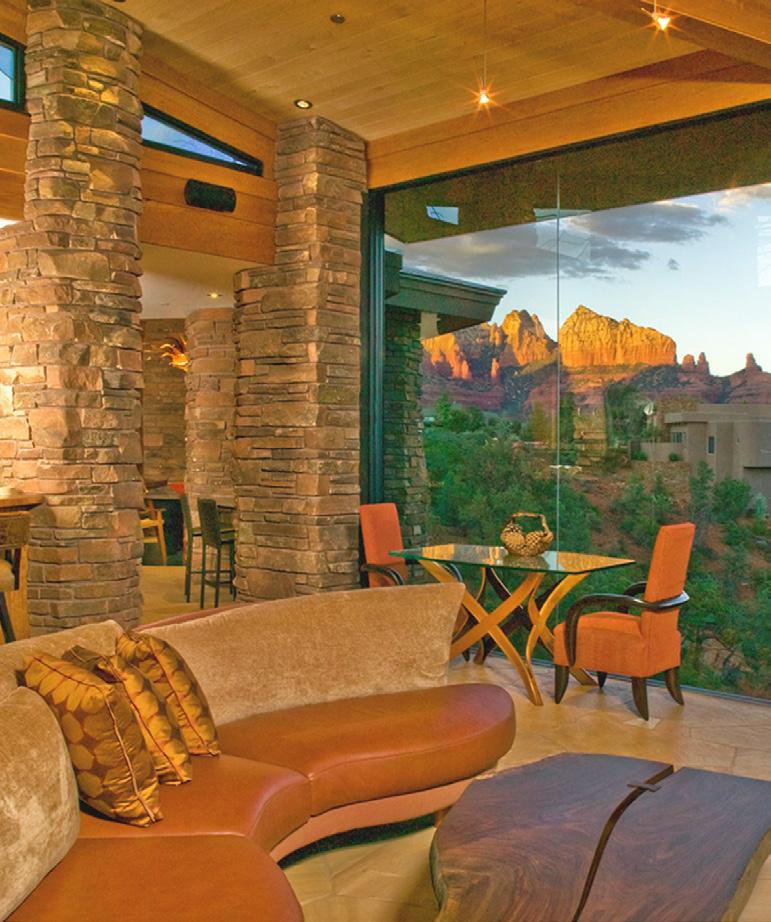
Design Group Architects, led by Max Licher, has been a cornerstone of sustainable architecture in Sedona since 1981. The firm is renowned for its commitment to creating environmentally friendly, functional, and inspirational spaces that harmonize with the southwestern landscape.
“We believe in designing homes that not only respect the natural environment but also enhance our clients’ lifestyles,” says Licher.
The firm’s approach involves a deep understanding of both natural and urban contexts, ensuring that each project is thoughtfully integrated into its surroundings. A client-focused approach, combined with a passion for sustainable design, has led to the creation of homes that are both beautiful and eco-conscious. The firm specializes in green building practices, using sustainable materials and energy-efficient technologies to minimize environmental impact.
Licher emphasizes the importance of sustainability, stating, “Our goal is to create homes that are not only aesthetically pleasing but also contribute positively to the environment.”
By focusing on sustainable design principles, Design Group Architects continues to set the standard for ecofriendly architecture in Sedona, crafting spaces that are as respectful of the earth as they are inspiring to inhabit. www.designgrouparchitects.net
Agave Environmental Contracting, established in 1990 by Mike McMahon, has become a leader in sustainable landscape design and contracting. With a vision to innovate and improve the landscape industry, McMahon leveraged his extensive experience to create a company that prioritizes sustainability and quality service. McMahon notes that Agave’s success is driven by a team-oriented approach, rooted in core principles of communication, proactivity, accountability, training, and process-driven operations. These values are instilled in every employee, ensuring consistent delivery of top-notch services.
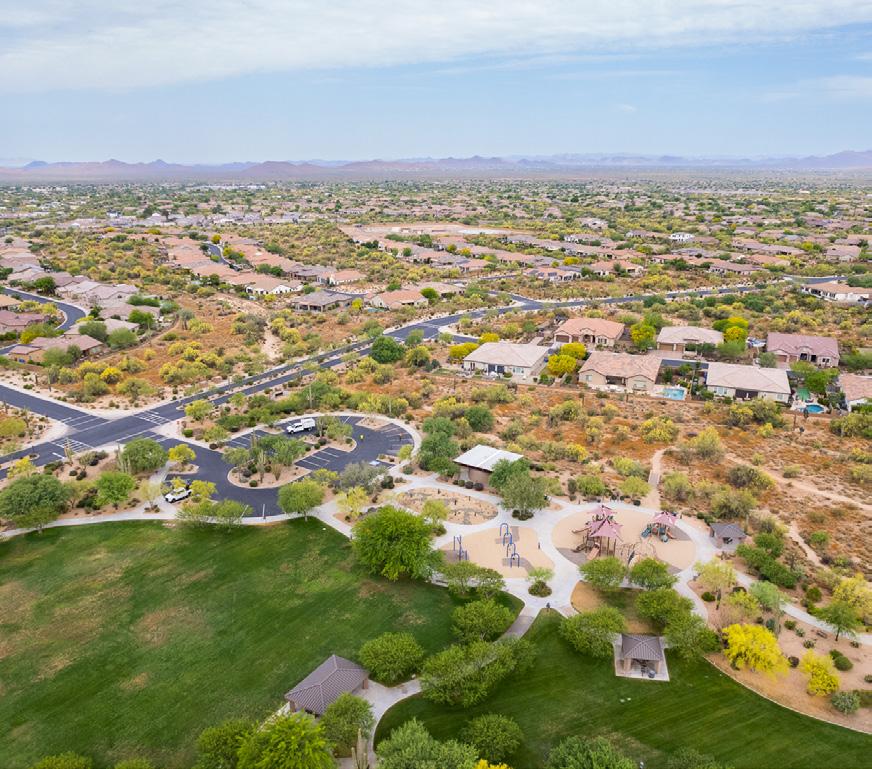
At Agave, a commitment to the environment is key. Agave incorporates electric vehicles into its fleet for high-mileage jobs and incorporates organic materials such as mulch, worm tea, and organic fertilizers in its turf management strategies. Agave works closely with clients to develop efficient water conservation plans, reducing costs and environmental impact. Their arbor care services, provided by Certified ISA professionals, ensure proper tree management and risk mitigation. Agave’s enhancement team identifies and implements landscape improvements, while their construction division collaborates with developers to create sustainable, budget-friendly landscapes. The plant salvage department expertly relocates native plants, preserving local ecosystems. Through these initiatives, Agave Environmental sets the standard for sustainable landscape design. www.agave-inc.com
Nearly 10 years ago, Kathleen Ventura visited a childhood friend in Columbus, Ohio, who subscribed to a residential compost-collection service. Fascinated by the business model, Ventura and her husband, Brock Delinski, launched Compost Crowd in January 2018 to offer northern Arizona a similar service. They started the company out of the back of a Mini Cooper with 10 buckets and lids, a basic website, payment-processing software, and an LLC.
According to Ventura, when food scraps hit the landfill, the anaerobic breakdown of organic matter leads to the emission of methane (a greenhouse gas that has 87 times the global warming potential of carbon dioxide on a 20-year timeline). By diverting food scraps from the landfill, Compost Crowd is not only reducing methane emissions but also returning valuable nutrients to the earth — thereby decreasing erosion, water use, and the need for synthetic fertilizer in agriculture.



Once Compost Crowd became successful in West Sedona, Ventura and Delinski expanded collection services to the Village of Oak Creek, and then to restaurants and events with zero-waste goals.
“In the spring of 2019, Compost Crowd announced a pilot [program] for residential collection in Flagstaff that was met with tremendous reception from the community,” Ventura says. “To date, the Crowd has diverted nearly 600 tons of organic material from the landfill.” www.compostcrowd.com
Peak Scents Plant Based Skincare, established in 1993, is a trailblazer in the natural skincare industry, known for its clean, toxic-free, and cruelty-free products. This woman-owned brand, led by founder DeeAnn Tracy, has consistently set high standards for natural skincare. DeeAnn, a second-generation herbalist and skilled product developer, draws on her education from the Southwest School of Botanical Medicine and her experiences as a Grand Canyon River guide to craft innovative skincare solutions.
Peak Scents’ acclaimed Organic Rose Phyto3 line features a potent blend of plant stem cells, peptides, superfruit extracts, and botanicals and is effective for all skin types. The products address a range of skin concerns, working to soothe and repair delicate skin, deliver deep hydration, and combat aging and environmental damage.
Tracy notes, “Sustainability is at the heart of our mission,” and that the company is committed to ethical and fair-trade ingredient sourcing. Peak Scents prioritizes environmentally responsible packaging by using recyclable glass containers and implementing plastic-free shipping methods. Refill options are currently available at its Flagstaff location, and the company has plans to extend that option online in 2025, reinforcing its dedication to reducing waste and promoting eco-friendly skincare solutions. www.peakscents.com
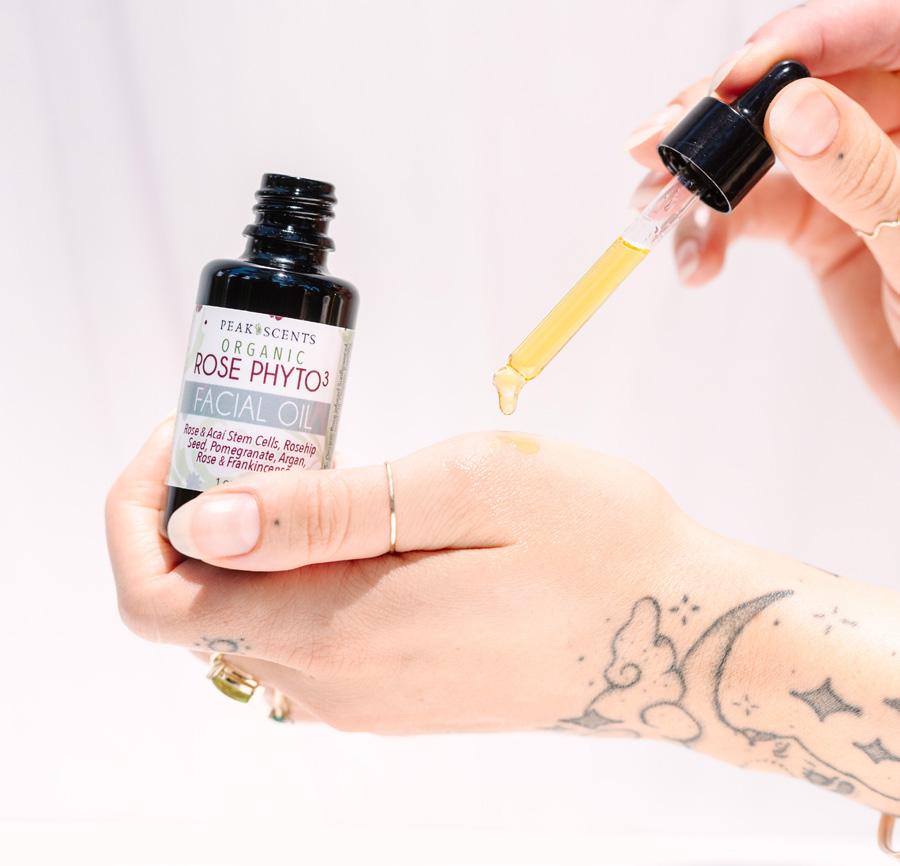
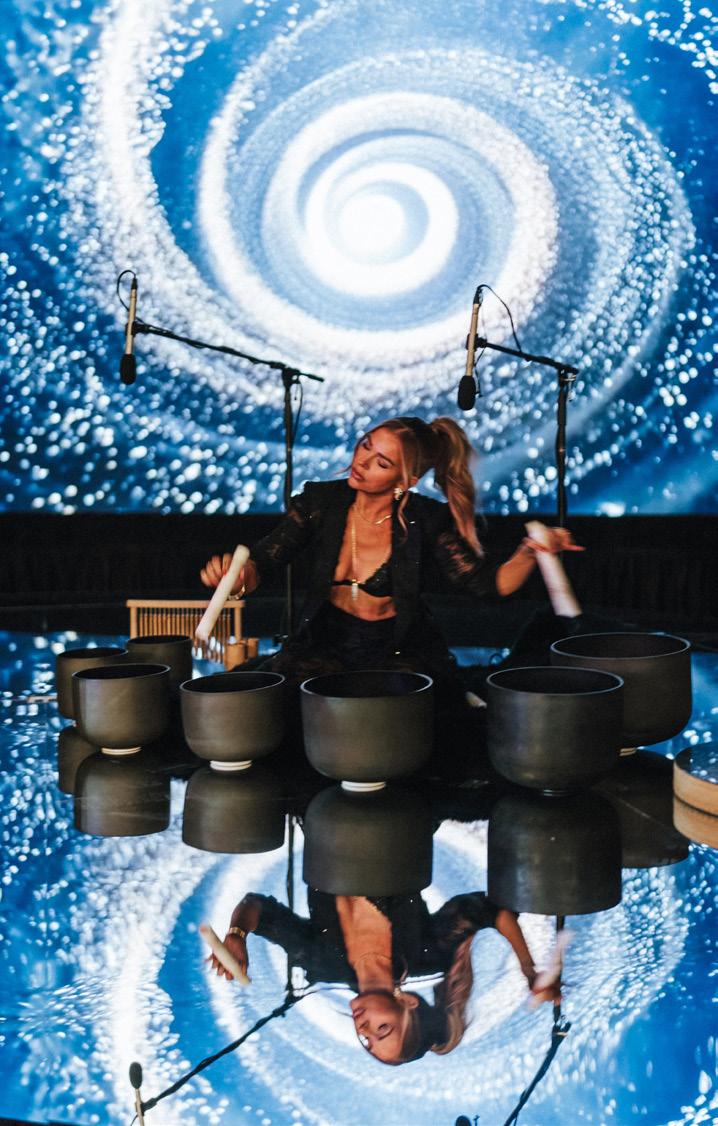
As a two-time winner in her category, sound healer and conscious leadership coach Sam Harper has been busy over the last year. The former co-founder of The Portal in Scottsdale, Harper recently made the conscious decision to step back from her brick-and-mortar studio to allow more access and flexibility into the natural progression of her career.
“I started my sound healing career doing pop-up events all around the Valley, and with the massive expansion and growth of my business, I decided to go back to that model,” Harper says.
That expansion includes facilitating international retreats and mastermind workshops, in addition to being featured as a keynote speaker at events all over the country. As with all good leaders, her growth in business has been led by focusing her attention within herself. She spent much of the summer traveling abroad and summarizes her time away as a deep journey within herself — one of redemption, spiritual death, and rebirth.
She says, “By doing this, I had space and time to process grief I’d been holding onto for many years since battling cancer three times. I came home renewed, with more capacity, and new practices to pass along to my students. Teachers need teachers, and I am a student first.” www.samanthaharper.com
Nestled in the heart of Sedona’s breathtaking Red Rock country, L’Auberge de Sedona is a five-star luxury resort consistently recognized by Condé Nast as the #1 Hotel in the Southwest and West and is renowned for its unique wellness program and luxurious accommodations including Creekside, Garden, and Spa Cottages.
L'Auberge de Sedona is more than just a luxury resort — it's a sanctuary for those seeking a deeper connection with themselves and the natural world.
With its idyllic location, guests can immerse themselves in the serene beauty of Sedona while exploring the healing power of sound and the restorative benefits of nature. The resort’s wellness offerings extend beyond traditional spa services, incorporating the natural surroundings into the experience.
Options include guided meditation sessions, sound healing, and customized yoga classes, all designed to harmonize the mind, body, and spirit. Guests can enjoy outdoor cedar showers under a canopy of sycamore trees, dine al fresco on moonlit balconies, and fall asleep to the gentle sounds of a meandering creek.
"Our goal is to provide guests with transformative experiences that foster inner peace and rejuvenation," says Colm O'Brien, general manager.
The resort's commitment to creating unforgettable moments and fostering intimate connections makes it a true destination for rejuvenation and self-discovery. www.lauberge.com
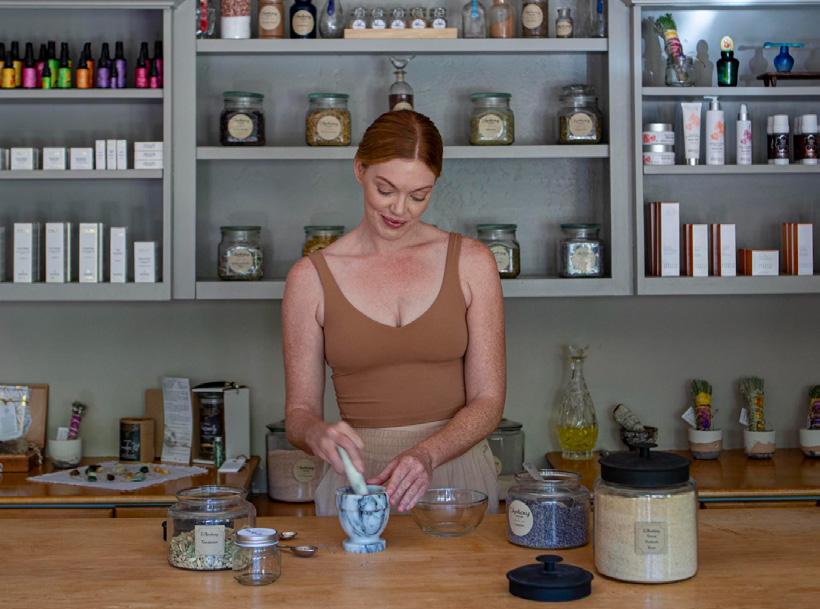
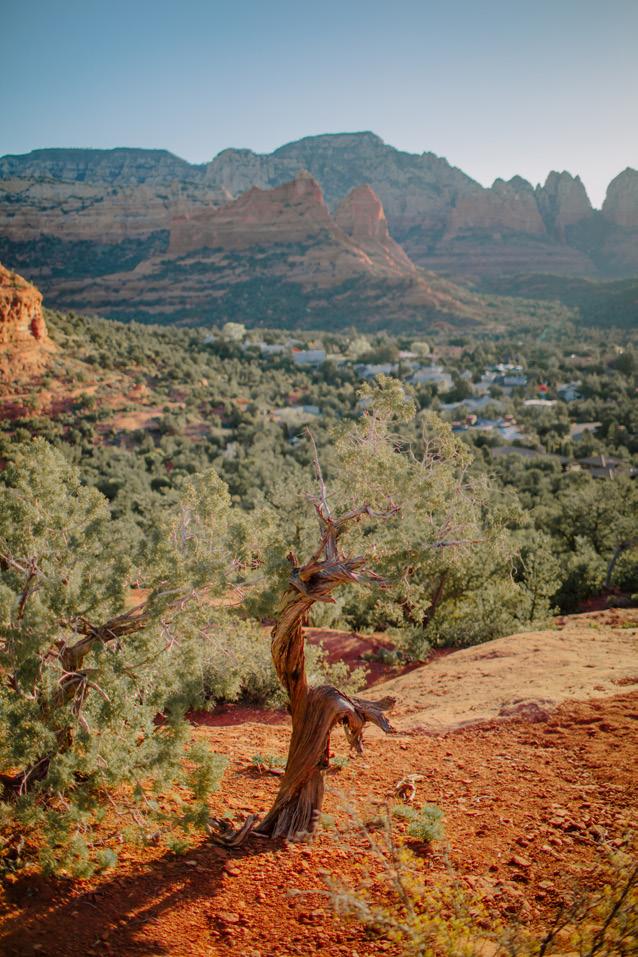
Sedona is widely regarded as the best day trip destination in Arizona, and has won this year’s prize for good reason. Just a short 118-mile drive from Phoenix, this stunning locale offers breathtaking landscapes, a rich cultural scene, and a plethora of outdoor activities that cater to all interests.
Visitors are immediately captivated by the iconic red rock formations that define the area, providing a picturesque backdrop for hiking, biking, and photography. Trails like Cathedral Rock and Devil’s Bridge offer exhilarating hikes with rewarding views, making them must-visit spots for outdoor enthusiasts. For those seeking a more leisurely experience, Red Rock Scenic Byway showcases the area’s natural beauty, winding through captivating vistas.
Sedona is a hub for art and spirituality, featuring numerous galleries, shops, and wellness centers that reflect its vibrant culture. The town is famous for its energy vortexes, attracting those interested in holistic healing and meditation.
Dining options abound, with local eateries serving fresh, organic cuisine that highlights the region’s culinary diversity.
Whether you’re looking for adventure, relaxation, or cultural enrichment, Sedona provides an unforgettable experience. Its unique blend of natural beauty, outdoor recreation, and artistic flair makes it the perfect Arizona day trip destination for all. www.visitsedona.com
With a mission to create affordable, high-quality bikes to make sustainable transportation available to everyone, Lectric eBikes was founded in 2019 by childhood friends Levi Conlow and Robby Deziel. The pair’s efforts are rooted in the knowledge that more than half of all car trips in America are less than three miles and 28% of all car trips are less than one mile. Lectric eBikes strives to design and build eBikes that can replace these types of short car trips, offering a wide range of models including cargo eBikes that can haul 450 pounds.
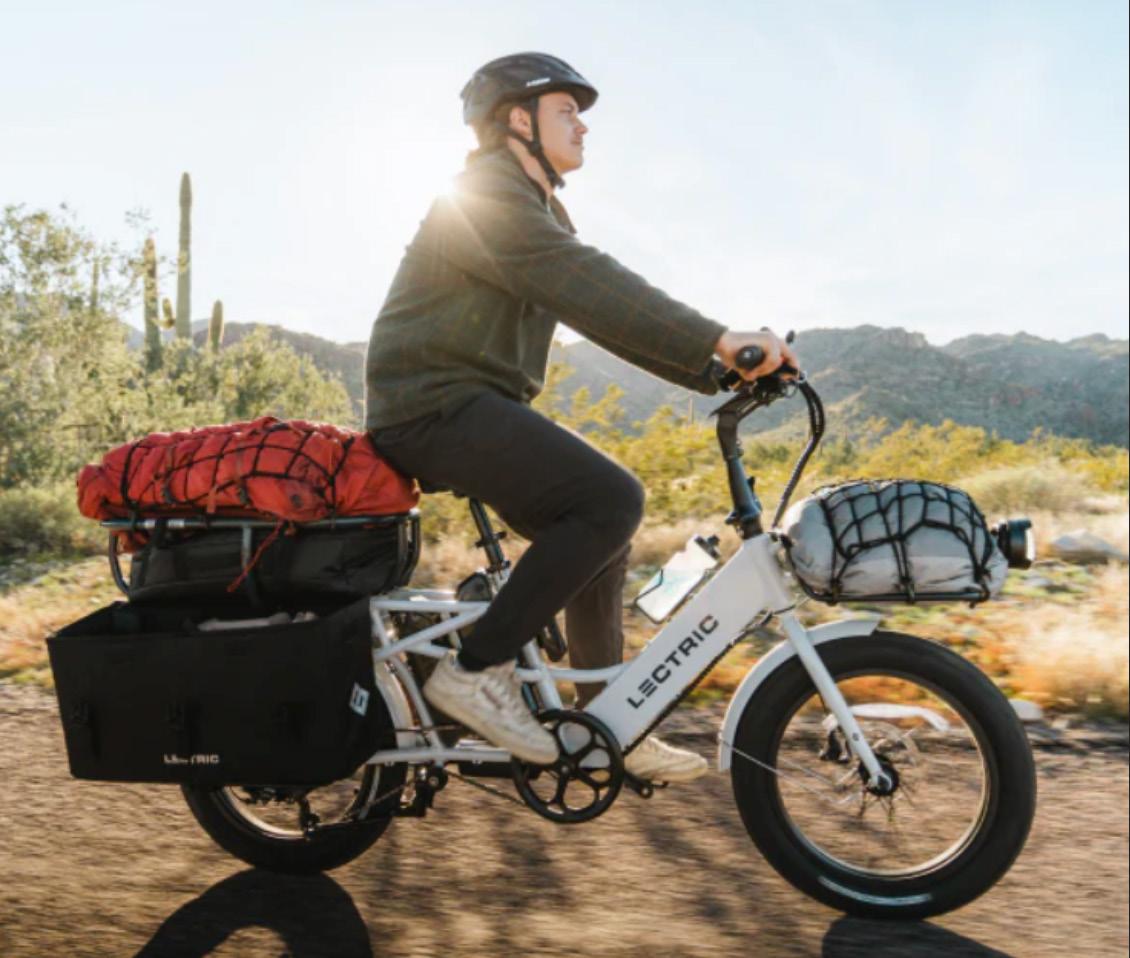
Driven by their passion for eBikes and their commitment to sustainability, Lectric has quickly become a leading player in the industry, selling more than 450,000 eBikes in its first five years of operation. The company’s success is largely attributed to innovative design, competitive pricing, and a steadfast focus on customer satisfaction. It’s no wonder this incredible company has won Green Living’s Favorite Electric Transportation Brand two years in a row. Impressively, its best-selling model, the Lectric XP, is ranked as the third-most popular EV in America, just behind the Tesla Model 3 and Model Y. www.lectricebikes.com.
When Ann Siner first opened My Sister’s Closet in 1991 at The Shops at Town & Country in Phoenix, it was to offer consigners a level of service and convenience that other small resale stores did not. Furthermore, she focused on creating a shop that was cute, clean, and current. Consigners and customers responded well to the business idea, and over the years, Siner expanded My Sister’s Closet into Scottsdale, North Scottsdale, Chandler, and San Diego. She also opened Well Suited for men and My Sister’s Attic for home furnishings and furniture.
In addition to offering a way to upcycle fashion goods, My Sister’s Closet donates unsold items to thrift stores (such as the nonprofit My Sisters’ Charities, plus thrift stores for the Arizona Humane Society and Helen Woodward Animal Center in the San Diego area). Items that don’t sell at the thrift stores are sent off for recycling. “We’ve raised literally millions of dollars for nonprofits through these thrift donations,” Siner says.
My Sister’s Closet also has eliminated single-use plastic in its office and at all of its stores. “That means no plastic shopping bags [and] no plastic water bottles,” Siner says. “All employees are given a reusable water vessel, and every store has an Elkay water filter system.” www.mysisterscloset.com

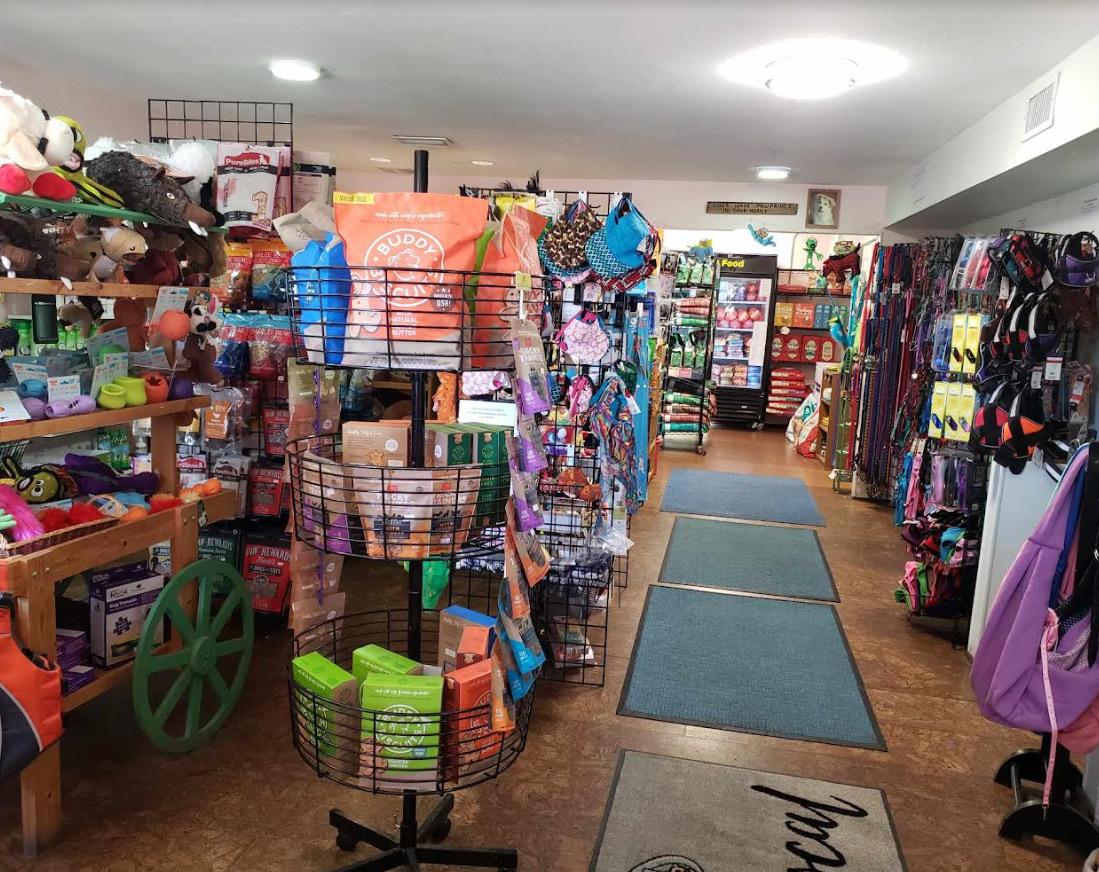
After working together to rescue dogs in 2002, Nadia Caillou and Angela Windolph created Golden Bone Rescue and Rehab, Inc., followed by Golden Bone Pet Products in 2005. The duo originally opened in Camp Verde, but the shop has been in its current location in West Sedona since 2016. While Caillou passed away in 2019, Windolph continues to run Golden Bone Pet Products with store manager Ana Rivas and sales associate Duane Miles.
“We know that not every food is perfect for every dog or cat, so we help our customers to make educated choices that will give their pets the best possible nutrition, [thereby] enhancing their lives,” Windolph says.
In addition to offering pet food brands like Open Farm, Farmina, Carna4, My Perfect Pet, The Simple Food Project, Canine Caviar, and Nutrisource, the company also carries a large selection of health supplements, training solutions, and outdoor recreational needs. The shop also offers a selection of toys that are focused on durability and sustainability, plus safety collars, leashes, and harnesses.
“Golden Bone Pet Products has always carried products from companies who are also committed to sustainability, ethical and humane sourcing, and eco-friendly manufacturing,” Windolph adds. www.goldenbone4pets.com
Desert Refillery, founded by Kyle and Tiffany Walters in 2021, began as a zero-waste refill shop at a farmer’s market before evolving into a brick-and-mortar store. Their mission is to make sustainability accessible and beautiful for the Phoenix community. The couple’s passion for nature and environmental conservation drives the business alongside their family of four.
Tiffany says, “We partner with local businesses and community members to create spaces where sustainability is a seamless part of daily life.”
Desert Refillery features over 50% local products and utilizes 100% closed-loop practices. “Closed-loop” refers to a system where waste is minimized by reusing materials and products, ensuring that resources are recycled back into the production process rather than ending up in landfills. Popular products include their concentrated liquid laundry detergent, hand soap, dish soap, and shampoo bars. They recently launched consignment clothing.
Kyle explains, "Our products are unique because they're staples. We're helping make it easy to say no to single-use plastic and refill the containers you already have.”
Tiffany notes, "It's not easy and costs more in labor and effort, but it's important for our planet's future." www.desertrefillery.com
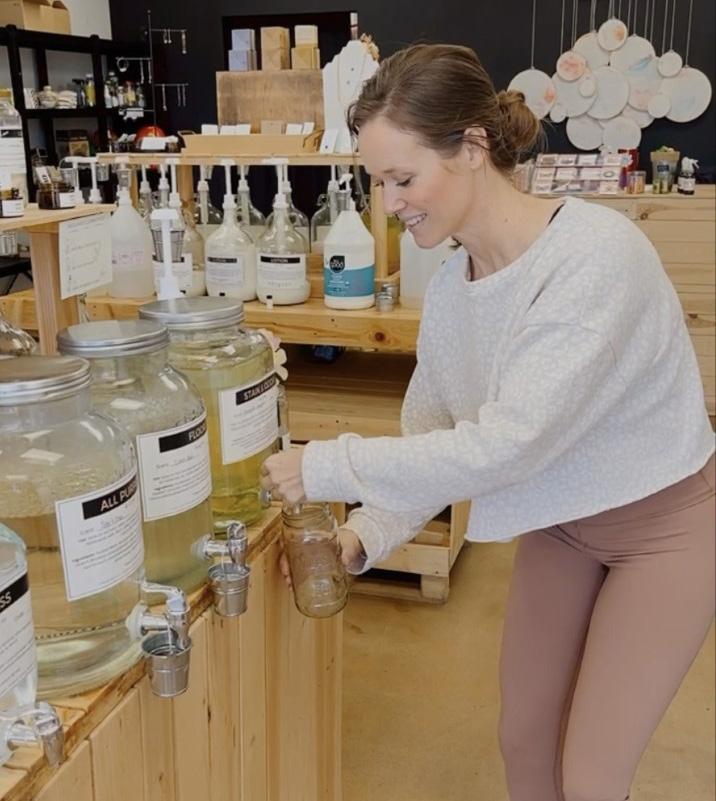
Two Intel engineers, Russ Patzer and Joe Messner, founded Sun Valley Solar Solutions in 2006 after a flight into Phoenix revealed a lack of solar panels on the rooftops below.
“How strange,” they thought, “for a city that averages more than 300 sunny days every year.” Inspired, they scratched out a business plan on the back of a napkin to harness Arizona’s most abundant natural resource and change how people power their lives.
Today, Sun Valley Solar Solutions is one of the most accredited and celebrated solar installation teams in the United States. The company — an APS Qualified Technology Partner and an SRP Preferred Solar Installer — also holds an A+ rating with the Better Business Bureau and was selected as a Top Solar Contractor by Solar Power World for nine years in a row. Since its founding, Sun Valley Solar Solutions has helped thousands of homeowners and businesses turn Arizona’s most abundant natural resource into immediate savings, all while helping to build a greener, more sustainable energy future. www.sunvalleysolar.com

In coordination with tournament hosts The Thunderbirds, WM has taken a zero-waste approach to its flagship event — the WM Phoenix Open — since 2013. As a result of recycling and composting, more than 15.17 million pounds of material has gone to its next best use over that time. Hosting one of the largest certified zero-waste sporting events for 11 years running, WM has proven that circularity issues, such as materials management, emissions, energy, and water usage, can be addressed in meaningful and impactful ways.
At the WM Phoenix Open, fans may be surprised to find a lack of trash bins. Instead, there are 4,800 recycle and compost bins on the course, and all on-site vendors adhere to strict sustainability requirements to ensure that only recyclable or compostable materials are used. At the 2023 tournament, WM collected 241.7 tons of composted materials and 777.4 tons of recycled materials.
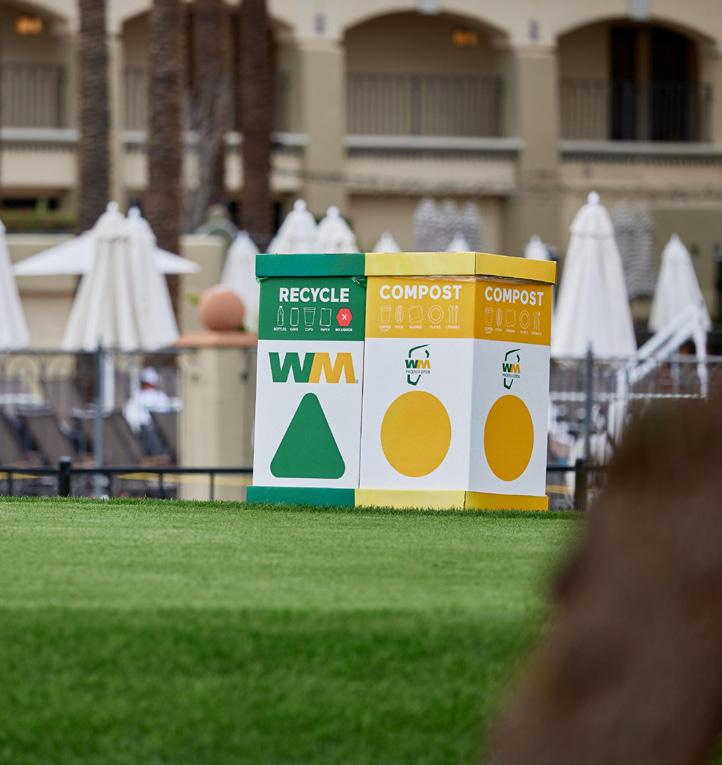
WM and the Thunderbirds also partner with Change the Course to drive awareness around water conservation and to restore water directly to Arizona rivers and communities. Now in its ninth year, this initiative has restored more than 400 million gallons of fresh water to Arizona ecosystems and communities. Additionally, the WM Phoenix Open Working For Tomorrow Fund, which began in 2024, directly supports emissions reduction, sustainable materials management, and water management projects and initiatives in Arizona. In 2025, WM will celebrate its 16th year as title sponsor of the Phoenix Open. www.wmphoenixopen.com
Arizona State University established the world’s first School of Sustainability in 2006. Now, for the fifth consecutive year, ASU has ranked No. 1 in the United States — and top 10 globally — for its work through education, research, and practice in alignment with the United Nations’ Sustainable Development Goals. The school, which resides within the College of Global Futures, offers degrees focused on sustainability, sustainable food systems, sustainable leadership, sustainable solutions, sustainable energy, and more.
Offering a transdisciplinary approach in its curriculum, the School of Sustainability addresses a broad spectrum of global challenges such as energy, materials and technology; water quality and scarcity; international development; ecosystems; social transformations; food and food systems; and policy and governance. School of Sustainability students work with faculty and researchers toward a common goal: to foster innovative

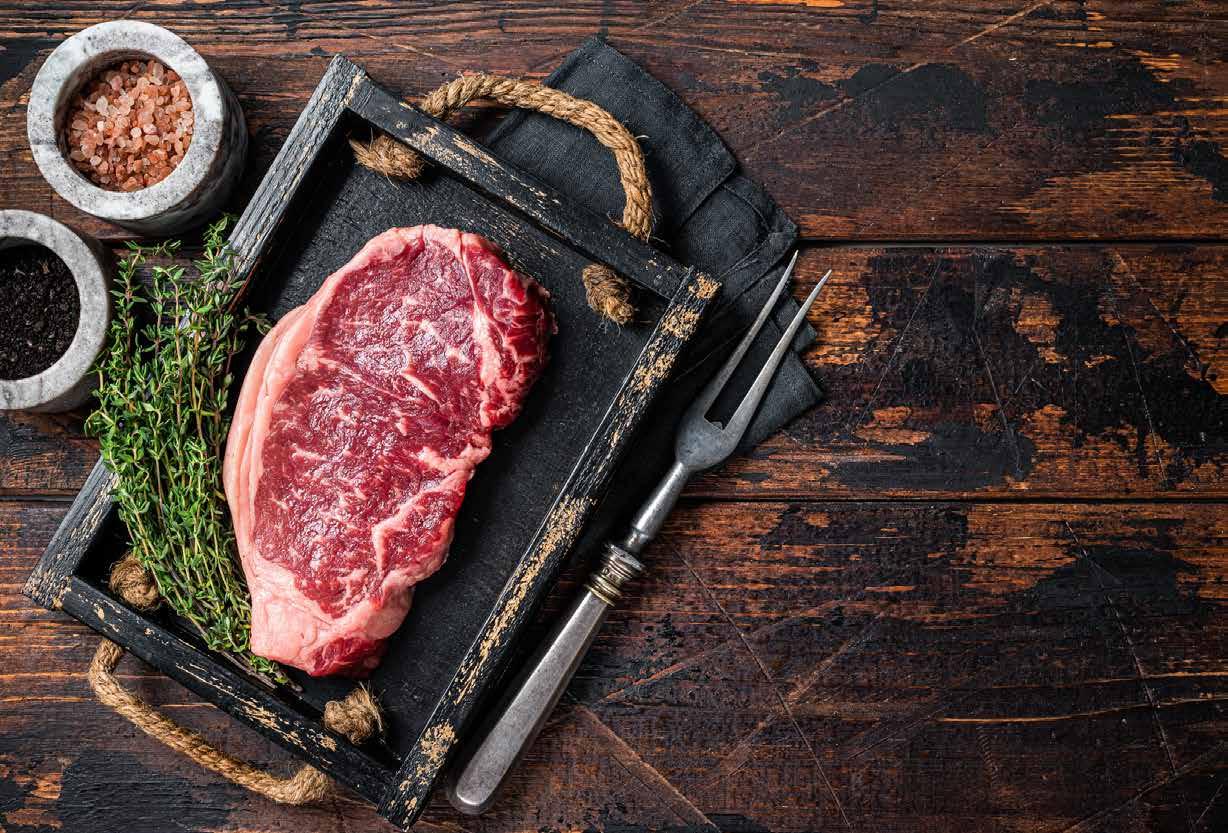

Sedona residents Kate Blevins, Rayna Griffin, and Sandy Moriarty founded Sedona Recycles, Inc. (SRI), in 1989, and the organization received nonprofit status in 1990. In 1994, the Arizona Department of Environmental Quality awarded SRI a $75,000 grant to construct the company’s material recovery facility in Sedona. Thanks to the help of community volunteers, the facility was completed in 1995 using recycled building materials. SRI now services and maintains four free-to-the-public 24/7 drop-off sites with a staff of 12 full- and part-time employees. In addition to offering recycling resources, SRI also educates the public about recycling.
SRI works hard to incorporate sustainability within the organization. In 2012, SRI installed 6kW solar panels on its roof to generate much of its own electricity. Additionally, SRI’s recycling drop-off sites now have clothing recycling bins from the Yavapai County Big Brothers and Big Sisters to keep textiles out of the landfill.
In 2000, SRI partnered with Rainbow Acres — a community for adults with disabilities — to offer employment to its residents. In 2010, after 21 years of service to Sedona and the Verde Valley, the Arizona Recycling Coalition named SRI as Recycling Nonprofit of the Year, and the Sedona Community Foundation Spirit of Sedona Awards also named SRI as Nonprofit Organization of the Year. www.sedonarecycles.org
Salt River Project (SRP), founded more than 120 years ago, has continued to grow responsibly over the years — all while providing low-cost, reliable power and water to the Phoenix metropolitan area. The utility company continues to plan for a sustainable future, aiming to achieve its ambitious 2035 sustainability goals to reduce carbon emissions, increase energy efficiency and electrification, conserve water, and improve forest health.
“SRP’s 2035 goals incorporate sustainability into all aspects of our business and will lead us to further innovate, partner, and challenge the status quo as we work to deliver reliable, affordable, and sustainable water and power in one of the fastest-growing areas of the nation,” says Bobby Olsen, associate general manager and chief planning, strategy, and sustainability executive at SRP.
Today, SRP serves customers with more than 2,800 MW of carbon-free energy resources, including more than 1,400 MW of solar, nearly 1,300 MW of battery and pumped hydro storage, and approximately 300 MW of wind energy. SRP also has significantly more solar energy capacity under development and more than 1,100 MW of battery storage resources supporting the power grid. Through its Integrated System Plan, SRP is committed to at least doubling the number of generating resources on its power system in the next 10 years as the company retires 1,300 MW of coal resources. www.srpnet.com
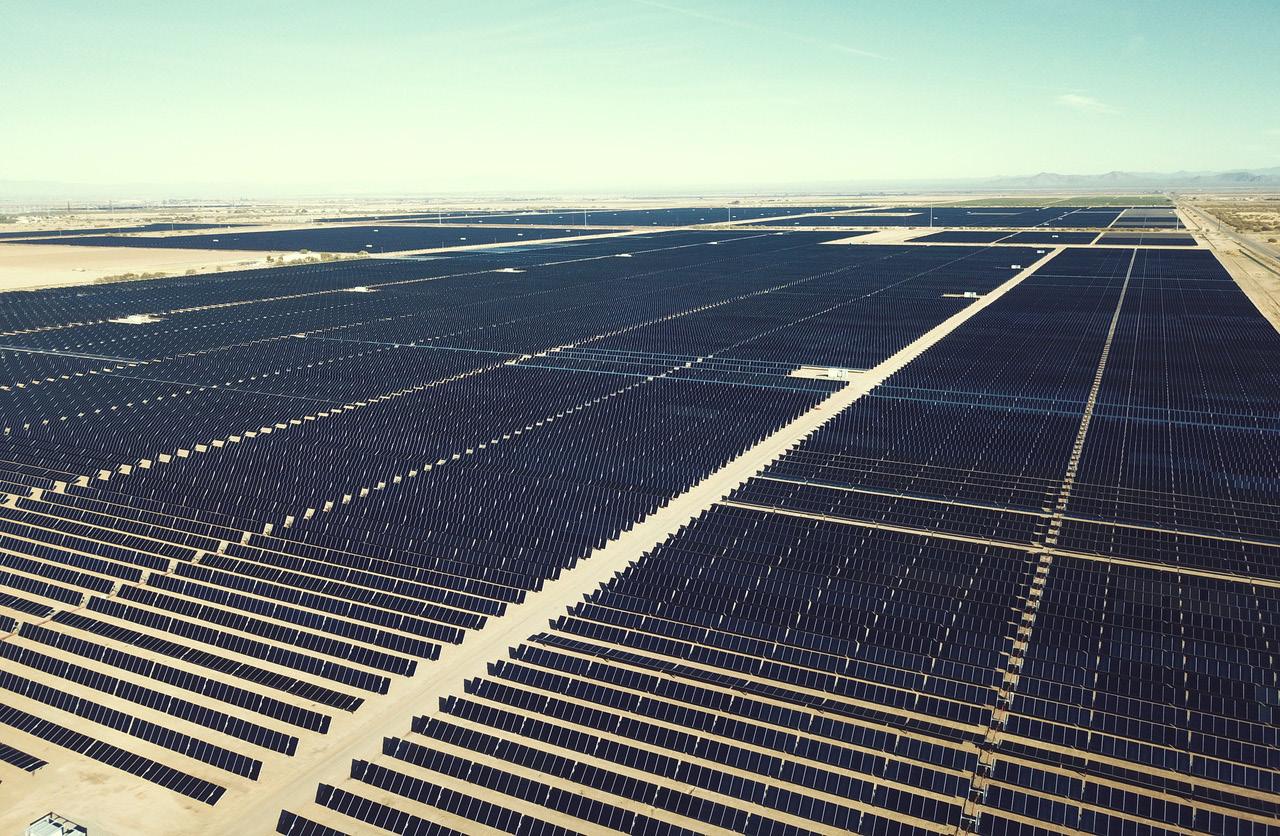
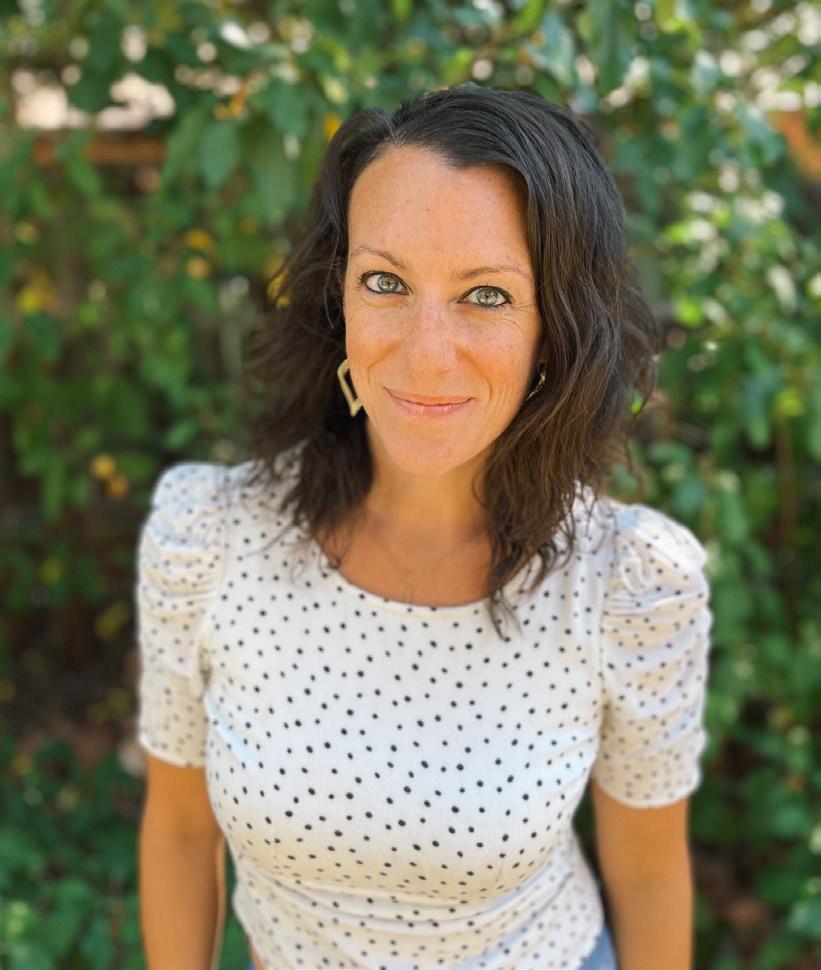
Kathleen Ventura, who owns Compost Crowd (a company that won three Green Living's Best Of Arizona awards this year), along with her husband Brock Delinski, has also won a Best Of Arizona award for Best Green Leader in Business. Through Compost Crowd, Ventura is proudly reclaiming water and using eco-friendly soap, optimizing collection routes for fuel efficiency, choosing used vehicles rather than brand new for operations, and partnering with a local farm striving for an organic certification. In addition to coowning the food-scraps collection service in Flagstaff and Sedona, she serves as the executive director of Sedona Recycles (the full-scale, nonprofit recycling facility in Sedona).
In her personal life, Ventura lives an intentional life aligned with her values of environmentalism and sustainability. For example, she enjoys cooking vegan meals and hosting themed dinner parties, camping in the backcountry or in her refurbished 1995 camper, walking 20,000 steps per day, and thrifting for gently used fashion items. She also grows a garden and fruit trees, recycles and composts at home, minimizes air travel, and insists on reusable items whenever and wherever possible. She says she is unapologetically one of “those people,” and she is honored to contribute positively to the community and to combat the overall climate crisis. www.compostcrowd.com
For the third year in a row, Phoenix Mayor Kate Gallego has won Green Living's award for Best "Green" Leader in Public Service. As part of her long-standing commitment to sustainability, Mayor Gallego has a number of recent green updates in the works.
As an example, the Phoenix Public Transit Department continues to work toward its goal of having a zero-emissions bus fleet by 2040. As a result, the department has put the first group of New Flyer Xcelsior Hybrid-Electric buses (with a range of more than 500 miles) on Phoenix roads.
Meanwhile, the city is working on a Shade Phoenix plan to guide investment in tree planting and manufactured shade installation. Artistic shade solutions will be implemented in parks across the city as part of a program called Sombra! (a winning project in a recent Bloomberg Philanthropies competition).

The Mayor’s office also has incentives for residents to switch to water efficient toilets and to cut outdoor water use with smart irrigation controllers. Residents can take the Mayor's Save Water Pledge to access additional resources, such as free home xeriscaping plans and information about native and drought-tolerant plants.
Finally, the City of Phoenix is installing chilled water stations (using new designs and heat-mitigating technologies) in high-pedestrian areas. www.phoenix.gov/mayor
Best Sustainably Minded Restaurant: True Food Kitchen
Best Vegetarian Or Vegan Restaurant: Macy’s Coffee House
Best Farmer's Market Or Natural Grocer: Uptown Farmers Market
Best Community Supported Agriculture Program: R.City
Best Smoothie Or Juice Joint: Kaleidoscope
Best Sustainable Winegrower: Oak Creek Vineyards
Best Sustainable Brewer: Sedona Beer Company
Best "Green" Realtor: Jan Green | Homesmart

Best Sustainable Interior Home Designer: Stephanie Ebner | Down2Earth Interior Design
Best Sustainable Home Builder: Desert Star Construction
Best Sustainable Architect: The Ranch Mine
Best Sustainable Landscape Or Landscape Design Company: Think Green-Design
Best Eco-Friendly Service For Your Home: Eco Mama Green Clean
Best Resort Health & Wellness Program: Civana Wellness Resort & Spa
Best Clean Beauty Or Personal Care Brand: Strawberry Hedgehog Soap Company
Best Alternative Wellness Practitioner Or Coach: Lauren Manzke | Light Of Grace Reiki
Best Arizona Day Trip Destination: Flagstaff
Best Electric Transportation Brand: Tesla
Best Solar Company: Verde Solar
Best Destination For Upcycled Goods: Buffalo Exchange
Best Natural Pet Store: Noble Beast Natural Market
Best Eco-Conscious Or Zero-Waste Store: Kaya Holistic
Best Sustainably Minded Nonprofit Organization: Desert Botanical Garden
Best Eco-Friendly Entertainment Event: Sedona Yoga Festival
Best Sustainability Curriculum: The Orme School
Best Eco-Friendly Small Business: Eco Mama Green Clean
Best Arizona Company Doing Good For The Planet (under 200 employees): R.City
Best Arizona Company Doing Good For The Planet (over 200 employees): Waste Management
Best “Green Leader” - Business: J.D. Hill | R.City
Best “Green” Leader - Public Service: Tom Torres, State Forrester, Arizona Department of Forestry And Fire Management
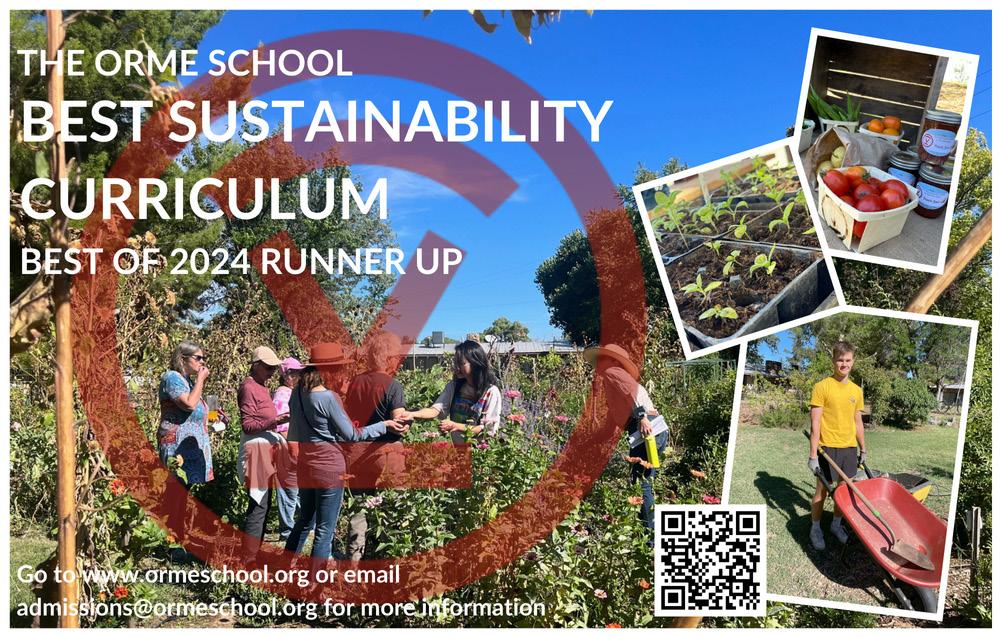
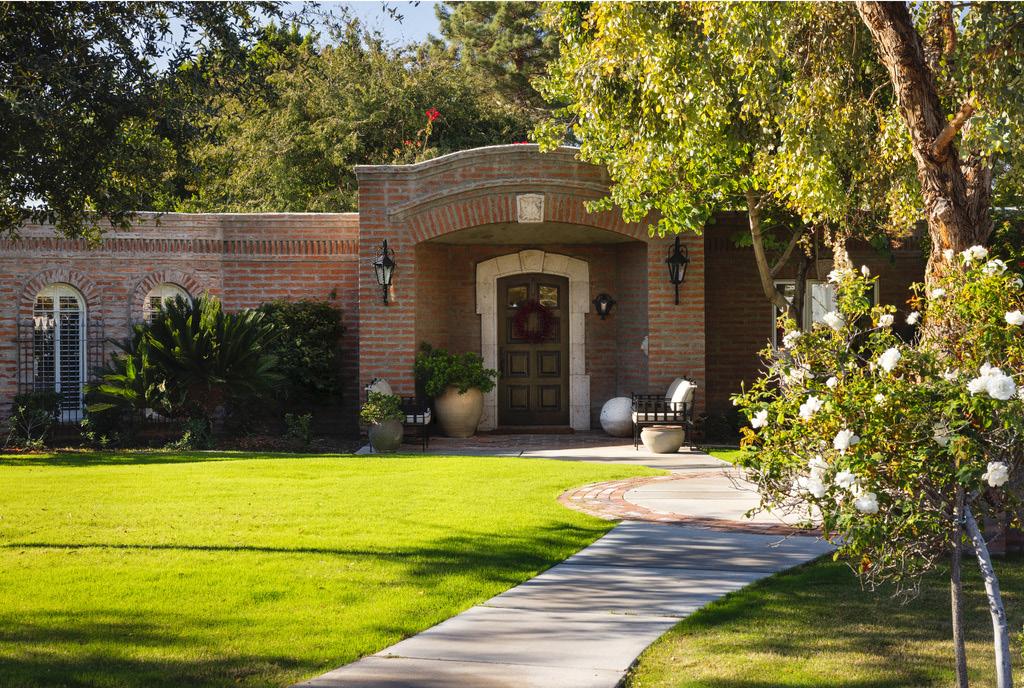
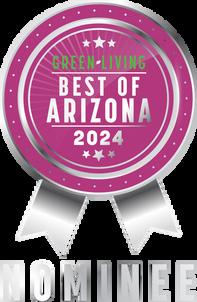




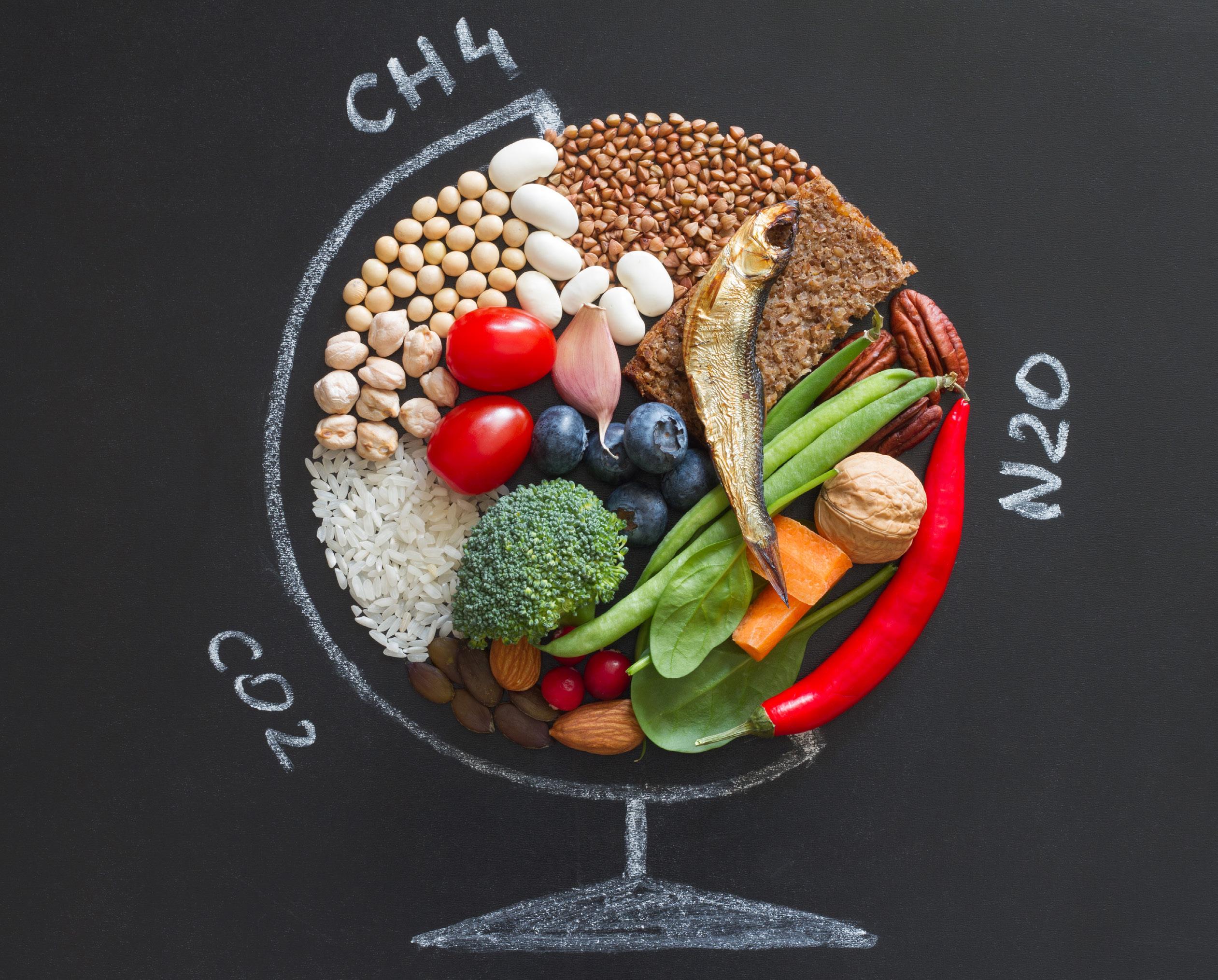
BY PAM DELANY
IImagine that the simple act of choosing what to cook for dinner could help combat climate change. According to the United Nations Climate Action Report, global food systems release approximately 30% of the world's total greenhouse gas (GHG) emissions. By taking a closer look at a single dinner recipe, we can uncover the hidden environmental costs of our meals and discover how minor adjustments in our kitchens can make a significant difference for the planet.
Each meal we consume carries an environmental price tag, known as its carbon footprint. This footprint measures the total GHG emissions produced throughout the food's lifecycle — from production and processing to transportation and disposal. These emissions, expressed as CO2 equivalent (CO2e), account for all GHGs like carbon dioxide, methane, and nitrous oxide, which contribute to climate change by trapping heat in the atmosphere. In addition to climate change, food systems impact water usage, land use, biodiversity loss, pollution, and waste generation.
Calculating a food's carbon footprint is a complex process due to the many factors that contribute to GHGs: raising or growing the food, processing, packaging, transporting, and waste. Some factors make a larger impact than others. As an example, beef that is raised, produced, and transported across the country has a relatively similar carbon footprint to locally raised beef because the majority of its carbon footprint comes from the emissions associated with raising the cattle. Transportation emissions for beef and other meats are relatively small in comparison. Because the emissions associated with
growing vegetables are much smaller, transportation emissions are weighted higher when calculating carbon footprint. My Emissions, an environmental impact assessment organization, provides a simplified and user-friendly calculator (www.myemissions.co/ resources/food-carbon-footprint-calculator/) that you can use to estimate your food’s carbon footprint.
What is an ideal food carbon footprint? To help people understand their ideal footprint, sustainability experts from My Emissions set the Fair Daily Food Emissions (FDFE) at 3,050 grams of CO2e (gCO2e) daily for each person. This FDFE would ensure global food justice while also reducing GHG emissions.
Our analysis begins with looking at a beef fajita dinner. Most fajita recipes contain meat, bell peppers, onions, flour tortillas, olive oil, and seasoning. Assuming you purchased beef that was produced and transported across the country, your beef fajitas would produce 5,591 gCO2e per serving, 83% higher than the FDFE of 3,050 gCO2e. Using local beef produced just 50 miles away lowers emissions by only 80 grams. Replacing beef with shrimp lowers the dinner’s carbon footprint to 1,956 gCO2e. Chicken decreases


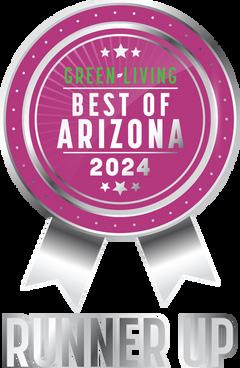

the recipe's footprint to 1,242, with vegetarian fajitas made with mushrooms or black beans reducing gCO2e to 676 and 621, respectively. Here are three additional ways to lower your food's carbon footprint.
Adopting a plant-forward diet that prioritizes eating plants is a powerful way to reduce your food's carbon footprint. If you are not ready for a vegetarian diet, consider a plant-forward approach by reducing your meat intake to a few days per week. Gradually integrate plant proteins such as beans, lentils, and tofu into your recipes. Vegetable proteins dramatically lower GHGs. For the lowest carbon footprint, increase your daily intake of produce, whole grains, and legumes until they make up most of your diet.
Buy locally sourced and seasonal foods, especially produce. Local produce requires less transportation, packaging, and storage, resulting in a lower carbon footprint. Produce picked at its peak ripeness is more nutrient-dense and flavorful. While the footprint of locally produced meat is similar to meat produced
elsewhere, you are supporting small sustainable producers and your local economy. Local First Arizona's Good Food Finder and The Arizona Farm Bureau's Fill Your Plate websites provide local food sources and seasonal produce guides.
Decomposing food waste in landfills produces methane, a GHG more potent than carbon at trapping heat in the atmosphere. Minimizing food waste lowers emissions and promotes more efficient use of resources. Simple steps like planning meals, freezing and storing food properly, and using leftovers can significantly improve footprint metrics. Additionally, composting organic waste instead of sending it to landfills further reduces GHG emissions.
It all adds up. Every meal choice is an opportunity to impact our planet positively. By focusing on the carbon footprint of our food, we directly contribute to a more sustainable future. Consider starting small with one recipe or researching a local food producer. Minor changes, by everyone, combine to make a great impact on improving climate change outcomes.


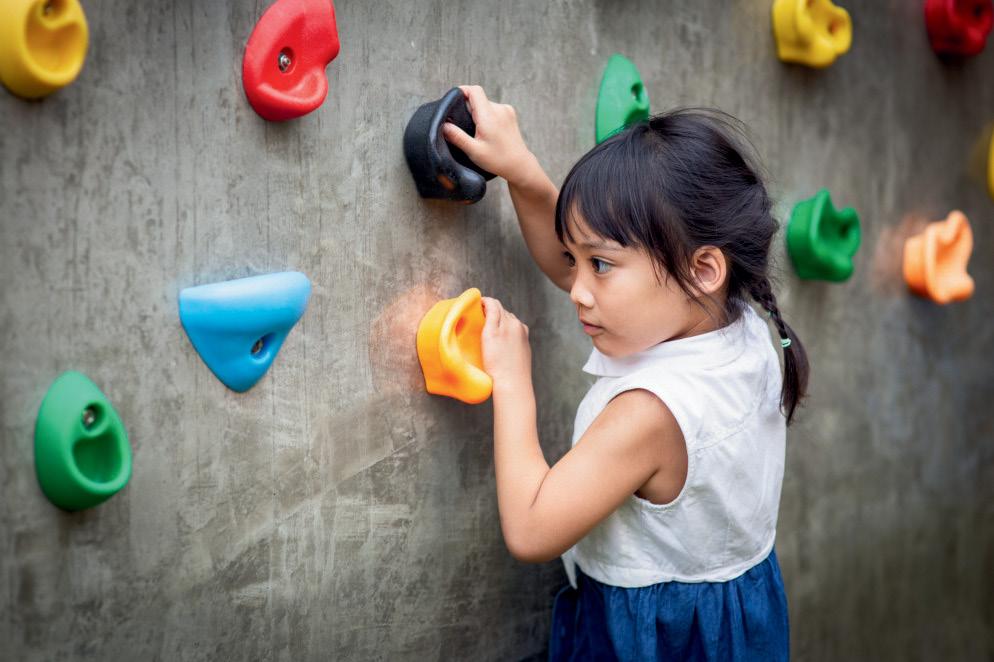



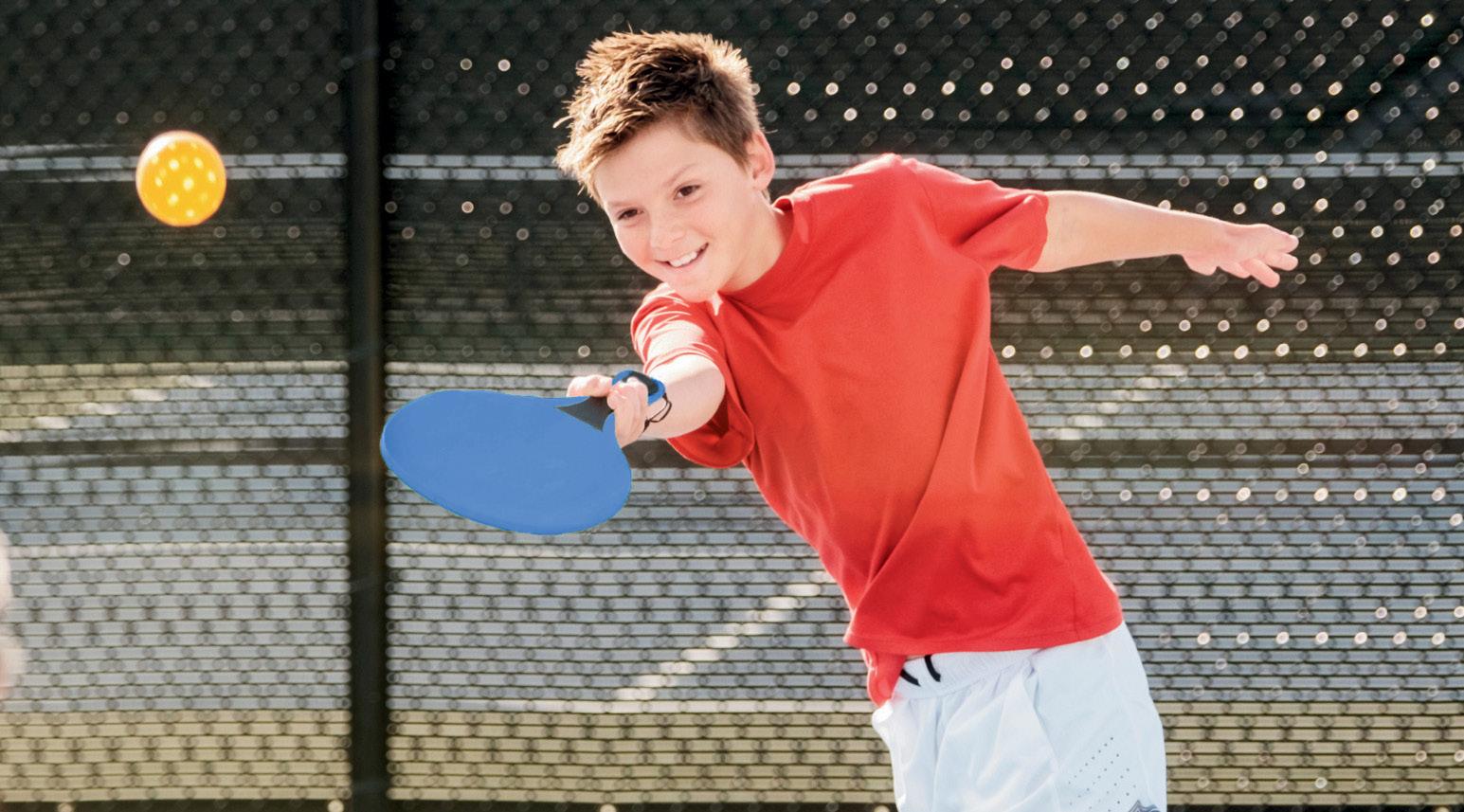
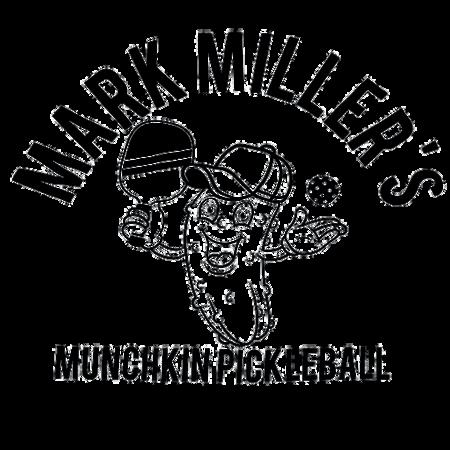



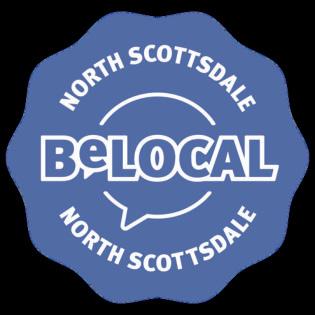

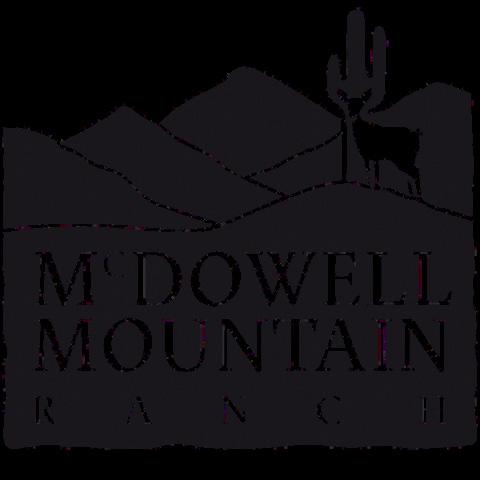

Ingredients
3/4 cup maple syrup
3/4 cup raw cacao powder
1/3 cup virgin coconut oil
1/8 tsp sea salt
Directions
Mix raw cacao with maple syrup, then add coconut oil and salt. Mix ingredients together by hand or in a blender until the ganache looks glossy. Dip fruit, cookies, or ingredients of your choice into the ganache or use it to top your favorite cake, ice cream, or yogurt. Keep ganache refrigerated for up to two to three weeks.
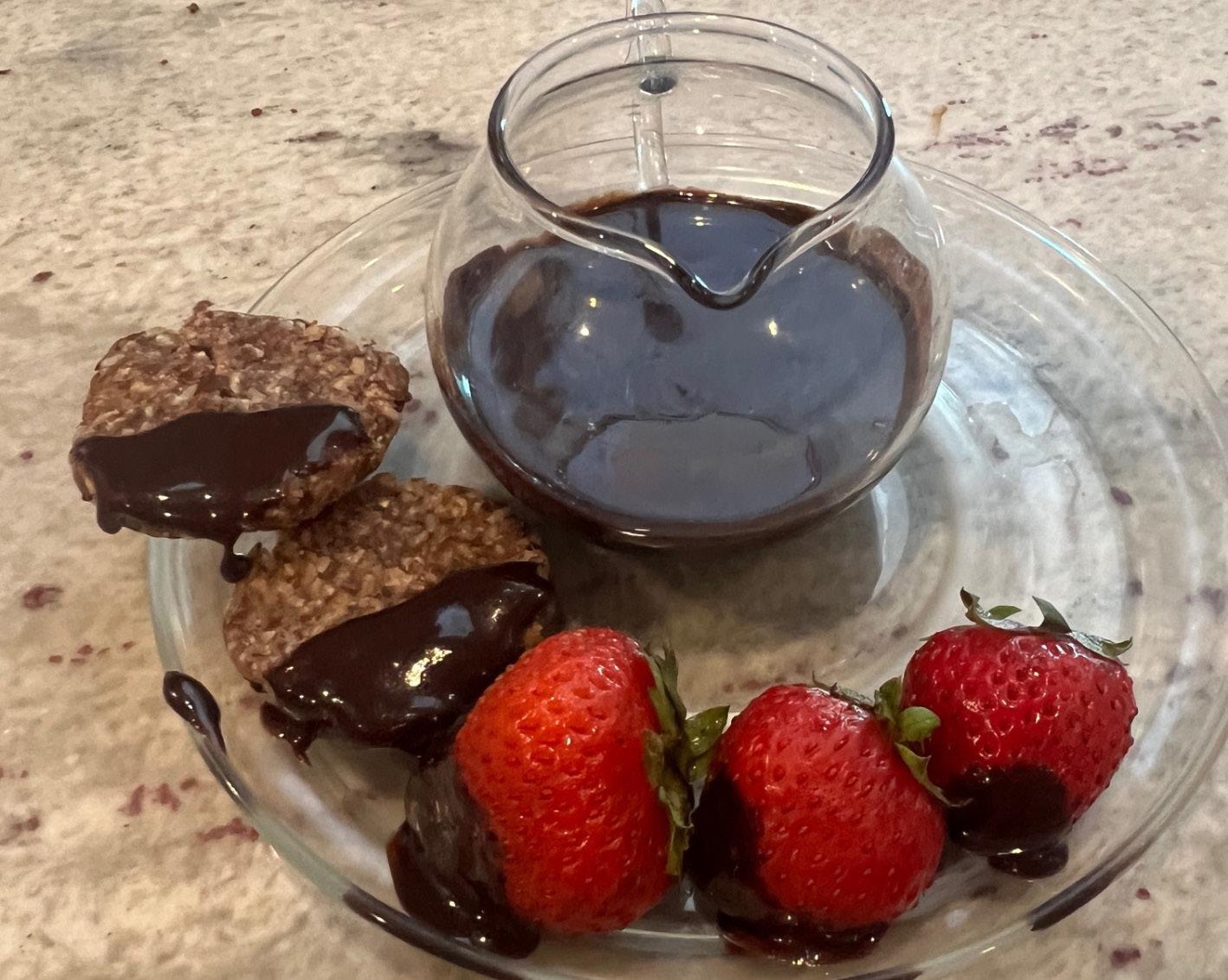
Ingredients
½ oz ROXX vodka
½ oz pumpkin spice flavored syrup
2 oz milk
1 oz cold brew concentrate

Directions
Combine all ingredients in a shaker filled with ice. Shake vigorously and strain in a chilled glass.
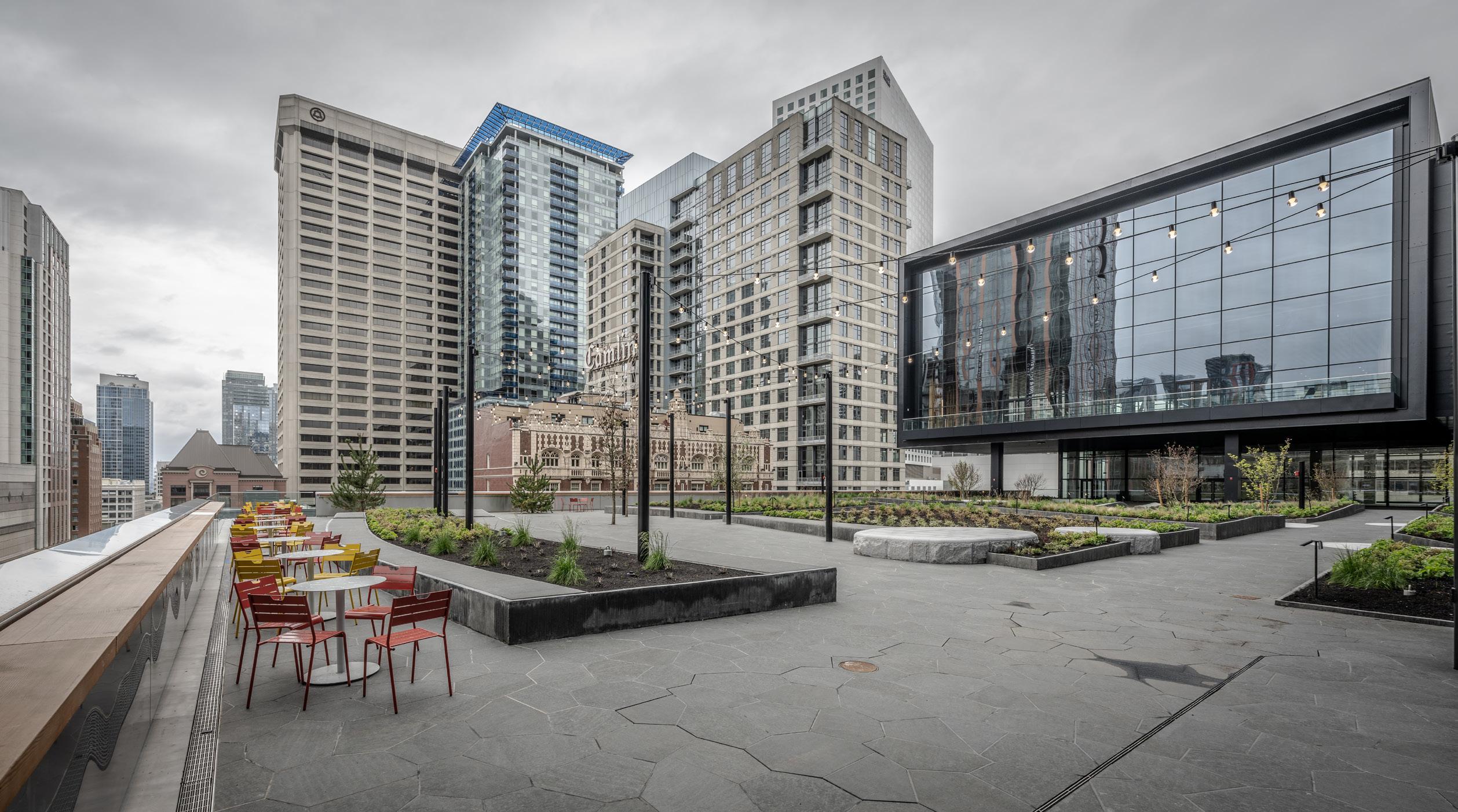
BY ANGELA FAIRHURST
NNestled between lush evergreen forests and the shimmering waters of Puget Sound, Seattle has long been a city that marries natural beauty with forward-thinking innovation. This unique blend has positioned Seattle at the forefront of the urban sustainability movement, earning it the distinction of being the only U.S. city selected to participate in the United Nations' Generation Restoration program.
From its early days as a lumber town to its status as a tech hub, Seattle has always embraced a pioneering spirit. Today, that spirit is channeled into creating a greener, more sustainable urban environment. The city's commitment to environmental stewardship isn't just a recent trend; it's woven into the very fabric of Seattle's identity, touching every aspect of urban life, from its skyline to its cuisine.
As you wander through Seattle's vibrant neighborhoods, you'll discover a city where sustainability isn't just a buzzword — it's a way of life. From the world's first net-zero carbon arena to restaurants serving up locally sourced, organic delights, Seattle is redefining Urban Living for the
21st Century, proving that a thriving metropolis can coexist harmoniously with the natural world that surrounds it.
My journey into Seattle's sustainable landscape began at The Maxwell Hotel, a pioneer in ecofriendly hospitality. As one of the first hotel brands to implement refillable in-room soap dispensers, The Maxwell Hotel has taken significant strides in reducing single-use plastics. The hotel has replaced traditional plastic water bottles with complimentary PATH refillable water bottles and installed Quench Water Bar refill stations offering various water options.
This initiative alone has diverted an impressive 500,000 singleuse plastic water bottles from landfills annually. The hotel's commitment to sustainability extends beyond guest amenities. With a goal to increase waste diversion to 30-50% by the end of the year, The Maxwell Hotel has launched a comprehensive waste diversion training program for its team members.
No visit to Seattle is complete without a trip to the iconic Pike Place Market and I was lucky enough to experience it through the lens of sustainability with Chef Traci Calderon. As we wound through the bustling market, Chef Traci shared the history and secrets of this 115-year-old institution and introduced me to vendors committed to sustainable practices.

My tour culminated in the Atrium Kitchen, where Chef Traci lead an interactive cooking demonstration using the seasonal, locally sourced ingredients we procured. The experience was more than just a culinary delight; it was a lesson in the importance
of supporting local producers and reducing food miles. During the demonstration, we were joined by representatives from Pike Place Fish, who discussed their commitment to sustainable sourcing — a crucial aspect of preserving marine ecosystems.

Seattle's commitment to sustainability extends to its green spaces, as I discovered during a hike through Discovery Park. Led by Park Environmental Educator Giovannina and Restoration and Natural Resource Specialist Eric, our group traversed the Wolf Tree Trail, learning about the park's history, protection efforts, and preservation strategies.
As we walked, Giovannina and Eric pointed out hidden gems along the trail, explaining how the park serves as a crucial green lung for the city. They highlight Seattle's designation as a participant in The United Nations' Generation Restoration program — the only U.S. city selected. This initiative allows Seattle to share best practices in urban habitat restoration with 18 other
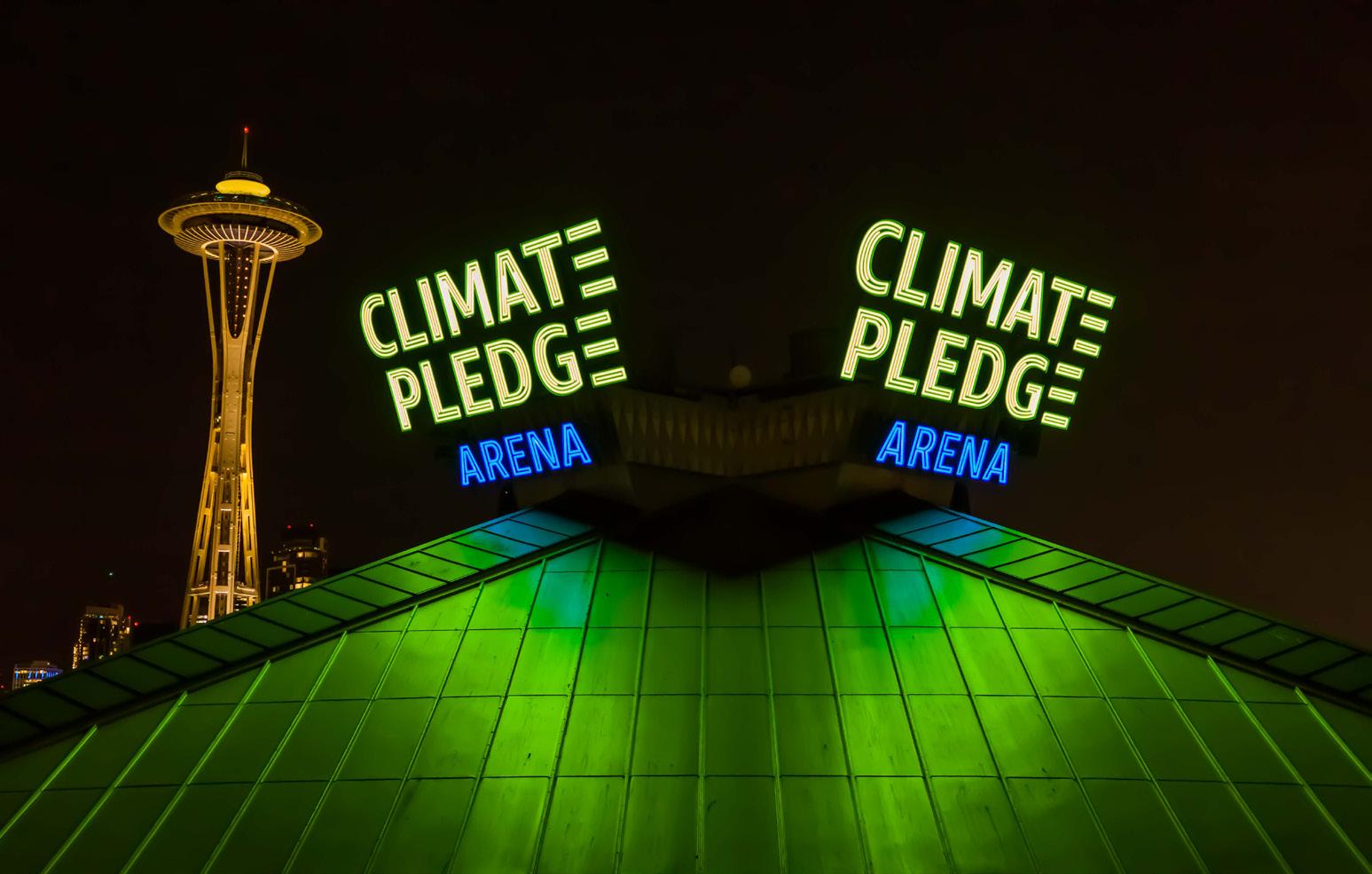
cities worldwide, showcasing programs like the Green Seattle Partnership.
My exploration of Seattle's sustainable side took an unexpected turn at Footprint Wine Tap. This innovative establishment is redefining the wine industry's approach to sustainability. Owner and winemaker Ken Dillon explained how their use of alternative wine packaging significantly reduces their carbon footprint. From sourcing practices to waste management, every aspect of their operation is designed with sustainability in mind.
The experience deepened as Heather Bradshaw from the Washington State Wine Commission joined us to discuss Sustainable WA, the state's first certified sustainability program for vineyards. Marissa Dineen, owner and vintner of Dineen Vineyards, added her perspective, sharing how these practices are implemented in her family-owned vineyard in the Lower Yakima Valley.
As I sipped on a variety of locally produced, sustainably made wines, I was struck by how Seattle's commitment to sustainability extends even to its leisure activities. It's a testament to the city's holistic approach to environmental stewardship.
Seattle's sustainable ethos is perhaps most visible in its
newest architectural marvels. A tour of the Seattle Convention Center's Summit building reveals a structure at the forefront of sustainable design. The LEED Platinum-certified building boasts an impressive array of green features, from its 14,000 sq. ft. Garden Terrace that reduces the urban heat island effect to its innovative rainwater harvesting system.
The building's waste diversion rate of 78% places it in the top 5% of businesses nationwide. From compostable utensils to food waste dehydrators that produce fertilizer, every aspect of the building's operation is designed to minimize environmental impact. Even the building's aesthetics serve a sustainable purpose, with light sensors utilizing "daylight harvesting" to reduce energy consumption.
Equally impressive is Climate Pledge Arena, the world's first projected net-zero-carbon certified arena. A tour of the facility showcases how sustainability can be integrated into even the most energy-intensive structures. The arena's 15,000-gallon rainwater cistern provides water for the ice surface, and the incorporation of over 12,000 plants and trees demonstrates how green design can enhance rather than compromise functionality.
Established in 1897, Filson has long been a favorite among outdoor enthusiasts. However, as I learned from Niel Morgan, VP of Special Projects & Partnerships, the company is now at the forefront of sustainable fashion with its Filson Unfailing program.
This initiative focuses on creating durable, longlasting products that reduce the need for frequent replacements — a refreshing contrast to the fast fashion trend. It's a reminder that sustainability isn't just about using eco-friendly materials; it’s also about changing our consumption patterns.
I was able to learn more about Seattle's waterfront sustainability initiatives through a tour with Alki Kayak Tours. As we paddled through Puget Sound,










guides from The Port of Seattle discussed their initiatives for shore power for cruise vessels, beach shore restoration, and waterway cleanup efforts. It's a hands-on lesson in the importance of preserving marine ecosystems in urban environments. The tour is complemented by a visit to the Seattle Aquarium's Ocean Pavilion. The aquarium's vision to become a "regenerative aquarium" — one that produces more environmental benefits than harm — is evident in every aspect of the new pavilion's design. From its LEED Gold certification to its Zero Carbon Certification target, the building is a model of sustainable architecture. Its 100% fossil fuel-free operation and ability to recirculate 96% of the saltwater in its habitats demonstrate how large-scale attractions can minimize their environmental impact.

My Seattle sustainability journey came full circle with a foraging experience led by Angela Shen, owner of Savor the Wild Tours. As we trekked through the woods just north of Seattle in search of wild mushrooms, Angela shared her expertise in finding,
collecting, and preparing these woodland delicacies. This experience not only connected us directly with nature but also highlighted the importance of understanding and respecting local ecosystems.
As I reflect on my journey through Seattle's sustainable landscape, I'm struck by the city's comprehensive approach to environmental stewardship. From its hotels and restaurants to its architecture and outdoor spaces, Seattle has woven sustainability into every aspect of urban life. It's a model that other cities would do well to emulate, proving that urban development and environmental protection can go hand in hand.
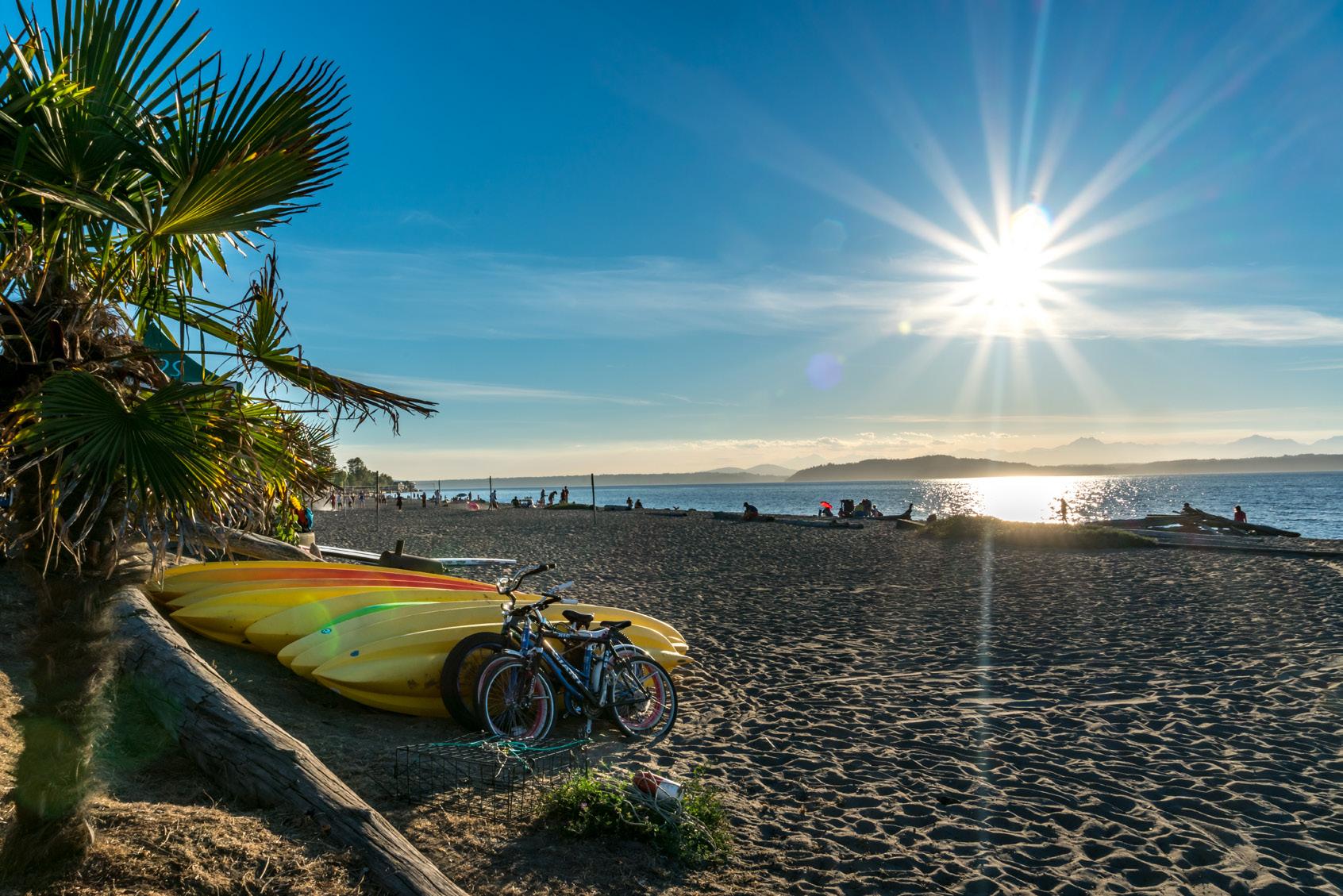
Seattle's journey toward sustainability is far from over. With ambitious goals like transitioning all cityowned buildings to renewable energy by 2035 and requiring all cruise vessels to be shore power capable by 2027, the city continues to push the boundaries of what's possible in urban sustainability. As I leave Seattle, I carry with me not just memories of a beautiful city but inspiration for a more sustainable future.

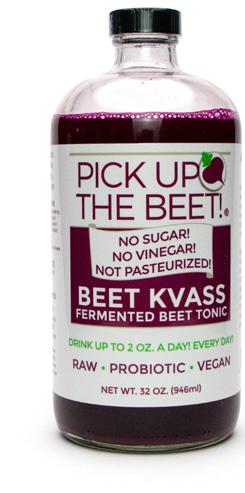
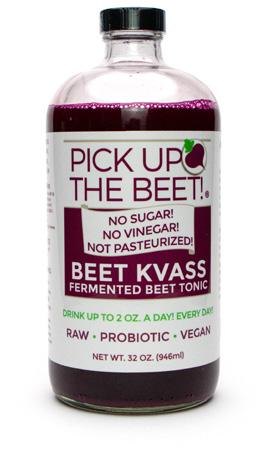

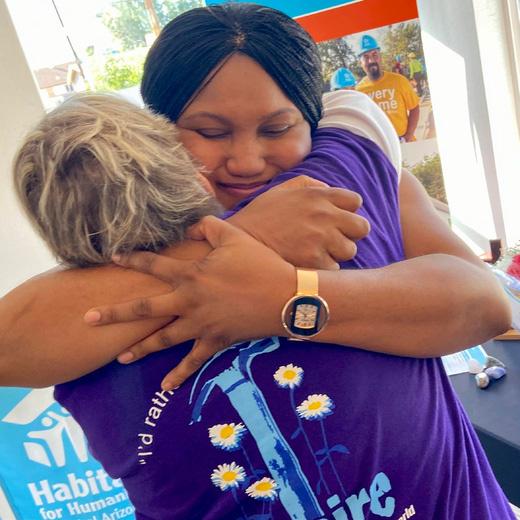


BY JENNIFER & JOHN BURKHART
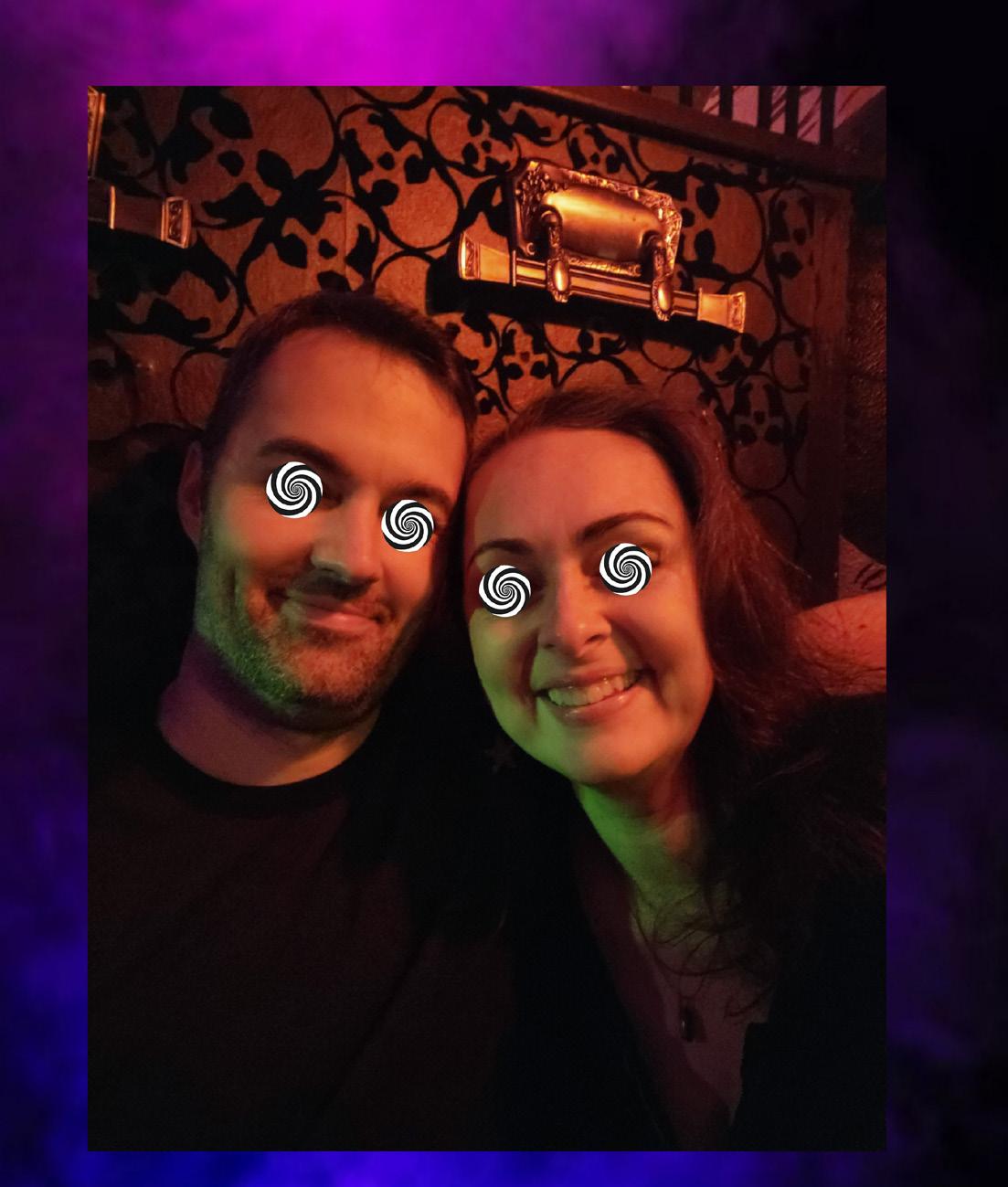
He Said: We got hypnotized this month, and I was feeling sleepy — very, veerrry sleepy. No, I didn't wake up with a trigger word that turned me into a deadly assassin or believing I was a 6'2” chicken... at least, I don't think I did. Bawk bawk? This was supposed to be therapeutic hypnosis, which is great for helping with things like anxiety and pain management. It can also assist someone in achieving behavioral changes, since it allows for a deeper exploration of the subconscious mind. My therapist was a nice lady with a soothingly calm voice. She decided to host this hypnosis session over Zoom, which was my first red flag. So here I was, using my phone, which is probably the source of half my anxiety, trying to get hypnotized to be less anxious. Palm slaps face, right? She was 10 minutes late to the hour-long call and couldn't get her music to work. My stress levels were rising. I spent the next 5 minutes telling this perfect stranger all my subconscious shortcomings and then laid down on my couch and closed my eyes. Now, you need to understand, I go to work at 4 a.m. every morning, and it’s three in the afternoon — the perfect time for a nap. I remember a nice bedtime story about golden light, shackles falling off, and flying like an eagle. Then I remember her having to raise her voice to wake me up. Hypnotism has potential, but I don't recommend doing it in this format. Do it in person, get a good night’s sleep, and leave your phone at home.
It's officially fall. Hooray! We love this season and all the fun things that go with it. Cooler weather, colorchanging leaves, pumpkin spice lattes (Love it? Hate it? It's here!) ... but also Halloween! We also love the “spooky” season and wondered what self-care activity would be appropriate. Why, hypnosis, of course! Not the “sideshow magician dangling a pocket watch” kind of hypnosis, but hypnotherapy — a therapeutic practice that helps people attain a calm state of heightened suggestibility. To complete our task, we opted for virtual hypnotherapy sessions through Zoom.
She Said: I found a cozy, quiet place in my home (my bed) and set my phone on my nightstand with our Zoom session open. After a brief hello, I got comfortable and closed my eyes. Word of advice: set up your spot well before a session starts. I realized far too late that I hated the fan being on because my feet got cold, but I didn't want to move and ruin my zen state! When the session started, it was quite the challenge to calm my thoughts. Being at home meant that my brain was doing the mental gymnastics it always does when running a household. Thankfully, the calm arrived quickly as the therapist skillfully focused my mind on relaxing each area of my body and taking me through slow breathing exercises. I was soon in a motionless state, teetering on the edge of sleep. I did have to startle myself awake a couple times. Hopefully my subconscious was paying attention because I have no idea what she said in those snoozy moments! I do remember that she said the word “relax” about a thousand times, to the point that it became slightly distracting. Aside from relaxation, I asked the therapist to help me with increasing discipline to better reach my goals, so there were words of encouragement in the session, as well. All too soon, we were done, and it was time to return to reality. I had my reservations about receiving a virtual therapy session. Most of us have experienced bad connections with frozen faces, dropped words, or robot-sounding voices. How can that possibly work with trying to relax? Sure, the scheduling was easy; I didn't have to drive anywhere, and I had the comfort of my own bed. However, technology did get in the way. At one point, the therapist stopped talking. I had to rouse myself to look at my phone, just to see her lips moving but no sound coming out. I didn't want to disturb the mood even more, so I didn't say anything, and luckily, her voice came through shortly after. Overall, this felt like a meditation of sorts. It was great to chill out for 40 minutes or so, but I don't feel that one session was enough for me to invoke any lasting changes. Next time, I would absolutely prefer in-person for fewer distractions to encourage a deeper experience.






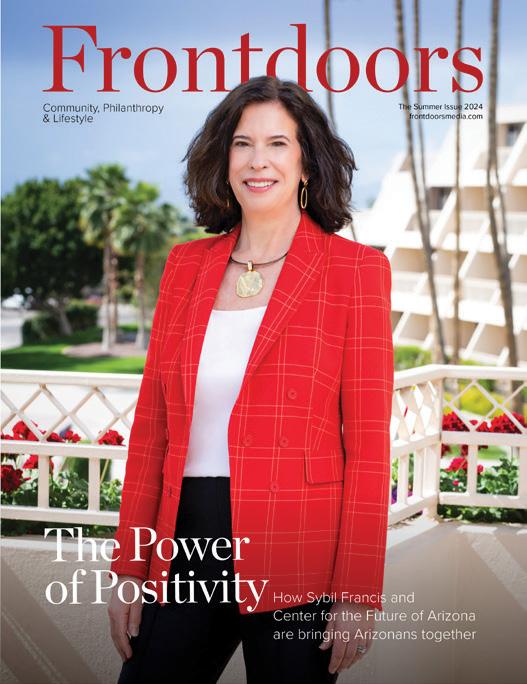

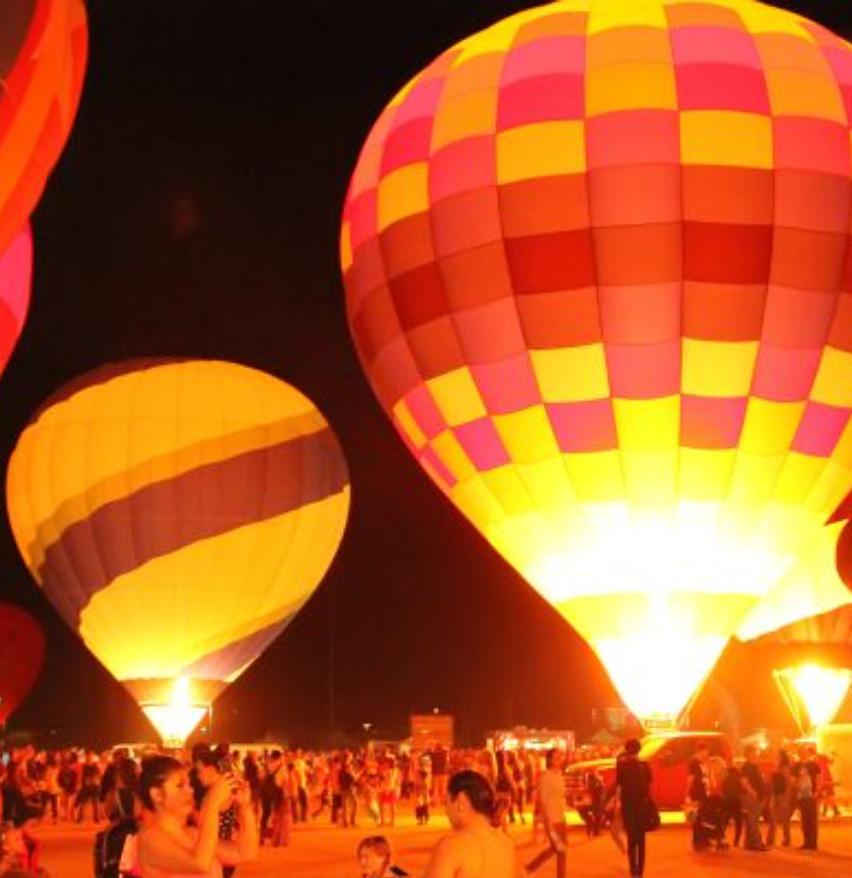
October 5
25th Annual Mariachi and Folklórico Festival
Celebrate Hispanic Heritage Month with this Chandler tradition! Featuring Leyendas Del Mariachi, experience a rare gathering of legendary musicians from renowned groups like Mariachi Vargas de Tecalitlán and Mariachi Los Camperos. Enjoy vibrant music and dance performances, including Ballet Folklórico QuetzalliAZ. Time: 7:00 p.m. Location: Steena Murray Mainstage. Tickets: $48-$88 (VIP option includes reception, tequila tasting, and meet-and-greet). 250 N. Arizona Ave., Chandler.
Join the Desert Botanical Garden's botanical book club featuring photographer Claire Takacs and landscape architect Giacomo Guzzon. They'll present their new book, "Visionary: Gardens and Landscapes for Our Future," showcasing innovative gardens addressing climate change. The event highlights drought-resistant planting, including Phoenix examples. Time: 10 a.m. Price: Members $14.95, General Admission $29.95. Desert Botanical Garden 1201 N. Galvin Parkway, Phoenix.
October 25-27
Spooktacular Hot Air Balloon Festival
Experience a unique Halloween celebration with over 20 glowing hot air balloons doubling as trick-or-treat stations, distributing 4,000+ pounds of candy. Enjoy a free Kids Zone with 30+ inflatables and a thrilling Spook Trail. Tethered balloon rides are also available for an extra cost. Browse the Spooktacular Marketplace for local arts and crafts and savor treats from food vendors. Fireworks on Friday and Saturday nights. A family-friendly event for all ages. General Admission: $22 adults, $17 kids 12 and under.
Salt River Fields at Talking Stick 7555 N. Pima Rd., Scottsdale.
12
Phoenix Indian Center Gourd Dance & Social Powwow
Celebrate Indigenous culture at this free outdoor event at Steele Indian School Park. Enjoy traditional dances, music, and market vendors for a vibrant celebration of Native American heritage. Schedule: Vendor Market from 11 a.m. - 7 p.m., Gourd Dances at 11 a.m. and 5 p.m. and Grand Entry at 1 p.m. & 7 p.m. This is a drug- and alcohol-free event and open to the entire community. Steele Indian School Park 300 E. Indian School Rd,, Phoenix.
Phoenix Greek Festival
Celebrate 63 years of Greek culture at this beloved annual event. Savor authentic cuisine like roasted lemon chicken, gyros, and baklava sundaes. Enjoy imported Greek beers, wines, and ouzo flights. Experience hourly dance performances and live music. Browse the "Agora" marketplace for Greek imports. Kid-zone available. A lively "OPA!" atmosphere for the whole family. Adults $5, children 12 and under are free. Friday 3-10 p.m., Saturday 11 a.m. - 10 p.m., Sunday 11 a.m. - 6 p.m. Holy Trinity Greek Orthodox Cathedral 1973 E. Maryland Ave., Phoenix.
Eternamente: Día de los Muertos Spectacular
Immerse yourself in Mexican culture with Mariachi Garibaldi de Jaime Cuéllar and Ballet Folklorico del Rio Grande. This vibrant spectacle features traditional music, dance, and storytelling, honoring legendary Mexican singers. Experience the beauty of remembrance through graceful performances and stunning costumes. Don't miss the family altars in the Sculpture Garden before the show and Tequila Tasting Afterglow. Food trucks will be available from 4-7 p.m. Tickets from $29, youth $10. Jim & Linda Lee Performing Arts Center at Yavapai College, 1100 E. Sheldon St,, Prescott.
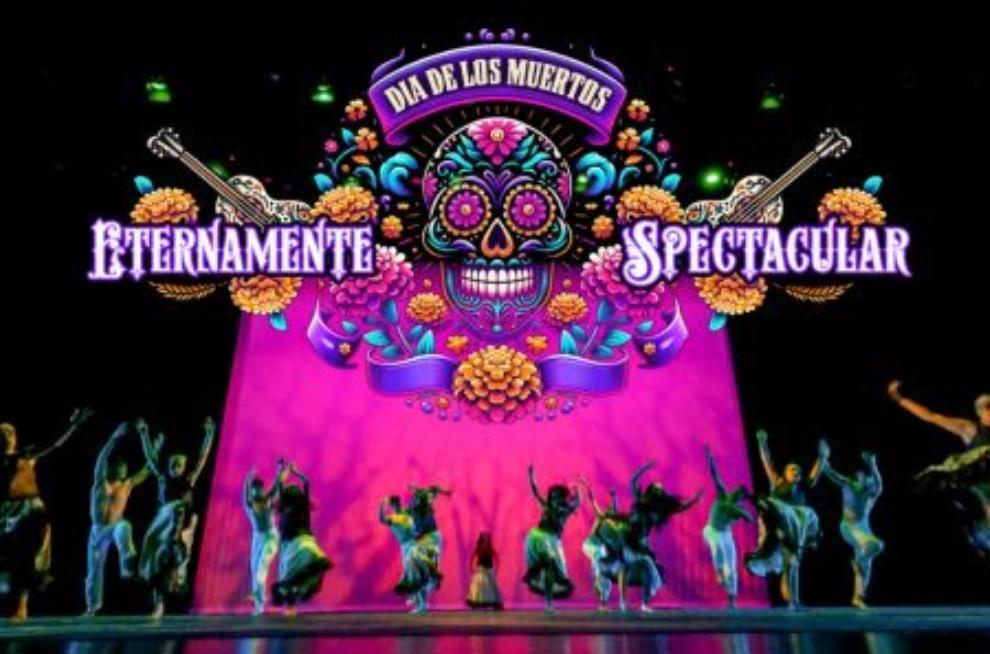
The 34th annual Sedona Arts Festival, the area's oldest and largest arts event, showcases over 100 national artists against the stunning backdrop of Sedona's red rocks. This two-day extravaganza features Gourmet Row, live music, raffle prizes, food trucks, and a beer and wine garden. Saturday 9 a.m. - 5 p.m., Sunday 10 a.m. - 4 p.m. $15 weekend admission (12 and under are free) covers both days. Proceeds support local arts education. Sorry, no pets are allowed. Sedona Red Rock High School, 995 Upper Red Rock Loop Road, Sedona.
19, 26 | Nov 23, 30
Design and carve your own ceramic bell! Experience the unique silt-cast bell-making process at Arcosanti, a prototype microcity blending architecture and ecology. This hands-on workshop guides you through forming and carving your own ceramic windbell. The day-long event includes an introductory tour, bell-making sessions, and lunch. Your finished bell will be fired and shipped to you. Cost $195 + $20 shipping. Get ready to get your hands dirty! Arcosanti, 13555 S. Cross L Rd, Arcosanti.
October 5-6, 12-13, 19-20, 26-27
Experience autumn's bounty at two locations. The Farm offers a 12.5-acre corn maze ($10 ages 12+, $8 ages 3-11), hayrides, a pumpkin patch, and sunflower picking. Open 9 a.m. - 4 p.m. daily. The Orchard serves weekend pumpkin pancake breakfasts (9-10:30 a.m.) and apple cider donuts. Enjoy pumpkin treats and Orchard Grill's applewood-smoked burgers (11:30 a.m. - 3 p.m.). Perfect for families seeking farm-fresh fun and fall activities. Both located in Wilcox, The Farm Corn Maze is located at 6405 W. Williams Road, while The Orchard is located at 2081 W. Hardy Road.

Experience the charm of Southeast Arizona at Patagonia's annual Fall Festival. This free event showcases over 120 artisans, food vendors, and exhibitors in the picturesque Town Park. Enjoy live music, family activities, and local culinary delights. Browse unique crafts, participate in the SOUTH 33 KidsZone, and explore nearby wineries. Saturday 9 a.m. - 5 p.m. and Sunday 10 a.m. - 4 p.m. A celebration of regional art, music, and community in the beautiful Sky Islands. Leashed dogs are welcome. Patagonia Town Park, 325 McKeown Ave., Patagonia.
Tucson's premier charity run welcomes all ages, abilities, and bodies. Choose from a half marathon, four-mile, or family/kids' one-mile event. Routes showcase A-Mountain and Santa Cruz Riverpath. Start/finish at Mercado San Agustin Annex. Post-race festivities include live music, a beer garden, and an after-party. Prize money for top runners. A celebration of community and fitness for runners, walkers, joggers, and chair athletes. Registration $0-$90. 267 S. Avenida Del Convento, Tucson.
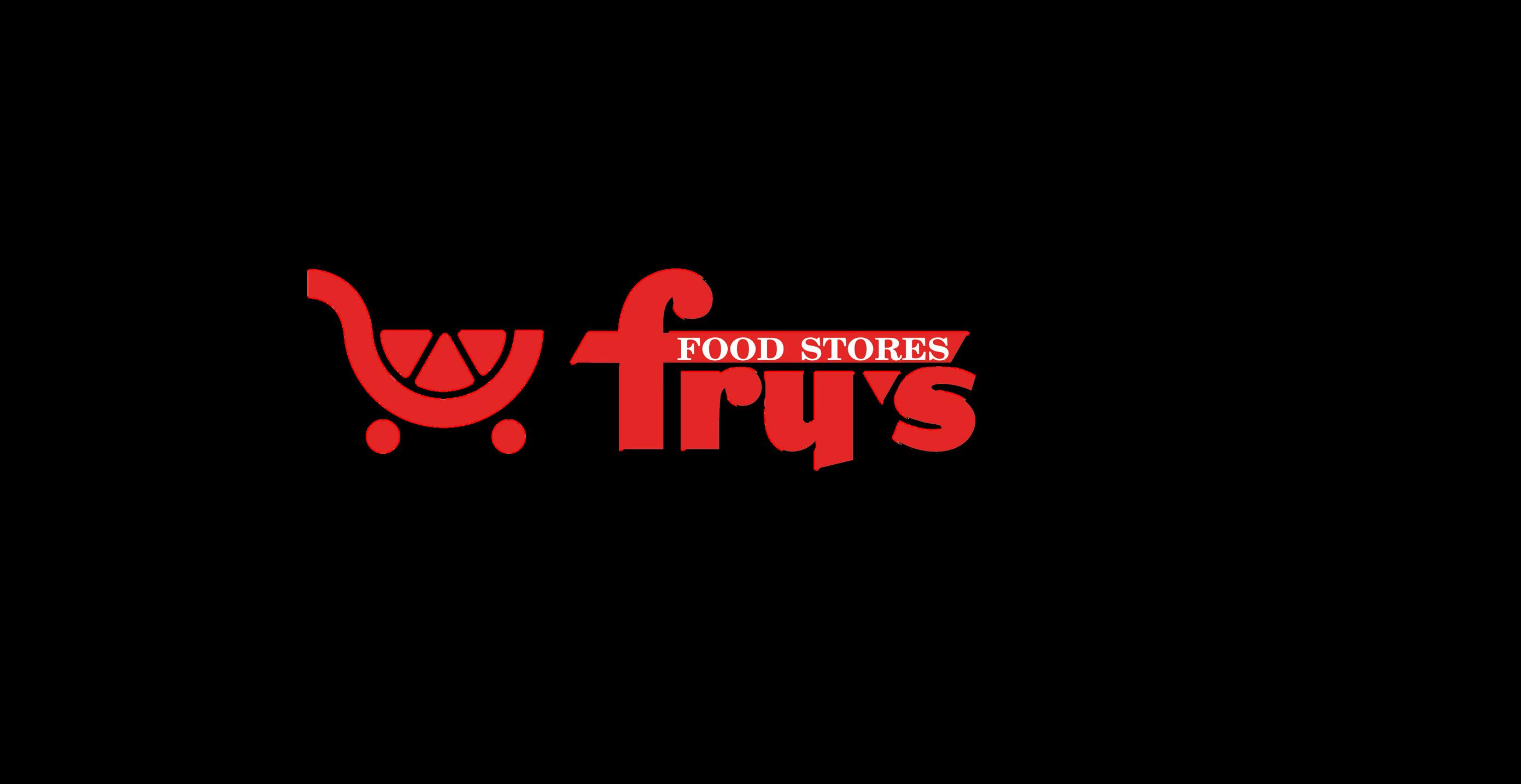
When you shop at Fry’s Food Stores, you support our mission to end hunger and eliminate waste
In 2023, Fry's donated more than 16 million meals and diverted more than 103 million pounds of waste from landfills
Thank you for shopping at Fry’s and supporting our communities!




Courtesy Automotive Group has an impressive selection of electric vehicles (EVs)! With an emphasis on cuttingedge technology and eco-friendly design, our EV selection showcases the latest advancements in automotive innovation. Courtesy specializes in EVs by Chevrolet, Nissan, Polestar, Jeep, Kia and Volvo. From sleek sedans to versatile SUVs, each vehicle offers not only zero-emission driving but also top-tier performance and advanced safety features.
Whether you’re a seasoned EV enthusiast or considering your first electric ride, Courtesy Automotive Group is dedicated to helping you find the perfect vehicle to fit your lifestyle!




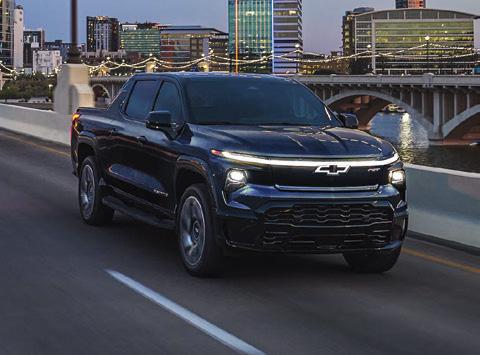



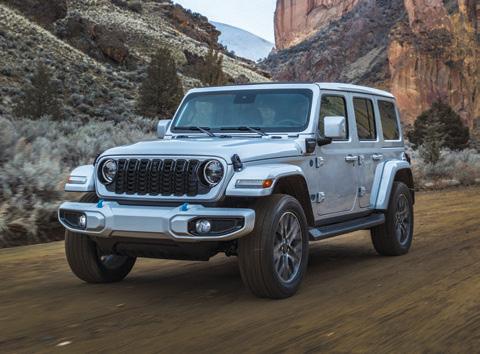
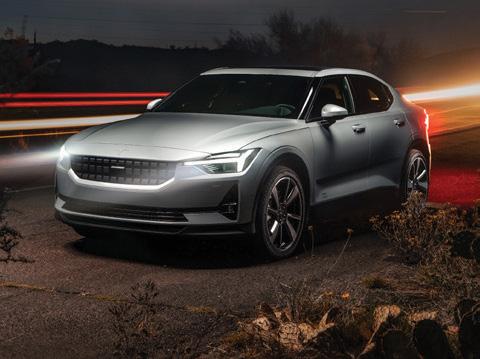
October 14th 5PM - 9PM

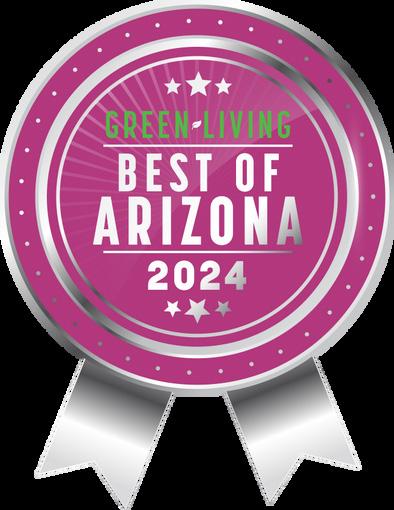




The markets are inherently volatile. It’s in their nature, whether in response to world events, rising inflation, or a change in interest rates. But sometimes that volatility can work to your advantage.
Reviewing your investment strategy and altering it, if necessary, can help you weather economic uncertainty and keep you on track to achieving your objectives.
Contact us today. We can help keep your goals in focus, no matter what mood the markets are in.
The Ewing-Morales Group of Wells Fargo Advisors
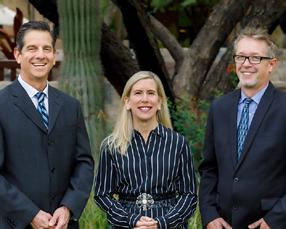
18700 N. Hayden Road Suite 525 Scottsdale , AZ 85255
Direct: (480) 419-2016
mark.morales@wellsfargoadvisors.com https://home.wellsfargoadvisors.com/mark. morales CA Insurance # 0D34255
























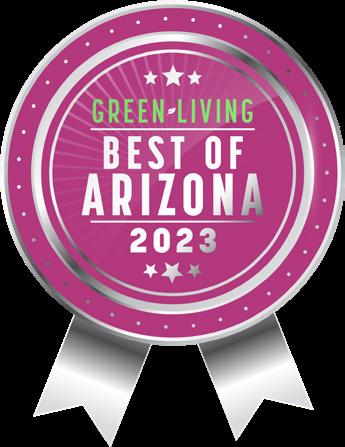
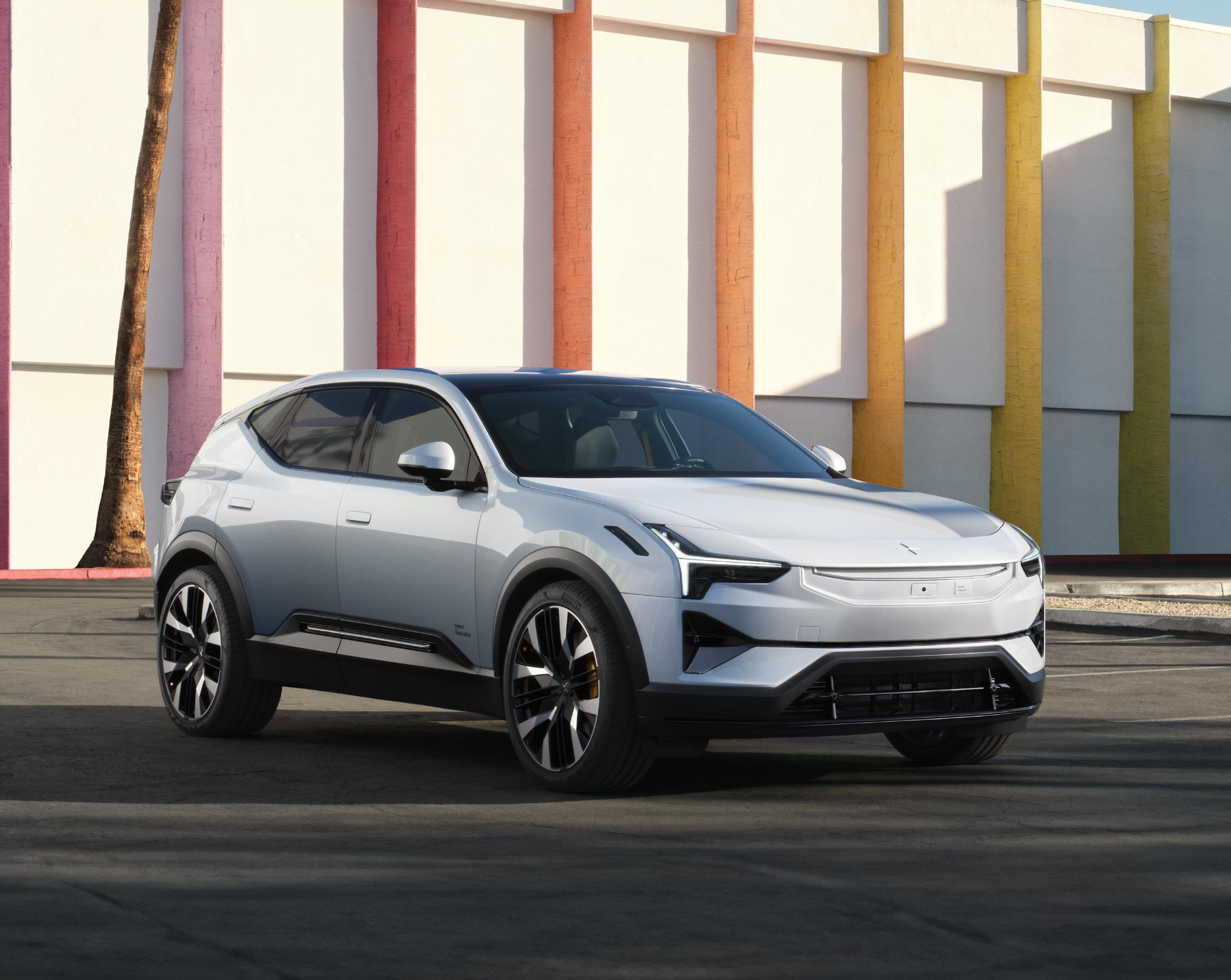
Polestar 3
The SUV that drives like a sports car
With up to 315 miles of range and 517 horsepower, Polestar 3 is defining electric performance.* The only way to fully experience that, is a test drive. Visit our Scottsdale space and get behind the wheel of Polestar 3 today.
Also available to view: Polestar 4, an innovative SUV coupé that offers the exhilarating driving experience Polestar is known for. And don’t miss the special offers on Polestar 2, the driver’s EV.